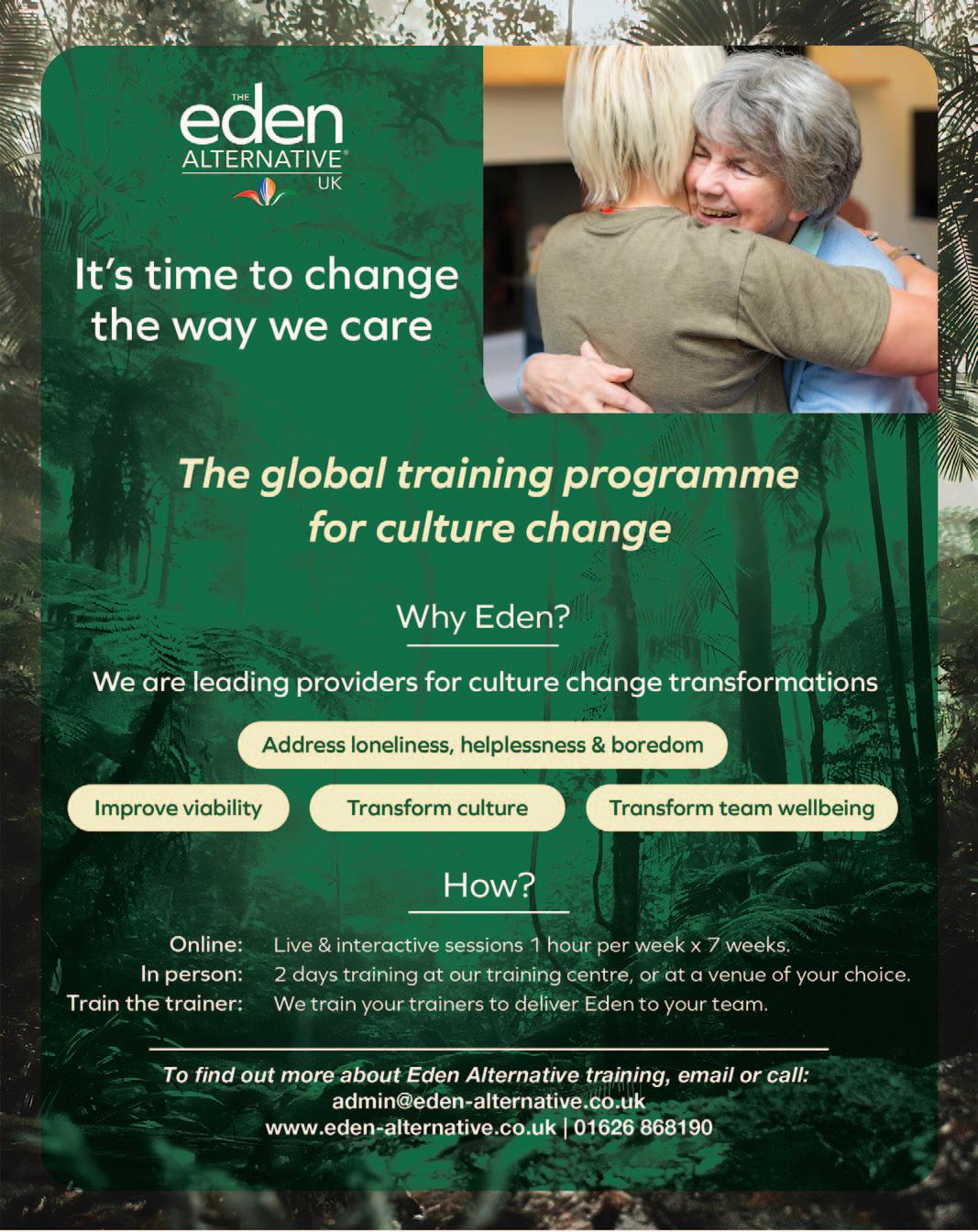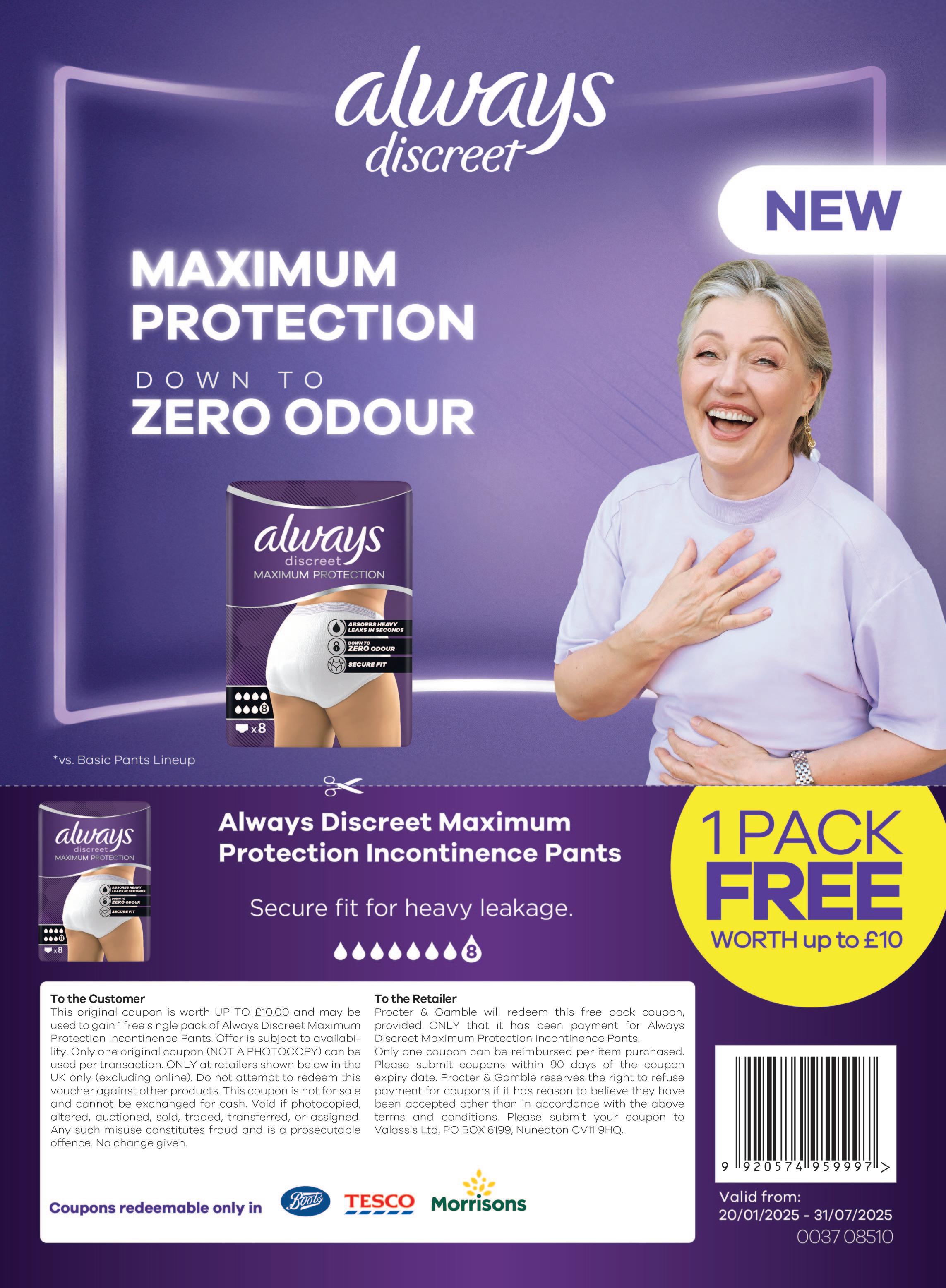















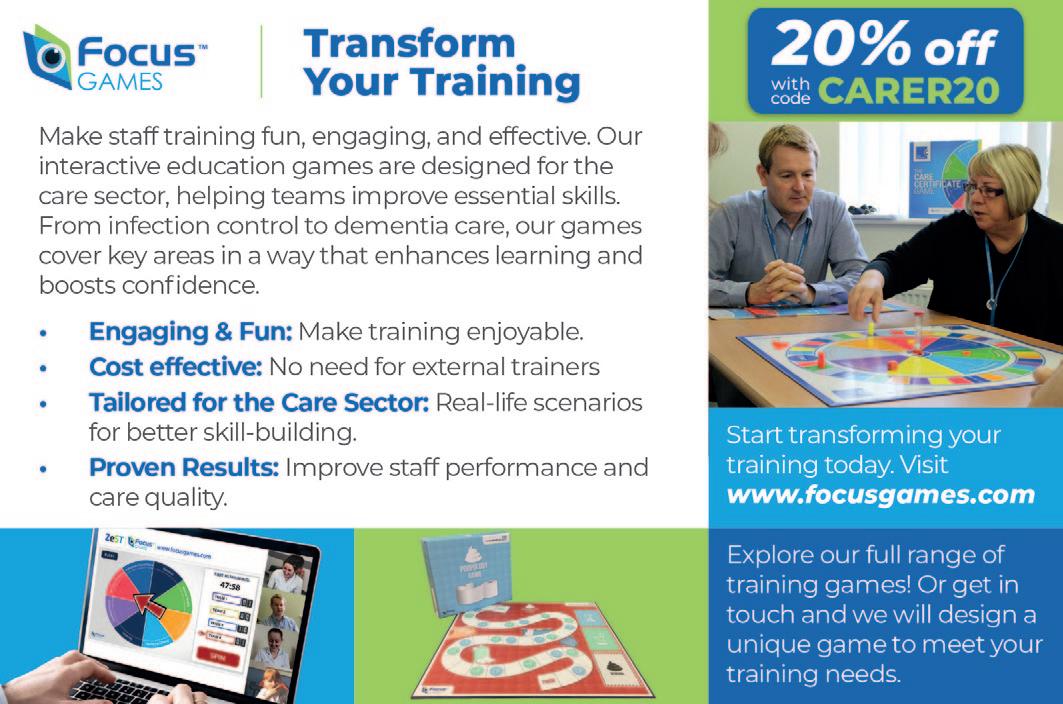
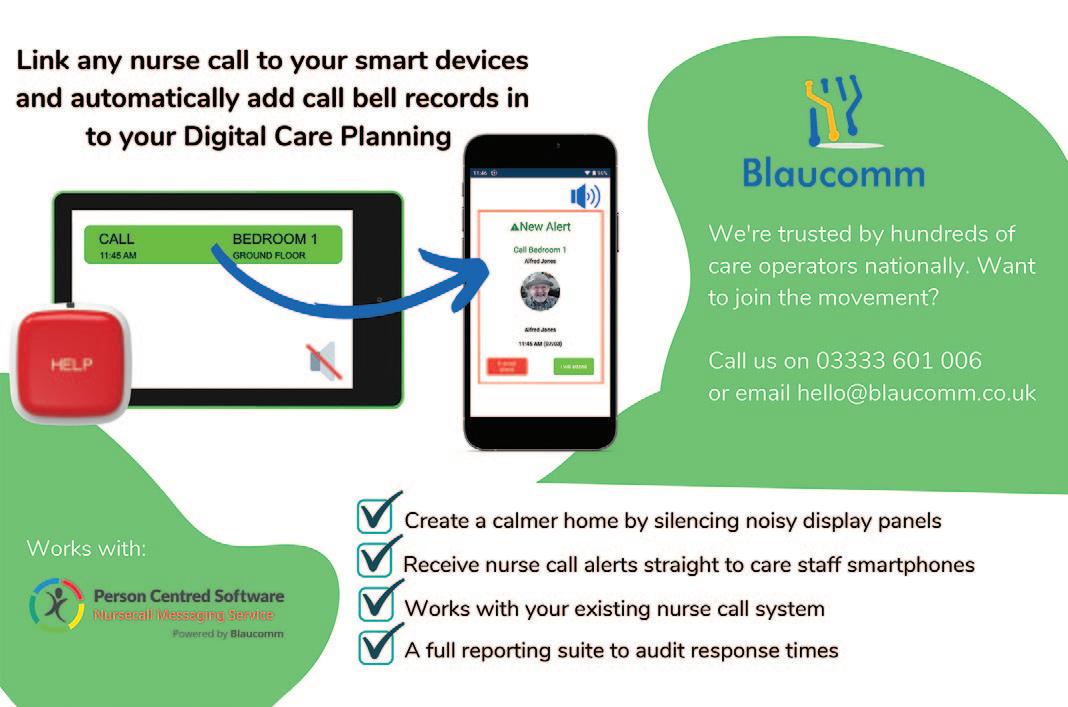
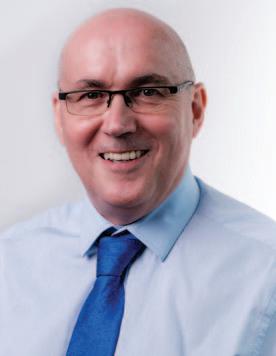
Editor Peter Adams
You will hopefully have already seen the exciting news—we are proud to be producing a special 80th Anniversary VE Day Supplement this May.
Over the years, THE CARER has been both proud and privileged to mark moments of national remembrance.
Our annual Remembrance Sunday editions have become a heartfelt tradition, and in 2024 we were deeply moved by the response to our special D-Day 80th anniversary tribute.
Now, as we approach the momentous 80th anniversary of VE Day, we invite you once again to join us in commemorating a landmark moment in history that truly needs no explanation.
On May 8th, 1945, Prime Minister Winston Churchill addressed the nation by radio to declare the end of the Second World War in Europe.
That moment signalled not just victory, but the beginning of homecomings for 3.8 million British servicemen and 400,000 British servicewomen—a collective sigh of relief and hope echoing across the country.
Eighty years on, the nation prepares to come together once more to pay tribute— not only to those who fought and served, but to the spirit of unity, courage and resilience that continues to define our country to this day.
This year’s anniversary carries a particular poignancy: it may well be one of the final major commemorations in which we are still able to honour our living veterans of the Second World War.
Their stories, their memories, their sacrifices—these are treasures we must preserve.
We urge all of you—our readers, care providers, and homes across the UK—to get involved.

Share your residents’ stories with us. Let us know how you’ll be marking VE Day in your home. Whether it's a tea party, a musical celebration, or simply a moment of reflection, these events are powerful ways to connect generations and to pass on a legacy of remembrance and understanding.
Also in this issue, I draw your attention to our lead story—the government’s announcement of further funding for the International Recruitment Regional Partnerships.
This initiative is designed to support overseas workers facing visa uncertainty or exploitation, and to help them remain in adult social care through structured regional support.
In a sector increasingly reliant on skilled, dedicated international colleagues, it is vital that we provide stability and fairness.
Supporting overseas workers not only sustains our workforce—it upholds the values of compassion and respect that underpin our profession.
As always, thank you for everything you do. You are the heart of care, and it is our privilege to share your stories.
I would encourage our readers to sign up for our bi-weekly digital newsletter at www.thecareruk.com and follow us on social media for all the latest news.
I can always be contacted at editor@thecareruk.com
Carer is published by RBC Publishing Ltd, 3 Carlton Mount, 2 Cranborne Road, Bournemouth, Dorset BH2 5BR.
damage. Views expressed within this publication are not necessarily those of the publisher or the editorial team. Whilst
responsibility for any effects, errors or omissions therefrom. All rights reserved, reproduction is forbidden unless written


These partnerships are tasked with providing vital support to migrant care workers impacted by sponsor non-compliance and exploitative employment conditions.
“We have seen unacceptable increases in unethical practices in adult social care recruitment,” a government spokesperson stated. “This funding ensures that those who are here to care for our most vulnerable citizens are treated with the dignity and fairness they deserve.”.
Where Home Office agency UK Visas and Immigration (UKVI) finds non-compliance, it may suspend or revoke an employer’s licence to sponsor workers from abroad. While suspension prevents employers from hiring new staff from abroad, revocation means existing staff will lose their certificate of sponsorship, giving them 60 days to find a new sponsor or leave the country.
TACKLING EXPLOITATION HEAD-ON
The fund, over the 2025 to 2026 financial year, will focus on supporting workers impacted by non-compliant sponsors or unethical practices to find new, ethical, sponsored employment, helping the adult social care sector to benefit from workers already in the UK.
Fifteen regional and sub-regional groups have already laid the groundwork over the past year by setting up dedicated "single point of contact" mailboxes. These serve as a gateway for migrant care workers seeking guidance, job connections, or simply reassurance in a turbulent employment environment.
This next phase will see those partnerships scale up operations to deliver faster, more efficient support— everything from CV assistance and interview coaching, to job matchmaking and relocation support.
The fund will also support wider work to prevent and respond to exploitative employment issues affecting migrant care workers.
The main aims of the fund are for regional partnerships to:
• support those impacted by non-compliant sponsors or unethical practice into new ethical, sponsored employment in the adult social care sector
engage with adult social care providers to encourage recruitment of migrant care workers impacted by noncompliant sponsors support work to prevent and respond to exploitative employment issues
Investment in the regional fund will:
significantly increase the number of migrant care workers impacted by non-compliant sponsors or unethical practice accessing support and finding new, ethical, sponsored employment
• substantially increase the number of providers engaging with regional partnerships and raise awareness of the pool of migrant care workers available to support the adult social care workforce
improve intelligence-sharing regarding international recruitment activity across the regional partnerships to inform and support UKVI and other relevant enforcement bodies to clamp down on unscrupulous providers strengthen evidence of what works for ensuring ethical recruitment and retention of international workers to
inform ongoing and future practice and policy
support our wider objective to ensure sufficient workforce capacity in the adult social care sector
EMPOWERING PROVIDERS, STRENGTHENING THE SECTOR
The fund is not only focused on migrant workers—it’s also designed to reinforce adult social care providers. Providers will be encouraged to tap into this ready and willing workforce, particularly those affected by sponsorship revocations, before seeking new overseas recruits.
Providers will benefit from communications campaigns, educational events, and ethical recruitment guidance. Importantly, the initiative supports the enforcement efforts of UK Visas and Immigration (UKVI), helping identify bad actors within the sector and sharing intelligence on unethical activity.
A STRATEGIC ALLOCATION OF FUNDS
To ensure the funding meets the most pressing local needs, allocations will follow a 75:25 formula— based 75% on the number of care home beds and domiciliary care users in an area, and 25% on local sponsorship revocation rates over the last year. This strategic approach ensures the areas most affected by unethical employment practices receive the greatest support.
Each regional partnership, led by a designated local authority, will be responsible for developing a delivery plan to meet clear objectives: improve ethical job placement, increase provider engagement, and support the wellbeing of international staff.
UNISON head of social care Gavin Edwards said: “Workers from overseas are propping up the UK’s social care sector. They play a vital role in delivering care to elderly and disabled people who’d otherwise struggle to get the help they need. The care sector is desperately short of staff.”
“People who come to the UK to fill skilled jobs in care homes and in the community should be treated with respect. But many are abused and exploited by rogue firms who hold power over their right to work and stay here.”
“Visa restrictions are behind the fall in numbers, not a lack of vacancies. Reforms are needed urgently so the government has control over visa sponsorship. This would stop unscrupulous employers from threatening staff with dismissal or deportation.”
“A fair pay agreement, a national care service and more funding are also vital to drive up standards and encourage staff to stay and to attract new recruits.”
• Contact your regional partnership to connect with displaced migrant care workers.
Attend upcoming webinars and training sessions on ethical recruitment.
Access support to ensure compliance with the International Recruitment Code of Practice.
For more information, visit the DHSC's international recruitment guidance page or contact your local authority’s care workforce support team.
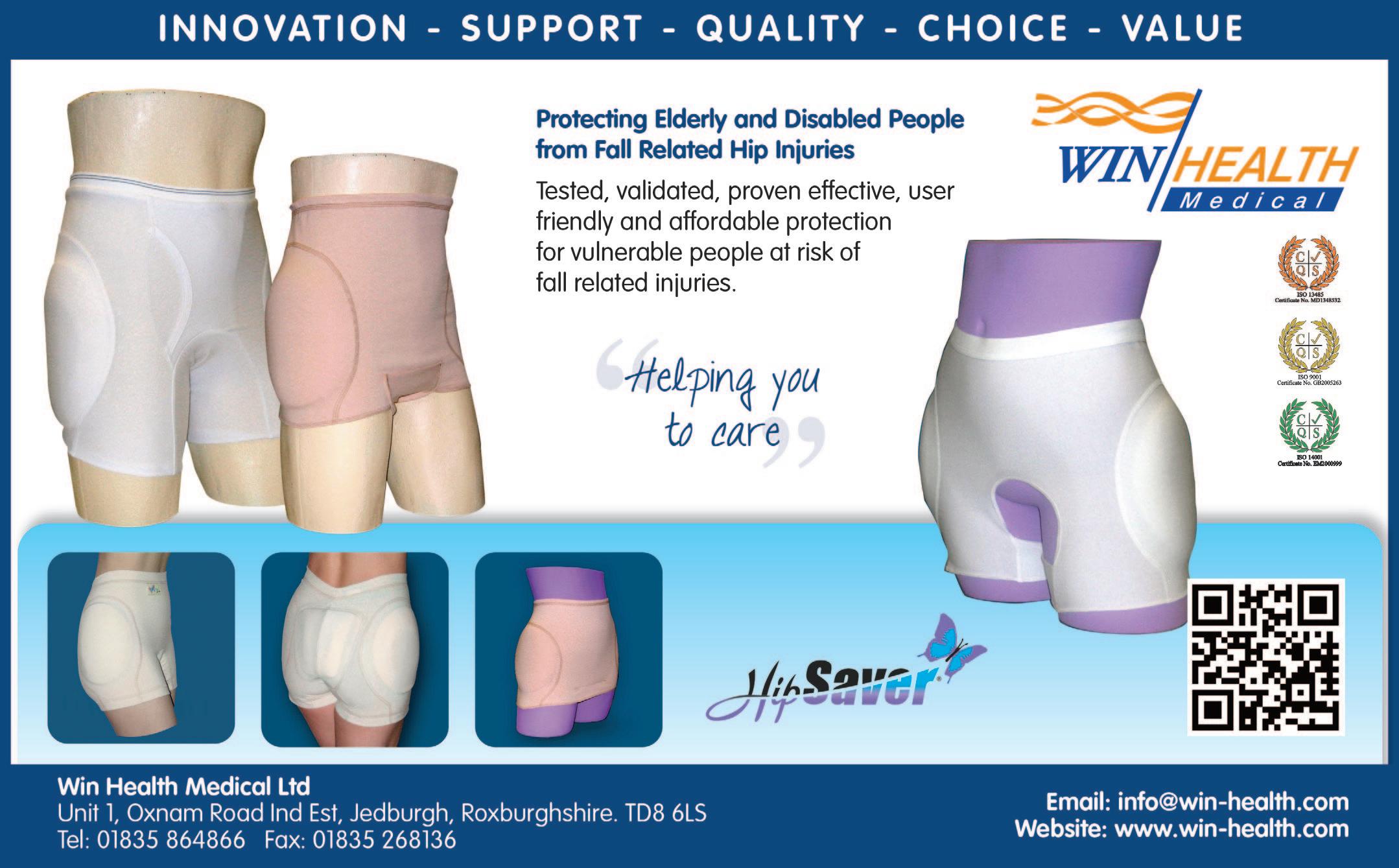
By Darren Woodhead, Founder and Principal Consultant at
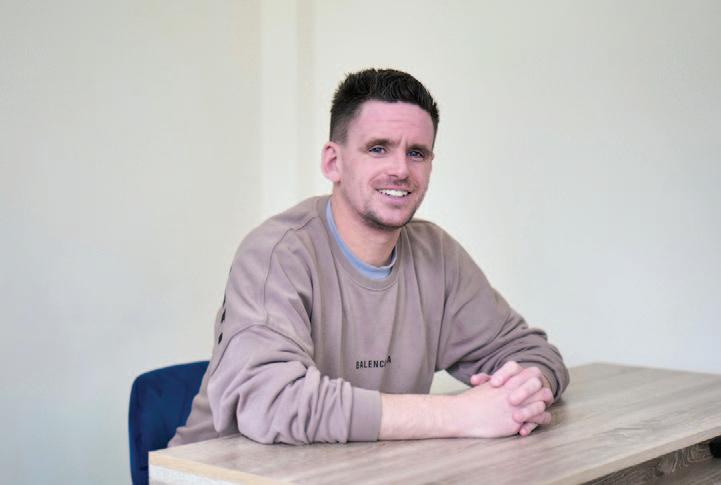
There’s a huge amount of potential for using AI in care – from cutting administrative burdens, to improving care delivery.
Darren Woodhead, Founder of Digital Care Solutions and Director at East Yorkshire care business Sherbutt House, explains how he has implemented AI systems into the family care business, the impact it’s had, and how to mitigate the risks of using AI.
PRIORITY AREAS FOR AI – WHAT DRIVES THE BIGGEST IMPACT
Over the past few years, we’ve experimented (carefully) with AI across a wide range of areas of our admin and caring operations. Today, it’s a huge part of the business, helping the team with risk assessments, supporting care planning, reporting, checking data, staff recruitment, management and transcribing.
THE RESULTS HAVE BEEN EXTREMELY POSITIVE.
Partially automating the creation of documentation, record-keeping, scheduling, and reporting has slashed our admin burden. By enabling our team to work more efficiently, it’s eliminating hours of work every day, which has enabled us to free up carers to spend more time caring for residents. The biggest saving has been in transcribing meeting minutes – something that used to take hours every week has been completely automated.
AI has also driven real improvements in our personalised care delivery, by completely transforming our data analytics capabilities. By feeding data like seizures, falls, behaviours and fluid output into our AI systems, we’ve been able to identify trends around individual patients, staff behaviour, trigger points and risk areas that we would never have known about.
These insights are invaluable. We use them to address issues, share information between care professionals, and to inform our policies, care plans, risk assessments and more.
One of the areas where we want to improve our AI use is in staff management and scheduling. While AI has been useful for predicting staffing requirements, we’ve had limited success using it to arrange our rotas – with around 100 members of staff, the complexity and constant changes have proved difficult to automate using the current tools. However, with the pace of AI advancement, we expect there will be a solution very soon!
While AI can drive huge efficiency savings, it requires careful management to be effective and safe in a care setting. You still need input and oversight from people who know what they’re doing. Using AI effectively means knowing both what a ‘good’ output looks like and how to get one without using AI!
For example, if you’re using AI to cut the time associated with the creation of care plans, you can’t just feed in previous care plans and expect good results. You need to involve someone who knows the patient, understands their needs, and knows what a good, personalised care plan looks like!
The number one principle to remember is that AI is a tool, not a complete solution. It’s very good at creating something that looks like it’s right to the untrained eye, but it could be completely inappropriate. Always have someone who knows what they are doing carefully check the output.
AI IN CARE - RISKS AND SAFEGUARDS
Our sector is very conservative when it comes to technology, and it’s easy to understand why care homes have been reluctant to implement AI. There’s a lot at stake, and there are a lot of risks to navigate –including patient safety, accuracy of the AI output, resident consent and data privacy.

Protecting sensitive data is perhaps the biggest challenge. Inputting personal data to open, cloud-based AI tools is inherently risky, and can violate your own commitments to GDPR and privacy.
To mitigate this risk, care homes need to be careful about the tools they choose, and they need to understand how data they input will be used by the platform. If utilising real world patient data, the best solution is to use self-hosted versions of AI models that run on local computers, rather than the cloud – so the information cannot be shared externally.
Thankfully, there are plenty of solutions out there, from offline versions of mainstream AI models to specialist off-the-shelf tools. It’s even possible to create your own, customised LLM for your specific requirements, which can be made with safety guardrails built in to mitigate risks.
Before implementing any AI system or process, you must have the right policies, consent agreements and staff training in place. Your team needs to understand the risks, know which tools they can use, and how they are allowed to use them before you let any AI tools loose in your care home.
Currently, most of the AI systems used by care homes drive administrative efficiency – but this is just the beginning. There’s huge potential for the use of current and future AI tools in patient care, from resident safety and automated health monitoring to environmental controls and medication management.
The next frontier for care homes could be AI-powered wearables –devices that can automatically monitor vital signs, movements, behaviours and even assess pain levels in patients. These will detect the early warning signs of illness or deterioration, so carers can put the right safeguards and interventions in place.
It's already happening. While fall alarms are nothing new, some healthcare providers are now trialling AI-powered fall prevention systems which analyse patient movement patterns and gait to predict and prevent falls before they happen.
I believe the potential of AI to improve patient care and efficiency is virtually limitless and makes navigating the obvious risks worthwhile. With the right plan, the right tools and the right safeguards in place, AI is a worthy addition to any care provider.
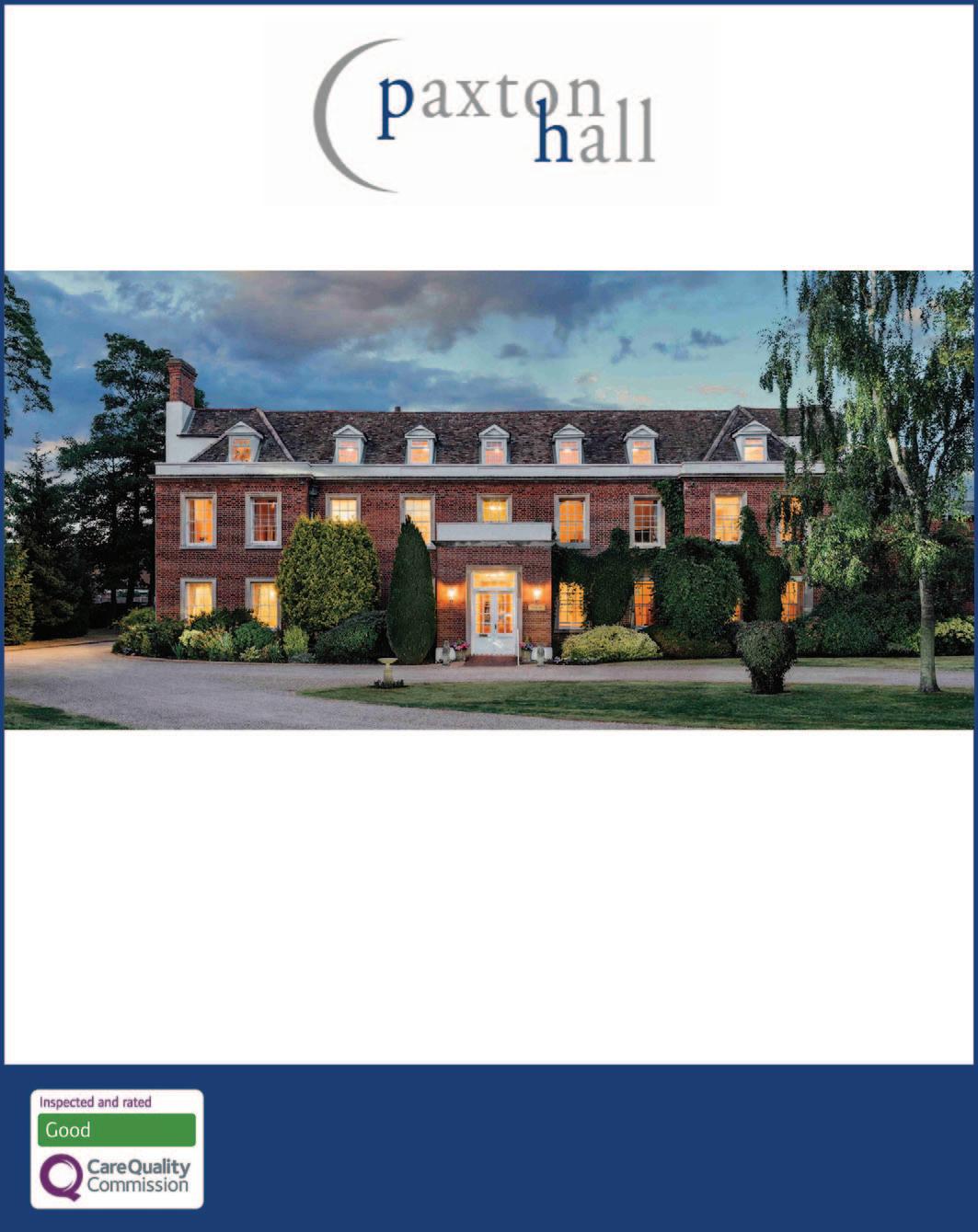

The President of the Royal College of Psychiatrists has responded to the UK Government’s pledges to support frontline staff with new action to tackle violence, improve working lives and enhance career progression.
Dr Lade Smith CBE, President of the Royal College of Psychiatrists, said:
“We welcome measures to improve reporting and prevention of violence and aggression against NHS Staff. Healthcare professionals cannot be expected to come to work and do the best for their patients in an environment where they experience threats, violence and abusive behaviour.
“More than 1 in 10 mental health staff have personally experienced physical violence at work from members of the public in
the last 12 months. In addition to the physical harm this can cause, there are longer term psychological harms which can affect their ability to function at work as well as impacting retention.
“RCPsych are ready to support the UK government to support NHS staff. In addition to accessing physical health support, the Government must ensure NHS staff are able to access comprehensive mental health and wellbeing support. At a national level, we are calling for recurrent funding of £40m that is ring-fenced to meet the mental health needs of NHS staff across England. This would be enough to maintain staff mental health and wellbeing hubs.
“As well as violence and aggression, staff are regularly impacted by experiences of racism and discrimination. We are calling on healthcare provider organisations to tackle this by taking a zerotolerance approach to racist behaviour.
“As part of our Act Against Racism campaign we’ve launched new guidance and resources to support mental health employers. We are calling on organisations to sign up to adopt the 15 actions to take vital steps towards addressing this huge problem.”
HC-One’s Capwell Grange Care Home in Luton, Bedfordshire, has been celebrating National Tea Party Day, which is celebrated on Monday, April 21. The day highlights the social joys of sharing a cup of tea, a slice of cake and a chat with others.
The team at Capwell Grange Care Home put on a Mad Hatter’s themed afternoon tea party for residents to enjoy. The dining room was decorated especially for the occasion with banners and woodland décor.
An l afternoon tea spread was displayed on each table with a selection of cakes, scones and other delicacies for residents to choose from alongside a selection of teas to try, including green, black and chai tea, poured into fine China. Residents fully embraced the theme by accessorising their outfits to coincide with the Mad
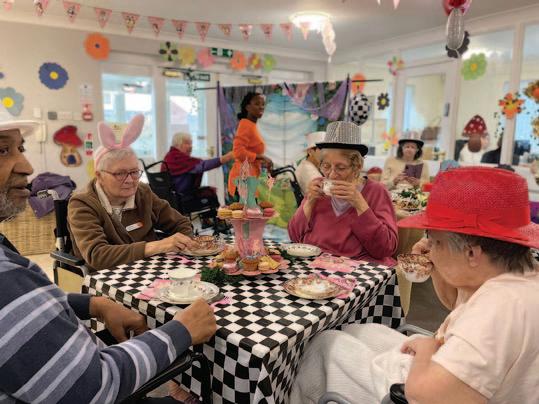
Hatter’s Tea Party theme by wearing eye-catching hats and rabbit ears.
After enjoying their afternoon tea spread, residents and colleagues enjoyed getting their photos taken to remember the day using the Mad Hatters themed photo frame, featuring well-loved characters and objects from the classic Alice in Wonderland story.
Nicola Berry, HC-One’s Capwell Grange Care Home Senior Manager, said:
“Our residents really enjoyed our Mad Hatter’s themed tea party and indulging in the different types of tea, cakes, scones and other delicacies on offer. They enjoyed learning about tea etiquette and having a good catch up with each other.”
Kailash Manor Care Home recently hosted a Networking event in Partnership with St Luke’s Hospice—an inspiring evening of collaboration, connection, and shared purpose, proving to be a resounding success.
The event, which took place in March, brought together over 40 professionals from diverse fields, including healthcare, finance, and care industries, along with relatives, councillors, community leaders and members who share a deep commitment to compassionate end-of-life care.
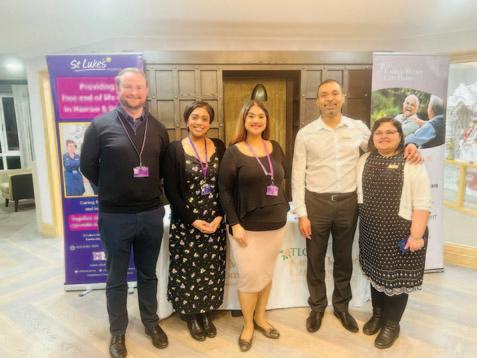
The event served as a platform to strengthen partnerships, encourage knowledge-sharing, and foster community-building

between two compassionate organisations in the healthcare and care services sector to enhance holistic care.
Kailash Manor provided a welcoming arranged space, which set the perfect tone for engaging conversations and meaningful connections with a delightful spread prepared by Catering team, making for an enjoyable and enriching experience for all attendees.
Every conversation held and every partnership formed during the event contributes to the vital mission and shared commitment of Kailash Manor and St Luke’s Hospice to ensure that those facing life-limiting illness receive the care, dignity, and support they deserve.
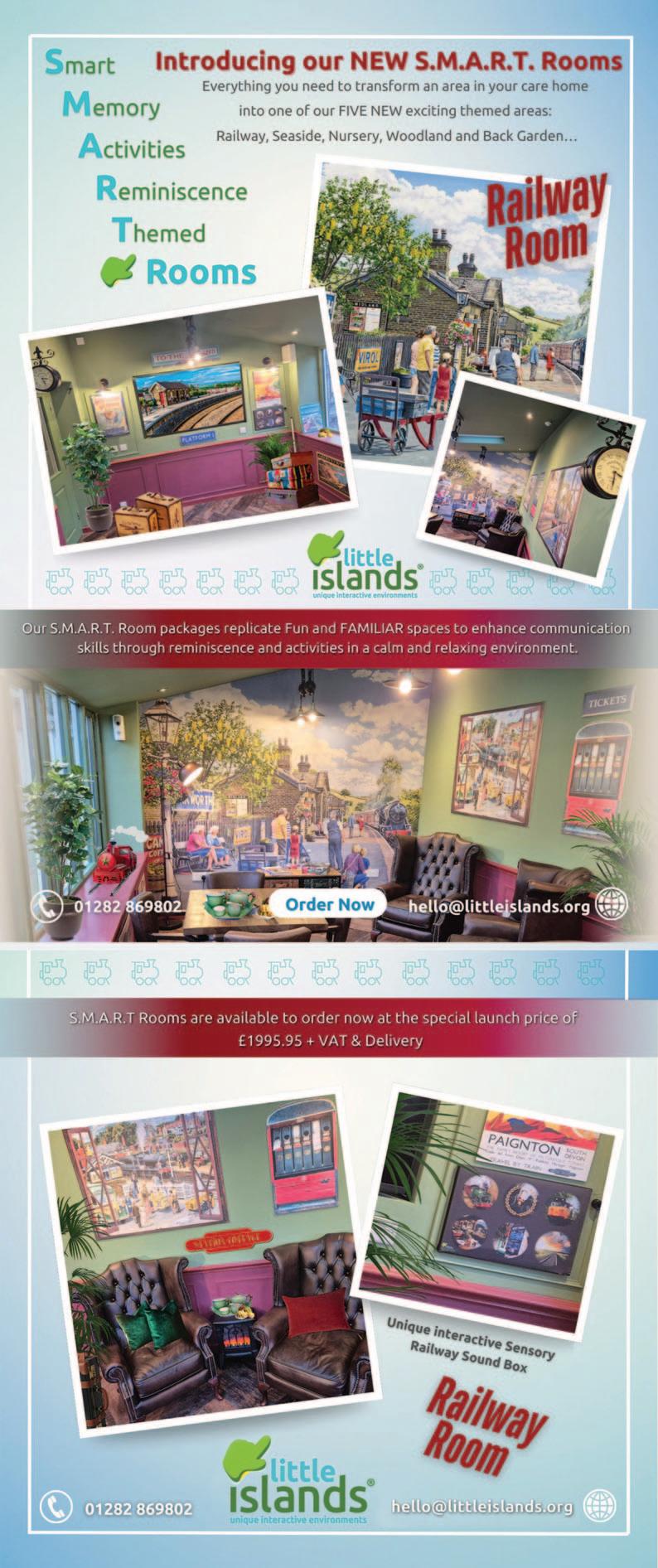
Campaigners in Scotland are calling for a unified legislative framework to regulate the use of restraint, seclusion and forced injections across all state care and education settings.
Forced restraint can cause devastating physical and psychological trauma. Despite this, these practices are still too often used as a first resort—affecting not only children and young people, but adults as well.
The call follows recent revelations and reports from The Alliance website exposing the excessive overuse of restraint and forced injections at adolescent inpatient psychiatric unit laying bare campaigners say, for the urgent need for a unified legislative framework to regulate the use of restraint and seclusion across all state care and education settings.
Echoing campaigners, Katy Clark MSP put forward a motion in Parliament condemning the reported actions. Alongside the Children and Young People’s Commissioner Scotland, and representatives of the Scottish Human Rights Commission, The Promise Scotland and the Equality and Human Rights Commission, she urged the Scottish Government to establish a unified statutory framework regulating the use of restraint and seclusion across all state care and
Social Care TV continue to fly the flag for highest quality online training for Health and Social Care, after unwavering commitment to excellence within the sector for over 25 years.
Their widely-used health and social care specific courses - produced and edited in-house - are expertly designed to make learning engaging, informative and, therefore, highly effective for learners.
Accredited by CPD, training with Social Care TV is quality assured, comprehensive and relevant.
As one of the leading online training providers in the health and social care sector in the UK, they supply training for local authorities, recruitment agencies, care home groups and other health and social care organisations.
Their feature-rich Manager platform has further been enhanced this year with the introduction of several new Manager tools designed to aid with compliance, reporting and trainee management. Features now available include:
• Compliance Dashboard with Traffic Light System
• Downloadable Trainee Matrix
• Custom Bundles

• Trainee Groups
• Bulk Uploads
• Bulk Enrolment Onto Custom Bundles
• Course Enrolment Notifications
• Course Reminders
education settings.
Ms Clark also stated that provisions for the mandatory reporting of the overuse of restraint should be included in any legislative framework.
Minister for Social Care, Mental Wellbeing and Sport, Maree Todd, said the following this link will take you away from The Alliance website in response to concerns raised:
“It is all too clear that what was described is completely and wholly unacceptable. It should not have happened, and we will do all in our power to prevent it happening again.”
All young people who need in-patient admission for their mental health must be able to access safe, high-quality care, which must always respect their human rights and support their recovery.”
“What I found so disturbing about the documentary was the culture that was depicted. By any standards, the behaviour of some staff during the time covered fell far below basic standards of decency and compassion or what we all expect of healthcare professionals”.

SCTV regularly release new and updated high-quality courses. Previews for all courses can be viewed at: Courses - Social Care TV (www.social-care.tv/courses/course-details)
To enhance their learners' experience further they have created free, comprehensive subject-specific workbooks which were rolled out across all courses this year. This unique addition provides excellent value and a fully robust training package.
SCTV are delighted to have won several awards over the last 12 months including:
• Best Online Health and Social Care Learning Platform’ – Global Health & Pharma Social Care Awards 2024
• ‘CPD Provider of the Year’ – The CPD Awards
• Social Care Training Provider of the Year’ - Corporate Livewire Innovation & Excellence Awards
Gold standard customer service remains a core staple of the business, with expert support and guidance provided via telephone, email and live chat. They place great importance on the training and development of their customer services team to ensure that they continue

to provide a personal, friendly and knowledgeable service.
Their much-loved ‘Care Worker of the Month’ award recognises and rewards the selfless dedication shown by care workers across the UK and they proudly support the Care Workers Charity who aim to advance the financial, professional and mental wellbeing of social care workers.
SCTV believe that high quality training should be accessible to all and offer regular, free courses which include a digital certificate accessible via their website.
The company stands behind a clear mission and set of values which define their ethos and their dedication to both the Care Sector and those within it. These can be viewed at: Mission Statement and Core Values - Social Care TV (www.social-care.tv/about/mission-statement-and-core-values)
Social Care TV are a responsible business, committed to ensuring that their actions have a positive impact on their employees, customers, the wider health and social care community and the environment.
Above all, SCTV consistently strive to make a meaningful contribution to the wellbeing of those being cared for.
For

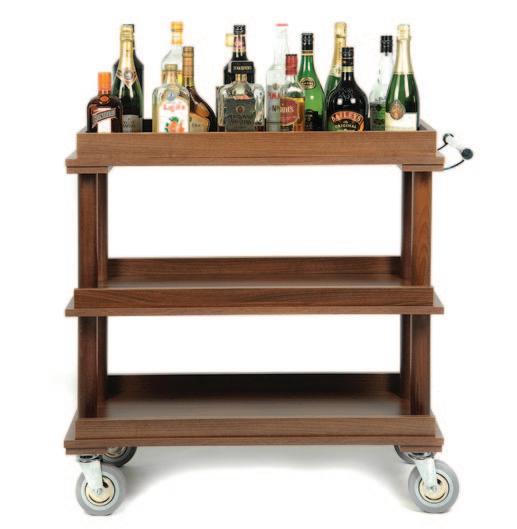
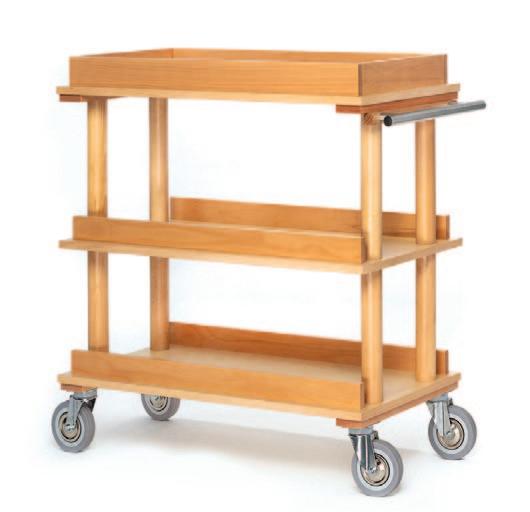
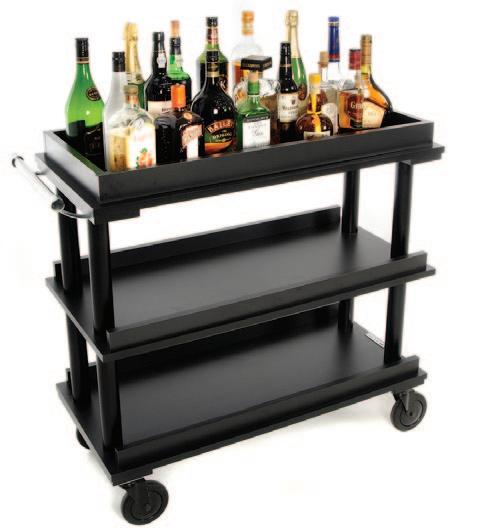
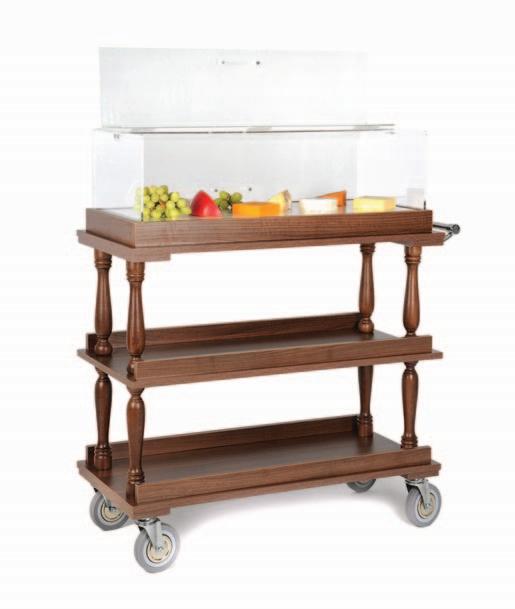
Dementia UK is running its 16th annual ‘Time for a Cuppa’ event to raise funds for families affected by dementia
By the time you’ve boiled your kettle, another person will have developed dementia. It’s a huge and growing health crisis – one in two of us will be affected by the condition in our lifetime.
This May, Dementia UK, the specialist dementia nursing charity, is inviting the nation to make Time for a Cuppa, so the charity can reach more families than ever with their vital support.
Between 1st – 8th May, Dementia UK is encouraging people across the country to get together at home, at work, or in the local community to host a Time for a Cuppa event to help support families affected by dementia.
Families, friends and colleagues can come together over a cup of tea and a piece of cake in return for a donation to the charity. Every cuppa poured and penny raised will help the charity to grow the number of Admiral

Over the past 16 years, Time for a Cuppa has raised over £1,600,000 which has helped to fund numerous Admiral Nurse services around the UK to support families living with dementia.
Dr Hilda Hayo, Chief Admiral Nurse and CEO of Dementia UK said: “Nearly one million people are living with dementia in the UK today, yet thousands of people aren’t getting the support they deserve.”
“At Dementia UK, we believe every family affected by dementia should have the support of a dementia specialist Admiral Nurse – but right now, we can’t reach everyone who needs us.”
“By making Time for a Cuppa, you can change that. Whether you put on an event at work or invite your friends for a tea and piece of cake at home, you can help us recruit more Admiral Nurses who are a lifeline to families.”
Sign up for your free Time for a Cuppa fundraising pack at https://dementiauk.org/timeforacuppa
Colleagues from Anchor’s Glenvale Park care home in Wellingborough braved harsh conditions to climb Mount Snowdon to raise money for local community choir, Dementia Sings Out.
Those taking part in the climb on Saturday 29 March were faced with poor visibility and strong winds, but neither factor prevented them from completing the impressive feat.
The result of their efforts was almost £4,000 raised for Northampton’s Dementia Sings Out, a community choir for those living with dementia and their carers.
Residents and colleagues at Anchor’s Glenvale Park care home attend weekly
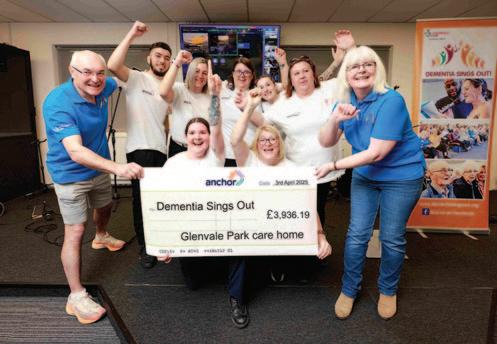
performances by the choir at the Compass Church in Wellingborough. It was at the performance on Thursday 3 April that Glenvale Park colleagues presented Dementia Sings Out with a cheque for £3,936.19.
Glenvale Park Home Manager Carley Calder was among those who took part in the Mount Snowdon climb. She said: “We are so proud of the immense achievement of all the team members involved. Each and every one pushed themselves beyond their limits.
“It was all worth it for the money we’ve raised for Dementia Sings Out. Despite it all, we had fun and couldn’t have got through it without each other’s support, but we have all vowed never to return to Mount Snowdon again!”

By Gary McIndoe, Managing Partner, Latitude Law

On 9 April 2025 the government introduced new Immigration Rules in response to widespread reported instances of worker exploitation in the care sector. Since an exception was introduced for care providers, to permit the sponsorship of private care workers in residential or domiciliary settings at salaries well below those generally required for overseas skilled worker sponsorship, there has been a huge take-up of sponsor licences by care providers, and many thousands of certificates of sponsorship issued to workers from abroad.
FINANCIAL PRESSURES FROM ALL SIDES
While the vast majority of care providers have managed their sponsor licence and overseas recruitment responsibly, the sheer numbers of workers under sponsorship has inevitably led to some examples of bad practice, which have often garnered media coverage. But it is not just down to numbers; our experience at Latitude Law – gained through advising a number of care provider clients over the past couple of years - also points to difficulties caused by the nature of care work in a sector facing financial pressures from all sides.
Some of these problems arose from a lack of understanding –on the part of the employer – of their many duties as the holder of a sponsor licence. Some of these legal obligations were unfamiliar to businesses who had up to that point only recruited locally, often using zero-hour contracts. The need, for example, to pay staff from day one of their contract where they are undergoing mandatory training. Shift patterns can also raise issues with the Home Office, for example in relation to rest time under the Working Time Regulations.
The reported case law around sponsor licensing has very heavily featured care providers whose licences were revoked by the Home Office; such judicial reviews have proved very difficult for the Claimants to win, the courts taking the view that sponsorship is a privilege, not a right, and comes with manifold duties the licensed employed is bound to uphold.
The revocation of a relatively large number of care home licences has left thousands of staff without
sponsorship and an urgent need to find alternative work. They are granted a 60-day period by the Home Office, in which time they are expected to either find a new sponsor, or return home.
Many workers are not keen to do the latter, having invested significant sums in the process of relocation to the UK. It is also worth noting here that new Immigration Rules make clear that only strictly defined fees may be passed on by employers to sponsored workers through the visa process, and any contractual clauses aimed at clawing back immigration fees – including legal fees - from staff must be very limited in scope.
PRIORITISING
It is this unhappy situation for sponsored care staff that led the government to introduce its 9 April rule changes. They mean that, where a licensed care provider based in England (the changes does not apply elsewhere in the UK for now) wishes to sponsor a care worker, it must first look at the pool of formerlysponsored staff already in the UK.
The new rule provides that a sponsor must have tried to recruit for the job the applicant is being sponsored for, from a pool of Skilled Workers who: (i) are in the UK; (ii) were last sponsored as a carer or senior carer; and (iii) are in need of new sponsorship because their sponsor has lost its licence or has not provided sufficient work , or have been identified by the relevant regional or sub-regional partnership (set up for the purpose of delivering activity which prevents and responds to exploitative employment practices with international recruitment of care staff, in the area in which the sponsor is located or recruiting) as a worker requiring assistance in obtaining new sponsorship.
The sponsor must provide confirmation from the regional or sub-regional partnership that this requirement has been met; and must confirm that no suitable workers were available from this pool.
Increasing scrutiny of sponsorship of foreign staff
This is an entirely novel approach in the context of sponsoring workers from overseas. While we must wait and see how the process actually works, the principle is to be applauded. The plight of care staff left high and dry without a licensed sponsor – or fired or offered insufficient hours by often unscrupulous employers – required government intervention. Care providers will have already noticed increased scrutiny of their sponsorship of foreign staff, with requests for new allocations of certificates of sponsorship being subject to further information and evidence requests from the Home Office for many months now. The need to address the recruitment pool first stands to simplify the process if the system works well.

White Lodge care home in Braydon, Swindon was full of animal mischief on Wednesday 16th April when the farm came to visit the home.
Residents, friends and family and many guests of all ages from the local community were pleasantly surprised to see animals such as alpaca’s, pigmy goats, lambs and gorgeous guinea pigs roaming around the homes garden as Dave and Ewe’s Therapeutic Farm paid a visit.
General Manager Ramona Gherendi, said:
“Our residents have really enjoyed their unusual visitors today. We knew that having
The pobroll® is the invention of Pat O’Brien, a physiotherapist, Moving and Handling trainer, and Conflict Management tutor with over two decades of experience in care homes and nursing homes
Care home managers often face challenges in delivering intimate care while balancing efficiency and managing costs, particularly when these essential tasks provoke behaviours that can be challenging to safely manage. Traditional methods—especially for bed-bound residents—often lead to lengthy processes and frequent linen changes, driving up costs and consuming valuable staff time. The pobroll® provides a transformative solution that supports dignified care, achieves significant cost savings, and reduces the need for additional staffing.
The pobroll® is an innovative bed-bathing wrap specifically designed to enhance comfort and dignity during personal washing for individuals who require in-bed care. Centred on the resident’s experience, it minimizes distress by providing sensory comfort. Crafted with two layers of high-quality cotton-terry toweling and a waterproof layer in between, it delivers a soothing, calming experience while keeping the bed completely dry. Sized for a standard single bed, the pobroll®’s dual-layer design offers warmth and a sense of security and privacy, allowing residents to maintain comfort and dignity during bed-based bathing routines.
BOOSTING COST
the farm here would be a bit of fun for all our residents, especially as some find it difficult to go on many outings in our minibus. We are always looking for new activities for the residents and today we have seen the seen the enjoyment and the therapeutic influence animals can have on people.”
“The power of animal therapy was obvious from the smiles on everyone’s faces” said Activities Coordinator, Shayla Sharmeen.
“Getting up close to the farms four-legged friends in the garden and individual resident rooms brought so much joy.”
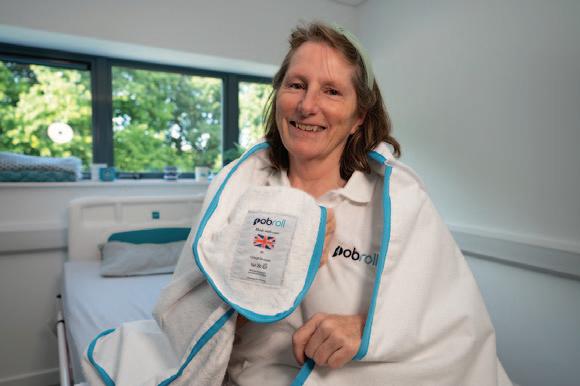
The pobroll®'s waterproof design enables caregivers to provide a complete wet wash without the risk of soaking the bed, minimising the need for frequent linen changes. This leads to fewer laundry loads, reducing labour and utility costs, as well as wear on linens. By reducing logistical tasks, caregivers have more time to focus on direct resident care, enhancing productivity overall. Additionally, reduced reliance on disposable wipes results in further cost savings and supports environmentally sustainable practices. With its durable, reusable design, the pobroll® maintains hygiene standards and allows for extended use across multiple residents. As care homes face increased pressure to adopt sustainable practices, the
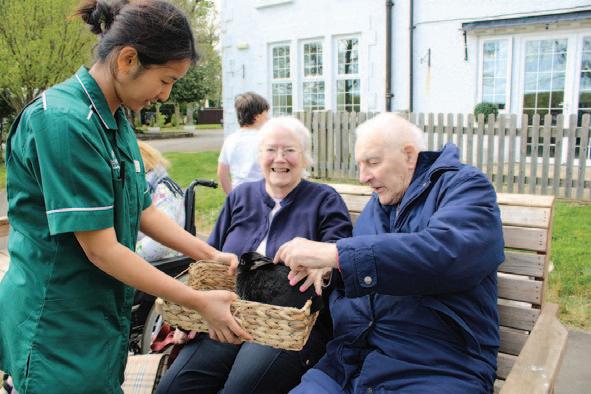
pobroll® provides an effective solution that supports both economic and environmental goals.
Managing resident agitation—particularly for those with dementia—often requires specialised training in restraint techniques. The pobroll® significantly reduces the need for physical intervention by providing a warm, secure covering that alleviates resident distress. This gentle approach minimizes aggressive or defensive reactions, reducing the number of staff needed for these interactions. As a result, facilities can potentially lower staffing levels without compromising care quality, yielding substantial cost savings. Additionally, reduced dependence on physical intervention decreases training costs associated with restraint techniques. By simplifying the process of intimate care, the pobroll® reduces the need for specialised training, making onboarding smoother and lowering turnover-related training expenses.
The pobroll® supports compliance with restraint reduction guidelines, helping facilities minimise documentation burdens and regulatory liabilities linked to physical interventions. This non-invasive solution improves safety for both residents and caregivers, fostering a culture of dignity and respect that boosts satisfaction among residents and their families.
CONCLUSION: A VALUABLE ASSET FOR QUALITY CARE AND COST MANAGEMENT
For care homes, the pobroll® represents a strategic investment, offering measurable savings by reducing reliance on disposable products, lowering laundry and training costs, and enabling efficient staffing. Most importantly, it prioritises resident dignity and comfort, setting a high standard for compassionate, personcentred care. For facilities seeking to enhance financial performance and care quality, the pobroll® is an invaluable
The Scottish Social Services Council (SSSC) has today published the results of its first Have Your Say Workforce Wellbeing Survey on the experiences of people working in the social work, social care and children and young people workforce. The SSSC will carry out the survey every year.
The survey, carried out by Progressive Partnership for the SSSC, asked about wellbeing, pay, terms and conditions, support for and access to training and qualifications and general experiences of working in the sector.
The findingswill help the SSSC and key partners, including Scottish Government, to find out more about the experience of working in this field, as well as informing the development of national policies that have an impact on this sector and approaches on how best to support the workforce.
As the workforce regulator the SSSC is in a unique position to gather views from over 176,000 people on its Register who work in social work, social care and children and young people services in Scotland.
The SSSC registers a wide range of different professions in this sector and the findings show that while generally people come into their career for similar reasons, there are differences in their experiences depending on whether they work in social work, social care or children and young people services.
Main findings from the survey results
• Most respondents (65%) came into social work, social care or children and young people services to make a difference to people’s lives and because it would be a job they would love or enjoy (59%).
• 81% feel valued by those they support for the work they do but were less likely to feel that their work was valued by the public (42%).
• 56% of respondents are satisfied with their current job, while 35% are dissatisfied.
• 65% said they feel able to meet the needs of people they care for/support.
• 85% of respondents expressed a desire to improve their knowledge and skills and 73% acknowledged the availability of training and learning opportunities.
• 47% would recommend their organisation as a great place to work.
• Social care staff reported higher satisfaction rates compared to other groups, with 59% expressing satisfaction.
• Social care and children and young people staff were more likely to mention the pay being too low (41% and 43% respectively, compared to 23% of social work staff).
• Social care staff were least likely to receive sick pay (54%) and children and young people staff were least likely to receive 28 days holiday (68%).
• Social work staff tended to express the most negative views/lowest levels of satisfaction with their current roles and were the most likely to consider leaving in the next 12 months.
• Over two fifths of social work staff (43%) were dissatisfied overall.
• Just over a fifth of respondents (22%) said they were likely to leave their role in the sector in the next 12 months. Almost half said they are likely to leave within the next five years. Their key reasons are being overworked, low pay and poor employment or working conditions in gener-
al.
• 43% of those planning to leave have experienced discrimination, bullying or harassment in their role.
Maree Allison, SSSC Chief Executive said:
‘This is the first time we have carried out this survey and the results show that the workforce in Scotland is committed to making a real difference to people’s lives.
‘I’m reassured to hear that many people feel valued for the work they do and the survey has given us a unique insight into this workforce and their experiences. It’s important now that we learn from the findings so that people working in this sector feel supported, able to develop their skills and to grow in their careers.
‘However, the results also highlight challenges covering a range of topics, including pay and conditions with half of those on hourly rates telling us they are finding it more difficult to manage financially than this time last year.And there are significant differences in experiences overall depending on whether people work in social work, social care or children and young people services.
‘We will share the findings to help shape and design the support and services we provide as well as guiding the work of partner organisations and government.
‘Thank you to everyone who gave their time to take part in the research and contributed thoughts and views that have given us an insight into what working in these services in Scotland is like today.’
Read the full report on the SSSC’s website here.
The halls of HC-One’s Bradley Hall Care Home, in Leicester, are buzzing with excitement and pride after celebrating a colleague who took on the Leicester Big 10K race.
On Sunday, April 13, Dagmara Brodziak, Bradley Hall Care Assistant, laced up her running shoes and took on the Leicester Big 10K at Abbey Park, leaving her colleagues and residents at Bradley Hall Care Home utterly amazed by her jaw-dropping achievement.
Not only did she conquer the challenging 10-kilometer course, but she also smashed her personal best, crossing the finish line with an astonishing time of 00:59:36 – her fastest 10K ever.
Competing against a field of 815 runners, Dagmara crossed the finish

line in an impressive 376th place – a testament to her grit, determination, and unstoppable spirit.
Bradley Hall residents were out in full force, lining the finish line with cheers, applause, and a few joyful tears as they watched Dagmara power through to victory. The energy was electric, and the sight of her achieving this milestone left them all beaming with pride.
Sarah Clark, HC-One’s Bradley Hall Care Home Manager, stated: “Dagmara’s accomplishment is nothing short of spectacular. Her hard work and dedication have paid off in the most incredible way, and we couldn’t be prouder to call her one of our own. She has shown us all what’s possible with a little heart and a lot of determination!”
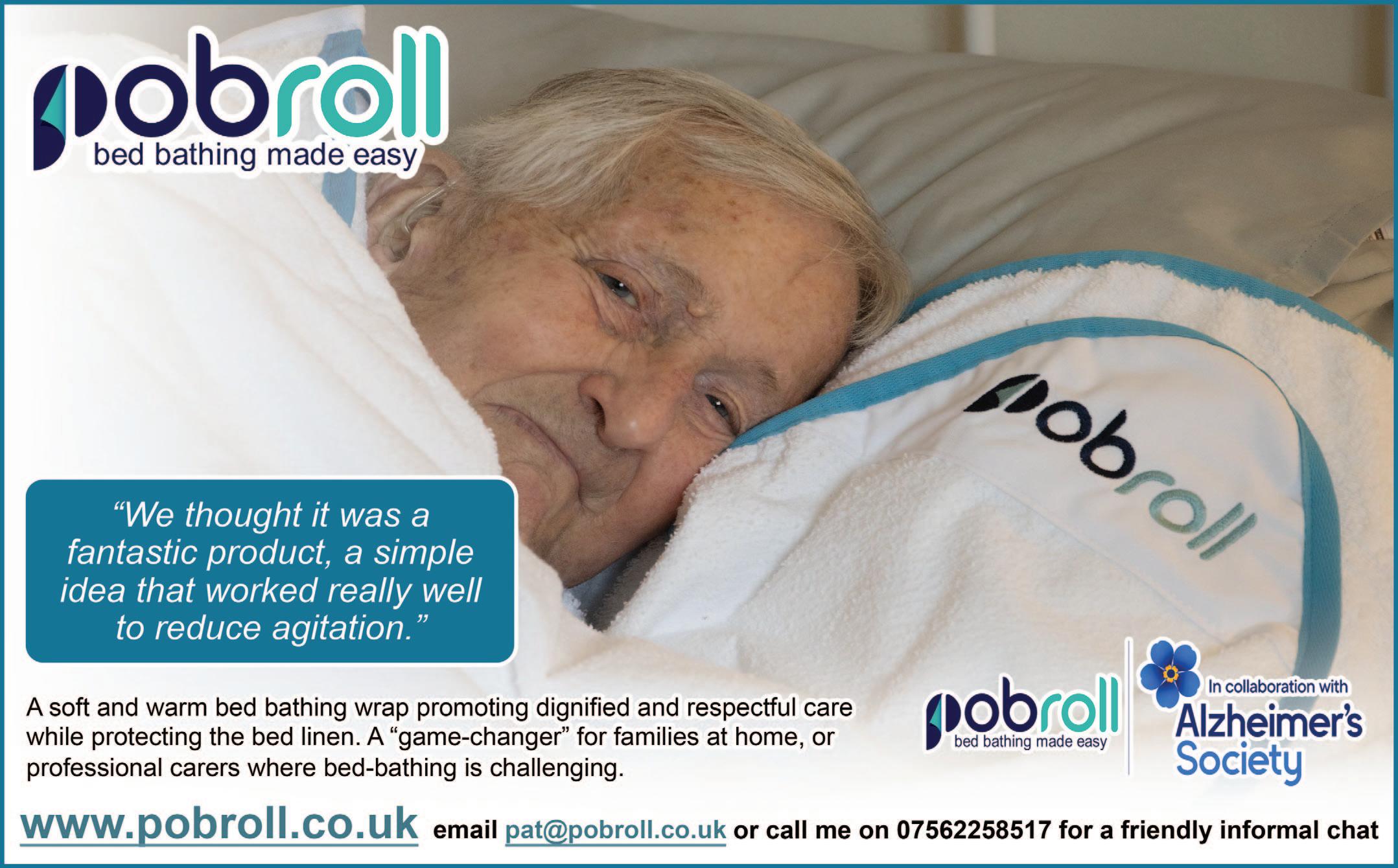

Alastair Gillespie, Head of Abuse and Social Care at Forbes Solicitors (www.forbessolicitors.co.uk), looks at key trends changing how care homes are approaching insurance policies, and what’s required to ensure robust insurance cover.
RISING COSTS AND INSURANCE – A NEW DYNAMIC
One of the trends that’s encouraging care home operators to take a more strategic view of insurance is rising costs.
Changes to the National Living Wage (NLW) and National Insurance Contributions (NICs) will pile more financial pressures on care home operators. The Nuffield Trust estimates that independent adult social care providers in England face an extra £2.8bn in running costs from 2025 – 2026, due to the changes in wages and taxes.
Care home owners and operators were already contending with volatile employment costs. Staff shortages have impacted recruitment and training costs, as well as salaries. Additionally, operators are also managing higher running costs associated with powering and heating care homes, catering and the general maintenance of buildings and facilities. In such circumstances, it’s not been unusual to see a commoditised approach to insurance premiums, as leaders look to reduce overheads. This is no longer the case. A new dynamic exists, where rising costs are encouraging operators to think deeper about risks, rather than simply prioritising the lowest-priced premiums.
Financial adversity is acting as a catalyst for building resilience throughout the care sector, and many operators view insurance as crucial to this. A recent report from Care England and Towergate Insurance highlighted exactly this; the right insurance cover being an enabler of resilience. There’s a growing appreciation about the complex risks facing care home operators and the need to protect against various potential liabilities that can be financially devastating.
Another trend that’s reshaping the procurement of insurance is the threat of litigation. We live in a far more litigious society, where there’s a thriving blame culture and a growing desire for financial recompense. The desire to be compensated can become stronger during times of economic hardship, as financial strug-
gles amidst a cost of living crisis cause individuals to think about more ways to improve depleted bank accounts. People living longer and developing increasingly complex care requirements, can leave providers of care exposed to spurious claims of litigation.
The snowball effect can make litigation claims even more difficult for care homes. Just one allegation of a failure to fulfil a duty of care can quickly lead to several similar claims. A growing realisation of this is encouraging care professionals to take a more proactive approach towards insurance cover.
Forward-thinking professionals are no longer viewing insurance as a reactive construct, which is only needed in the eventuality of something going wrong. Instead, they are undertaking comprehensive risk assessments to look at how they can reduce the risks of liability, as well as the costs and impacts of claims being made against them.
Determining what type of insurance policies and cover are required starts with a risk assessment of the core operational elements of a care home. This includes people, professionals and place.
People will, at the very minimum, concentrate of the risks associated with residents, visitors and the general public. Risk assessments in this area will need to consider care provision and care plans for residents, as well as residents’ personal belongings, and risks to residents and their visitors when they are on the care premises.
Focusing on professionals will allow for the assessment of risks associated with the administration of care practices and services carried out by employees. Risk management should also cover the risk of injury to staff during their duties and possible claims of negligence, abuse and molestation. Consideration of the latter should be given to claims made by staff or residents. It’s also important for operators to think about the liabilities of directors and officers, who may well be exposed to a range of claims, such as alleged health and safety failings, and issues associated with the management of staff.
A risk assessment of place will focus on the buildings and facilities used to deliver care provision. This will often cover physical structures and equipment against damage, loss and theft. It may also consider disruption to care services in the eventuality of property or equipment not being usable for a given period of time.
Focusing on these three areas – people, professionals and place – will enable in-depth evaluation of risks and full consideration of the required insurance cover. For example, it may inform insurance policies including professional indemnity, public liability, directors’ and officers’ liability, medical malpractice and buildings and contents insurance, with separate cover for residents’ personal effects. It’s an informed approach that avoids issues of under-insurance, and can save care home operators from excessive costs, time and damages when faced with issues and claims.
At Kings Park Care Home in Ferndown, fulfilling residents’ wishes is at the heart of what we do. Recently, we had the joy of helping one of our residents, Claire, reconnect with a lifelong love, dance.
Claire began ballet dancing as a child and quickly found herself performing on stage. “I wouldn’t do anything else,” she recalled with a smile. That early passion turned into a remarkable career in teaching. For 30 years, Claire ran her own dance school in Cockfosters, teaching ballet to children and adults alike. Her dedication and talent left a lasting impact, with some of her students going on to perform in the prestigious Royal Ballet.
When Claire later moved to Dorset, she continued sharing her expertise and love of dance. She taught ballroom and sequence dancing in various locations including Parkstone, Highcliffe, and Bournemouth, for another two decades. Her influence reached far and wide—so much so that her cousin recently bumped into his dentist, who fondly remembered “I always stood up straighter when Claire was around,” she had said, admiring Claire’s beautiful posture.
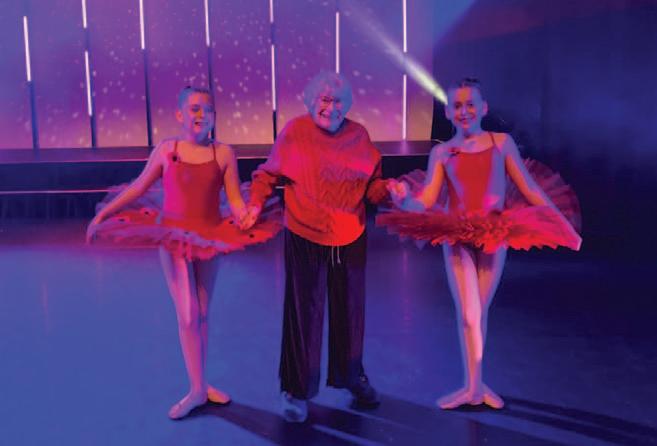
To honour Claire’s incredible legacy and lifelong love of the art form, our Kings Park Team, arranged something truly special. As part of our “Resident’s Wish” initiative, Claire was invited to attend ‘Inspirations’
a dazzling local dance performance featuring a mix of styles including tap, ballet, and modern dance.
Claire had a front row, bird’s-eye view of the entire show and was absolutely mesmerised especially by the youngest ballerinas, some just four or five years old. “They were adorable,” she said. The icing on the cake came after the performance when the kind show organisers arranged for Claire to meet two of the young ballerinas, Fifi and LydiaRose and have a photograph taken with them. This thoughtful gesture truly made her day.
On the way home, Claire couldn’t stop smiling. “I’ve had such an amazing time,” she said,
Jenn May, General Manager at the home, said: “We believe that every moment is worth cherishing, moments like these are filled with emotion and memories and a reminder of how powerful it can be to honour a person’s past and celebrate their passions. We want everyone we care for to know how important they are to us here at Kings
Park. It is testament to the hard work and dedication of the team here in making our residents’ dreams come true. It was wonderful to see how happy Claire was – and the staff loved being a part of this as well.”
Growing training specialist Realise has formed a new partnership with one of the country’s largest independent care providers and developed a bespoke Level 3 apprenticeship for its staff.
Realise’s Health and Social Care division has been appointed by Barchester Healthcare to deliver the Senior Healthcare Support Worker apprenticeship.
Barchester is one of the most respected care providers in the country, with more than 250 care homes from Inverness to Falmouth.
Realise will provide the apprenticeship to colleagues working within Barchester’s complex care and hospital care division, which covers 14 settings.
Realise will also offer other apprenticeship opportunities from Level 2 right through to Level 5.
Angela Kaine, Director of Health and Social Care at Realise, said the collaboration came after the training provider was able to demonstrate how it could adapt the programme for Barchester’s specific needs.
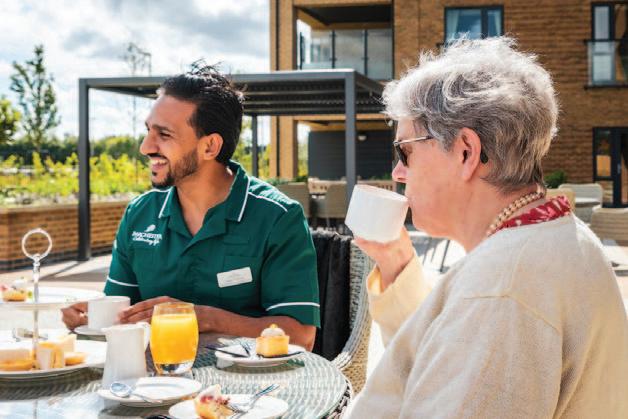
She said: “We are delighted to be entering into a new relationship with a care provider of Barchester’s calibre and reputation.
“The agreement follows in-depth discussions with Barchester’s leadership team where we were able to demonstrate our agility and ability to adapt the programme so that it best serves their employees within the complex care and hospital care division.
“This has meant us working alongside Barchester to create a bespoke curriculum that aligns with the company’s needs, values, language and behaviours.
“Consequently, the programme will have a significantly heightened focus on the mental health pathway,
including crisis intervention, mental capacity and de-escalation techniques.
“We are excited to begin work with Barchester and to be helping the business effectively to address its apprenticeship challenges.”
Realise will offer flexible solutions to accommodate off-the-job training and mentoring within varied shift patterns, including evenings and weekends.
A dedicated operations team from Realise will work on the partnership to ensure high standards of provision and good outcomes.
Other apprenticeships from Level 2 to Level 5 will also be adapted with specific pathways to meet Barchester’s needs.
Members of the Realise management team recently attended Barchester’s Quality First Conference to reinforce the new relationship, understand the business better and allow employees to sign up to the course.
A total of 33 staff are set to enrol on the 18-month Senior Healthcare Support Worker apprenticeship in the coming weeks, with more to follow soon after.
Sarah Clifford, Head of Apprenticeships for Barchester Healthcare said: “From initial meetings and introductions, Realise showed their professionalism from day one.
“They listened to our current challenges, taking them away and sharing a bespoke apprenticeship design to support our career development specifically for our Hospitals and Complex Care division.
“This included a modern innovated style of delivery which was fit for purpose and role specific, with the golden thread of embedding the curriculum in the Barchester way of working.”
For more information, visit www.realisetraining.com
Around 1,700 children are referred to children’s social care services every day in England, underlining the need for an adequate long term funding solution in the Spending Review and a crossgovernment plan to support children and young people.
There were 621,880 referrals to children’s social care in the year ending 31 March 2024.
Almost a quarter of a million (224,520) investigations were also carried out last year to determine whether a child was suffering, or at risk of, significant harm.
Over half of children assessed had abuse or neglect identified as their primary need, with factors around domestic abuse and mental health playing a significant role.
Councils receive referrals from various bodies, but these are primarily from schools, health, and the police.
The Local Government Association, which represents councils, is calling on the Government to ensure all councils receive sufficient funding in the Spending Review to invest in family help, child protection, and child in care and care leaver services.

By having the funding to invest in early intervention, councils will be able to prevent more children from reaching crisis point and requiring more extensive and costly support later on.
It also says government should develop a cross-government strategy for children, young people and families to ensure all partners are working towards a shared ambition.
Children’s social care is one of the biggest cost pressures facing councils.
Rising costs have seen children’s social care budgets increase by 11 per cent to £14.2 billion in 2024/25 compared to 2023/24.
This is driven by rising costs of placements for children in care, largely due to increasing use of residential placements, and the increasing need for specialist support for children with complex needs.
The Independent Review of Children’s Social Care in May 2022 estimated the cost of reforming children’s social care to be £2.6 billion.
With many of the issues that lead to children needing support from children’s social care falling in the remit of other government departments and public bodies, the LGA says a cross-government plan would enable all partners to work together and get the very best for children.
Cllr Arooj Shah, Chair of the LGA’s Children and Young People Board, said:
“Council support for children and young people is central to the delivery of the Government’s mission to break down barriers to opportunity.”
“With investment in children’s social care and partner agencies including mental health provision, we can focus on early intervention and preventing children from reaching crisis point, where the level and costs of support are significantly higher.”
“The Spending Review is an opportunity for long-term, sustainable funding for children’s social care and the services children and families rely on, that puts the sector on a stable footing and provides the support that enables every child to thrive.”
A spokesperson for the Children’s Charities Coalition - Action for Children, Barnardo’s, The Children’s Society, National Children’s Bureau, and the NSPCC - said:
“All children have the right to grow up in safe and happy homes. Yet through our services and networks we are hearing directly about a children’s social care system at breaking-point, desperate for investment in order to respond with the right support at the right time when children are at risk or in need.”
“Frontline workers carry out vital work supporting vulnerable children and families in progressively challenging circumstances.”
“However, with chronic underfunding and councils trapped in a downward financial spiral unable to meet demand, we should not be waiting for children to be in harm’s way before they receive help and we should be giving families the support they deserve.”
“Our latest research shows that council spending on early intervention services has dropped by more than £2 billion (42%) since 2010/11, whilst spending on children’s in residential care has risen to an all-time high.”
“With around 1,700 children being referred to social care every day, and with increasingly complex needs, it’s never been more important that services can match this growing demand and reach families early on before they hit crisis point.”
"We support the Local Government Association’s demand for further funding on top of short-term commitments made recently and echo their calls on the Chancellor to use the Spending Review to invest a minimum of £2.6 billion over four years in children’s social care, in line with recommendations made in Josh MacAlister’s Independent Review.”
This Spring, Recreo VR is offering care homes an exciting opportunity to enhance resident wellbeing through the power of Virtual Reality (VR). By signing up for one of our 24-month Recreo Theatres packages, you’ll receive a free VR headset and staff training.
Our platform provides person-centred, budget-friendly activities that are fun, engaging, and accessible, especially for residents who are bedbound or socially isolated. Co-created with Alzheimer’s Society and individuals with dementia, our service empowers staff to deliver personalised reminiscence and one-to-one sessions that promote memory recall and connection.
Our VR headsets have been recognised as good practice by the Care Quality
Commission (CQC), further validating their impact on care. Regular use of Recreo VR has a proven positive effect on wellbeing, with residents reporting increased activity, engagement, and social connection, often leading to a reduction in the need for PRN medication.
Whether combating loneliness, promoting relaxation, or enhancing cognitive health, VR offers a non-pharmacological solution to enrich care and elevate quality of life. Don’t miss out! Take advantage of this exclusive offer and see how VR can transform your care home experience.
For more information, visit recreovr.co.uk. Or contact us at info@recreovr.co.uk or 01482 526940.
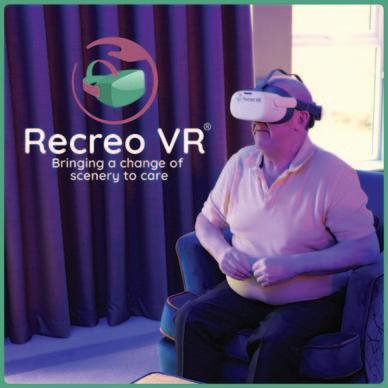
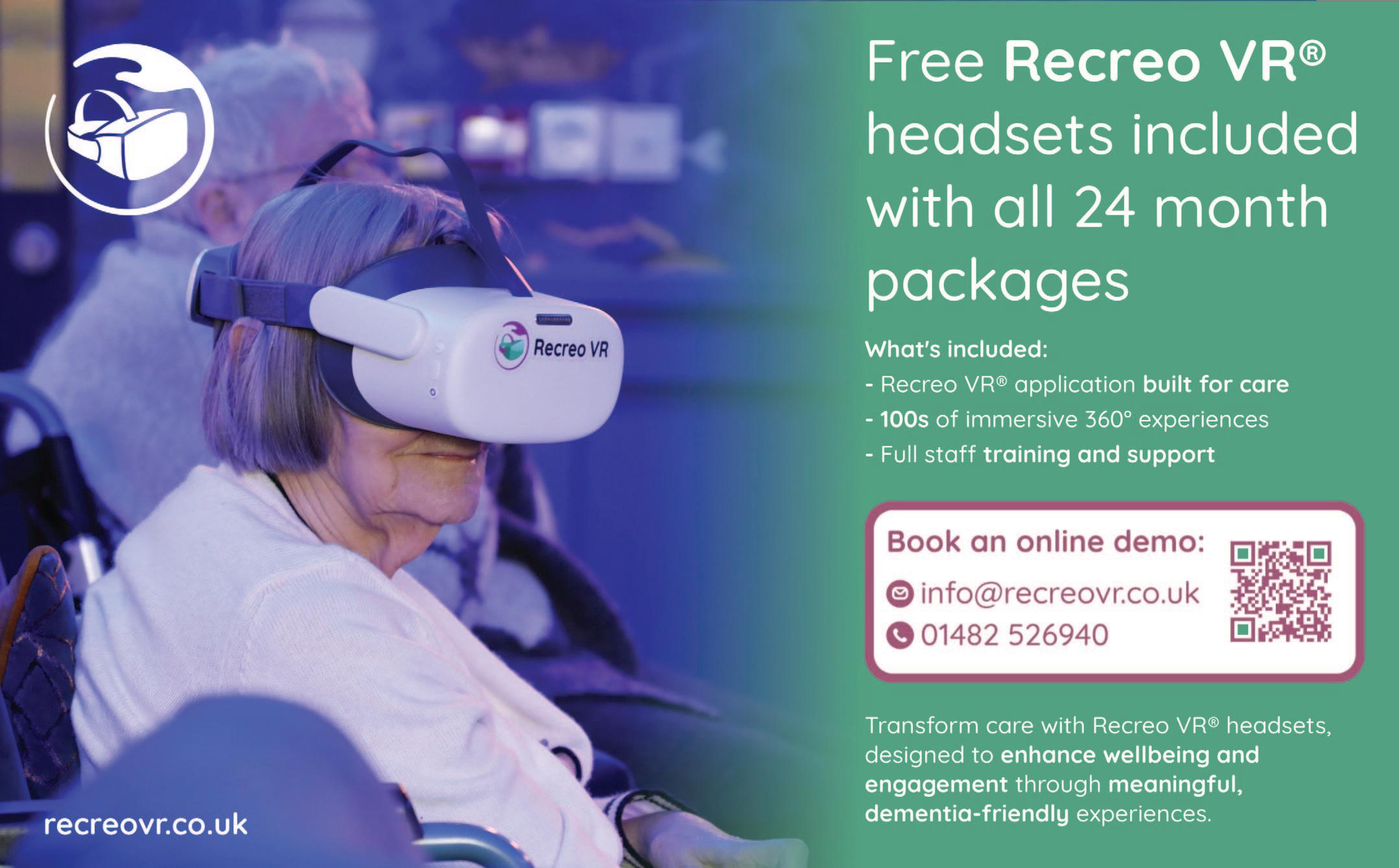
Executive
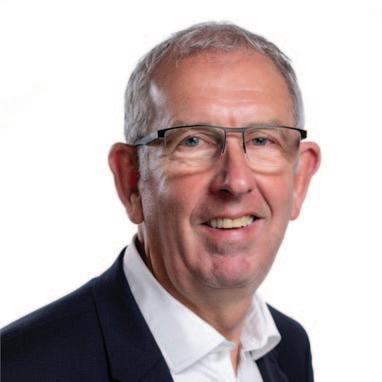
Recognition of the need to transform our NHS is widespread, and while challenges to realising that ambition remain, the success stories of radical innovation are becoming more apparent and the opportunities more abundant.
Healthcare is steadily laying the groundwork for sustained transformation and further innovation, with efforts focused on building an agile, resilient NHS defined by continued modernisation, from software to digital tools and apps, supported by overarching transformation strategies.
More empowered and digitally-literate than ever before, patients expect a natural shift towards greater personalisation, convenience, accessibility, and transparency in how they are able to manage their own healthcare and access support, with tech of course underpinning these expectations.
While we are not going to see an end just yet to the patient who benefits from a more traditional approach to care delivery–– the evolution is well underway, facilitated by telemedicine, wearable devices, AIenabled remote monitoring innovations, and more.
Similarly, the NHS will be expected to accommodate that more tailored approach – both a win-win for the environment and net zero targets due to less travel emissions, and for time-pressured staff who can manage appointments more efficiently and spend more time on direct patient care.
This continuing shift is effectively a mirror of the times with the adoption of more customer-centric, ‘on demand’ practices increasingly prevalent across every sector. Such a decentralised mindset means healthcare being increasingly designed around people, not places. In other words, an ever more integrated and inclusive digital-first healthcare delivery model, helping people to age well and moving from a focus on the treatment of illness to one of prevention and care. It will also serve to reinforce behavioural change, effectively decreasing physical inactivity – a major global health challenge and risk factor for chronic illness and premature death – and heightening adherence to personalised health and wellbeing programmes. Essentially, the benefits become inarguable, such is the sheer weight of evidence which the move towards precision medicine provides. Of course, that decentralisation means a requirement for greater integration of connected digital infrastructure in a safe, secure and sustainable manner in order to realise ambitions.
Despite incredible progress being made in many areas, forwardthinking goals remain frustrated by fragmented systems which do not always align across the country, making digital advancement challenging. That infrastructure is pivotal to future ambitions, however, and the overhaul is a necessity if we are to have the right foundation for fresh solutions to develop to their full potential, while simultaneously bolstering data security.
Certainly, new standards for data sharing, analysis and transparency have emerged, improving trust, driving enhanced efficiency, expanding access, and reducing costs. The NHS must be certain to deliver on that promise.
Just as people are now looking to more personalised, digital innovation to manage their own health, the shift away from the traditional ‘one-size-fits-all’ approach will continue to gradually become a thing of the past across every aspect of care.
Instead – and it is arguably the biggest shift of all – person-centred precision medicine will leverage information about a patient's genes, environment, and lifestyle, to help prevent, diagnose, or treat disease through everything from tailored vaccines and therapies to genetic testing, the aim being to improve how patients are treated, while at the same time generating greater efficiencies and savings.
From the point of view of NHS Scotland partner InnoScot Health, NHS staff will still be the true drivers behind tech innovation – the health service thinkers and doers who use their everyday experiences and insights to identify, develop and integrate new solutions – those originating from within NHS Scotland but also through vital partnerships with industry
Yes, tech enabled transformation can be the next step in accelerating concepts to where innovators want them to go, but enhancing patient outcomes starts with really understanding the inner workings of health and care and so the NHS workforce is vital.
Of course, the primary focus in the here and now is on ensuring that patients receive the care they need as quickly and safely as possible while better managing demand, saving the NHS both time and resources.
Ultimately then, empowering the NHS workforce to develop and integrate forward-thinking solutions remains vital as we work to tackle the challenges facing our health and social care services.
InnoScot Health believes that NHS Scotland staff must not only be completely assured of, and bought into, the benefits of digital transformation, but must become ambassadors for it too, in turn providing an important enabling platform for fresh innovation.
The workforce is absolutely vital to success in integrating best practice digital technologies quickly and effectively across NHS Scotland.
Staff must be fully on board with its benefits in order to put into practice the automation we need to cut down on time-consuming administrative work and inefficient processes, while better integrating services, and ultimately, producing better patient outcomes.
I believe that digital-led change can also promote a fresh, more exploratory mindset – the art of the possible – encouraging creative, transformative thinking, with innovators coming to the fore with fresh possibilities derived from new ways of working.
It represents nothing less than the opening up of a new world of opportunity, particularly with artificial intelligence (AI) and preventative medicine technologies rapidly gaining momentum all the time.
Indeed, Scotland is increasingly seeing AI success stories, such as NHS Grampian piloting a screening tool called ‘Mia’, helping doctors identify small signs of breast cancer that might be missed by the human eye, potentially leading to earlier detection and improved treatment outcomes.
NHS Lothian recently became UK pioneers in introducing an ‘AI
physio clinic’ to patients. The collaboration between NHS Lothian, Flok Health, and the Health Innovation South East Scotland (HISES) Innovation Hub leverages video footage of human physiotherapists to offer a structured, responsive video call for an effective patient experience.
Recent trials saw 100% of patients report that their experience with the AI physiotherapist was "better" or "the same as" what they would expect from a human physiotherapist, while 86% of patients noted an improvement in their symptoms.
Making the best use of digital technologies to improve the care and wellbeing of people in Scotland was set out in Scotland’s first Digital Health and Care Strategy. As part of this, the Right Decision Service (RDS) was endorsed and funded by Scottish Government as the platform for delivery of the national decision support programme.
RDS is a change agent for the delivery of value-based health and care. It brings together evidence from validated research, practice experience, and the lived experiences of patients and service users, embedding this evidence in decision-ready formats through RDS tools such as web and mobile apps and electronic care records.
The ‘Once for Scotland’ source of digital tools enables safe decisions to be made quickly based on validated evidence.
Designed to harness the power of evidence and technology to bring decision-making tools to the fingertips of health and social care practitioners, the service has consolidated different applications, and guidance previously held on paper or intranets, into a single national service which is now delivered by Healthcare Improvement Scotland (HIS).
Working initially in partnership with the Digital Health & Care Innovation Centre (DHI), and now Healthcare Improvement Scotland (HIS), InnoScot Health has legal manufacturer responsibility for calculators, software and tools that are integrated into RDS.
As manufacturer, InnoScot Health draws up a declaration of conformity with the requirements of the Medical Device Directive and applies UK CA marking to the medical device, meaning health and social care staff across Scotland can use the tools with full confidence.
Indeed, a survey of RDS implementation leads across 12 organisations conducted in January 2023 showed that 77% confirmed that RDS tools are enabling better use of available resource; 64% reported that RDS tools are saving staff time; while 62% stated that RDS tools have reduced costs.
Importantly, a further 79% of RDS implementation leads indicated that its tools are already improving patient safety in their organisation; while 74% advised that RDS tools have improved the quality of patient care.
RDS is an exemplar of forward-thinking, collaborative efforts and has delivered measurable impact across the health service, recognised by the 2022 Digital Public Services Award at Scottish Public Services Awards hosted by Holyrood Communications in partnership with the Scottish Parliament, and Scottish Government.
In 2025, we are still at the start of the transformation journey in many ways, but nevertheless, it is the start an exciting time in healthcare, with tech facilitating a digital environment which is increasingly bringing services, staff, and patients together.
HC-One’s Bluebell View Care Home in Oswestry, Shropshire, has been opening its doors to children at a local primary school to encourage people from across the generational divide to come together to celebrate Global Intergenerational Week. Bluebell View have been bridging the generational gap by welcoming in children from Moreton Hall Primary School, as it celebrated Global Intergenerational Week, which ran between April 24 and 30. Children from Moreton Hall Primary School were invited along to the care home to build relationships with some of its elderly residents at Bluebell View Care Home.
The care home highlighted the importance of sharing life stories between those young and old. The special week emphasised that experiences can be celebrated with each other, no matter how old you are.
The celebrations involved residents at Bluebell View and children from Moreton Hall Primary School making and exchanging friendship bracelets. The home often hosts visits from Moreton Hall Primary School who are aged between eight and nine years old for their regular stay and chat sessions, which unites the different generations together. Michelle Middleton-Price, Bluebell View Care Home Manager, said:
“It is lovely to see these relationships developing. We are thrilled with the nurturing of friendship which is emerging between the youngsters and our elders here at Bluebell View.
“It’s heart-warming how kind and thoughtful the children are, and we are looking forward to seeing how this progresses."
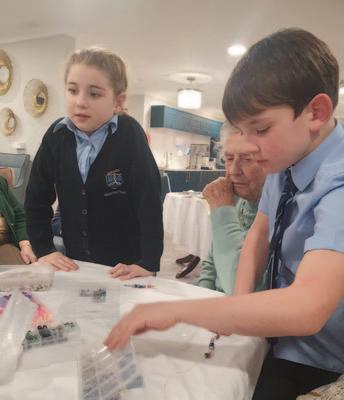
A groundbreaking new documentary exploring the humanity and joy of life in a care home is embarking on a nationwide tour this spring. CARE, a film focusing on the day-to-day lives of care home residents and workers is set to be released later this month as part of a UK wide, multi-city screening tour.
The tour, which kicks off this April as part of #CelebratingSocialCare Month, will see the film premiered at cinemas and universities across the country, as well as a special online event
Filmed entirely by the staff at a North East care home as it emerged from the COVID-19 pandemic, CARE gives a glimpse into the dedication and compassion of the workers that look after some of the most vulnerable and often overlooked people in society.
As well as giving a unique and emotional insight into the lives of care home residents and workers, CARE also raises important questions about how we as a society value older people and those who care for them, and whether there is adequate support for those who bring such commitment and heart to residential care.
The film was produced by Newcastle University, in association with Tongue Tied Films, released with the support of the ESRC, and in part-
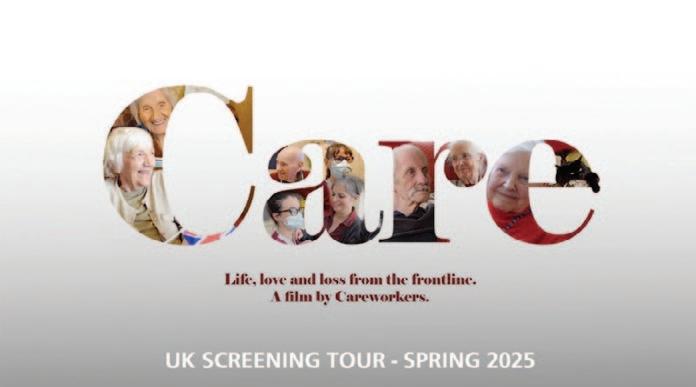
nership with Community Union, British Gerontology Society, Care England and Cosmic Cat Films. The release of CARE is supported by an ESRC IAA grant and Newcastle University.
Alastair Cole, director of CARE, commented:
“CARE began as a response to the pandemic, and out of frustration at the overwhelmingly negative representation in the media of residen-
tial care in the UK. This was heightened at a time when care home staff, residents and their families were at the coalface of the global crisis.
As a project team, we wanted to bring together our backgrounds in gerontology, media and filmmaking, to try and find a way to work with some of the remarkable staff and residents to help tell another side to this story.
“We knew as soon as the remote camera workshops started we were incredibly fortunate to have found such a brilliant and enthusiastic team to work with in the home. Then when their footage started coming in, it was clear they had a very important story to tell.”
The film’s release, which comes five years after the start of the pandemic and subsequent lockdowns, aims to shine a light on not only the commitment of care staff but the realities of working in a sector that is often overlooked and underfunded.
The film also comes in the wake of the news of the UK Government’s planned care commission and reforms, which are not due to begin until 2026 at the earliest.
To find out more about screenings near you, go to www.carethefilm.com
We are thrilled to announce that THE CARER will be producing a special digital supplement to commemorate Victory in Europe Day (V-E Day) on May 8. This historic occasion marks the unconditional surrender of Germany’s military forces to the Allies in 1945, bringing an end to the conflict in Europe during World War II.
Over the years, we have been honoured and privileged to share incredible stories from care homes and their residents from across the UK—stories of heroism, resilience, and dedication from residents who served our country in times of conflict and need. From D-Day to Remembrance Sunday, awards and honours these personal recollections have been a
testament to the courage and sacrifices of a remarkable generation.
To mark this momentous anniversary, we are calling on care homes to send in as many resident stories as possible, accompanied by photos, to help us create a bumper V-E Day supplement. Whether it’s firsthand memories of May 8, 1945, stories of service, or reflections on what V-E Day meant to them, we would love to share and celebrate these treasured accounts.
Submit your resident stories and photos to veday@thecareruk.com
Let’s come together to honour and preserve the legacy of those who witnessed this historic day.

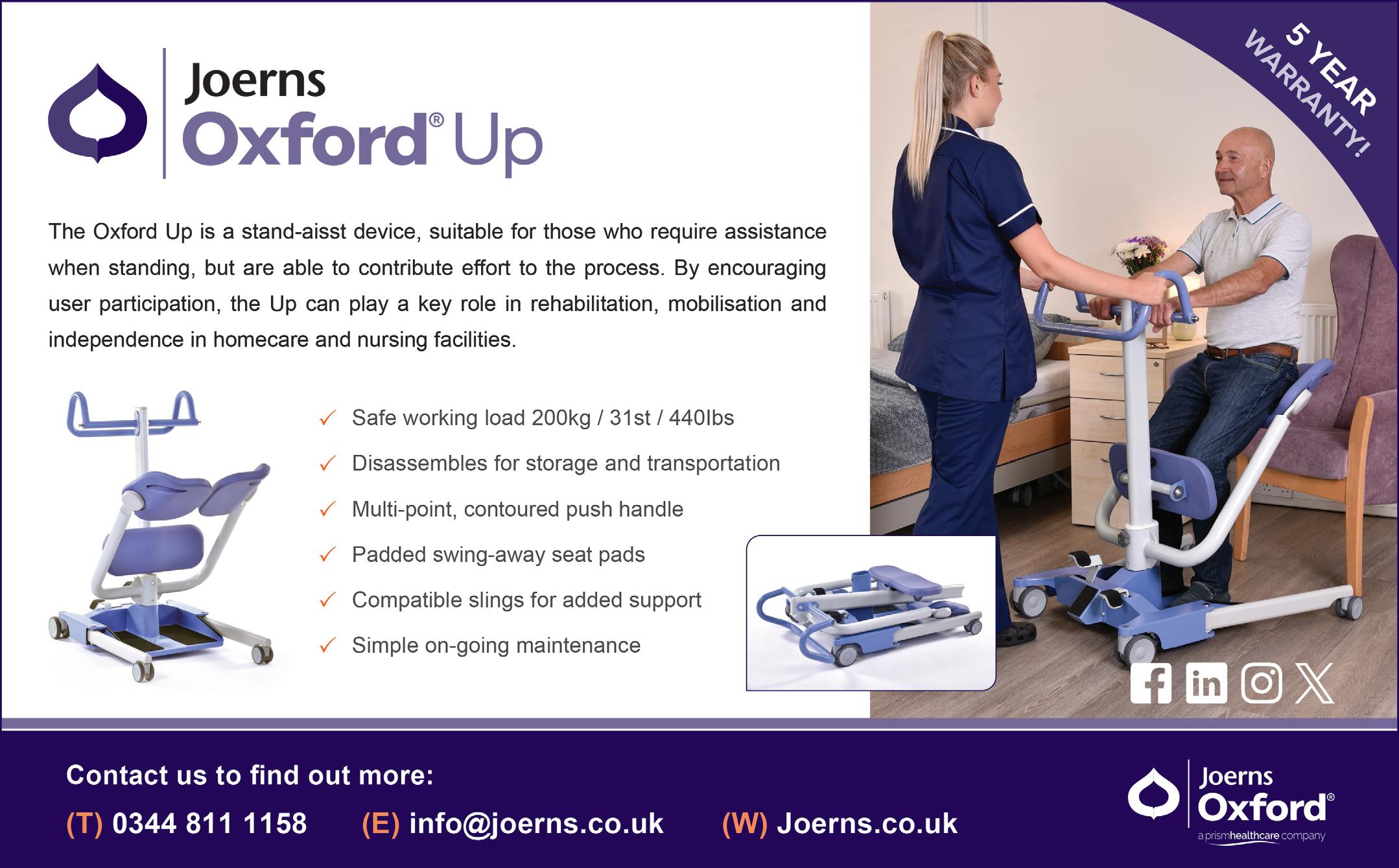
The International Council of Nurses (ICN) has launched a landmark report warning of a deepening crisis in the wellbeing of the global nursing workforce and providing compelling evidence for urgent investment in nurses to improve health outcomes, strengthen economies, and build more resilient societies.
ICN says the report and survey launched ahead of International Nurses Day (IND) 12 May, provide concrete evidence of both the depth of the crisis in nursing and the solutions. ICN, the global voice of nursing, says International Nurses Day this year should be both a celebration of nurses but also a rallying cry for action based on the new evidence from the report and survey.
The survey, authored by the Rosemary Bryant AO Research Centre, Assessing the Global Sustainability of the Nursing Workforce: A Survey of National Nurses’ Association Presidents, collects firsthand reports from 68 NNAs on trends in the stability and sustainability of the nursing workforce between 2021–2024. ICN’s IND2025 report Our Nurses. Our Future. Caring for Nurses Strengthens Economies provides further evidence of the strain many nurses are experiencing due to chronic underinvestment and presents evidence-based solutions for strengthening nurse wellbeing as a path to population health and economic productivity.

‘The survey results also underscore a failure to protect nurses’ safety. A shocking 86.2% of nurses’ associations reported experiences of violence from patients or the public, yet a third of countries had no policies in place to protect nurses from workplace violence. Our IND report highlights how direct attacks on nurses and healthcare workers in conflict settings have also dramatically increased.
‘This situation is unacceptable and untenable. We must take urgent and decisive action to put nurse wellbeing at the centre of health systems and enable nurses to provide essential care, support thriving populations and economies, and advance Universal Health Coverage and the Sustainable Development Goals.”
ICN’s CEO, Howard Catton, noted that despite mounting evidence of the nursing workforce crisis , many leaders and decision makers continue to make the wrong choice by prioritizing short-term solutions over the sustainable investments needed to address the root causes of the health workforce emergency.
ICN’s President, Dr Pamela Cipriano, said: “The publications we are launching today show that many of the world’s nurses are at breaking point, pushed into burnout and facing enormous physical, mental, and emotional pressures. Unacceptable working conditions, inadequate compensation, and a failure to protect nurses from workplace violence and occupational hazards or provide opportunities to advance and practice at full scope are driving this crisis, which affects not only nurses but the health of entire populations.
‘The current nursing shortage is a global health emergency, and it is only exacerbated by the failure to retain nurses or attract new nurses to the profession as highlighted in these reports. Our survey of NNA Presidents’ is a litmus test for the lived experiences of the world’s nurses, and it reveals concerning trends in workforce sustainability. Almost two thirds of respondents described demands on nurses increasing since 2021, while almost 40% rated their country’s capacity to meet healthcare needs as poor or very poor, pointing to widening gaps between supply and demand. Nursing salaries have stagnated, which often means a decrease in real terms when we take inflation into account.
He commented: “We are used to nurses safeguarding society from catastrophic health outcomes when disaster strikes, just as airbags deploy to protect us in a collision. But without immediate action to invest in and care for our nursing workforce, we risk a dangerous future where no airbag will inflate, where we won’t have nurses to come to the rescue when we need them most. Recent developments such as US funding cuts to education, health, and international aid only adds to this risk.
‘ICN calls on the world’s leaders to hold firm in their commitment to health priorities and deliver meaningful action by urgently investing in nurses and in health. We have clear evidence that supporting and caring for nurses is not a cost: it is a smart and strategic investment in the health and prosperity of all people, with the total potential value of initiatives to improve nurses’ wellbeing is estimated at $100-300 billion based on capturing lost workforce productivity alone.
‘ICN has continually provided concrete roadmaps for policy action and our #IND2025 report includes a new advocacy tool, the new Caring for Nurses Agenda for Sustainable Workforce Well-being, which builds upon our foundational Charter for Change and sets out the interventions needed to protect nurses’ wellbeing and maximize their contributions to health systems and societies.”
The weather didn't dampen the spirits of a Northamptonshire home as they managed to raise hundreds during their spring fayre. MHA Rushden Park held their spring fayre which was attended by more than 100 people.
There were plenty of stalls and activities to keep guests entertained as well as refreshments including cakes, hot dogs and mocktails.
It was a real intergenerational event with a good mix of young and old, and the staff at the home really rallied round in making sure the event was a success.
The final amount raised was £942.81.
Speaking after the fayre, Shannon Sargent, activity coordinator said:
“The weather wasn't the greatest which meant we had to pack up a few of the stalls earlier than expected, however it was still a good day.
“The majority of the fayre was indoors, apart from the barbecues and
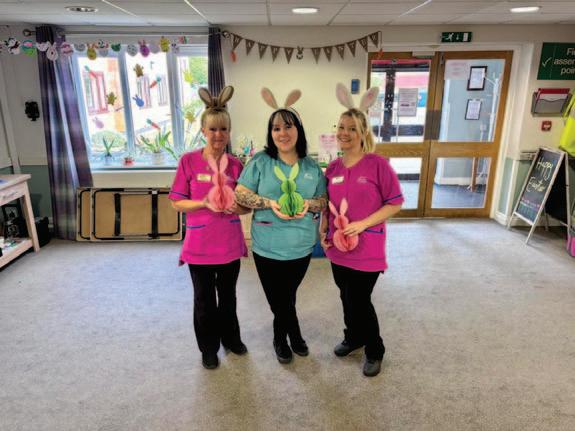
some of the stalls.
“Everyone had a great time, the home was full of people throughout the day.
“All in all, the fayre took around a couple of months to plan, but it was worth it.
“To reach the figure we did is really impressive, and I want to thank everyone for their support on behalf of all of us at MHA Rushden Park.
“We received some great feedback from visitors and family members of residents.
“The residents had a great time, they really got stuck in and were asking when we would do this again.
“For the funds raised, we are expecting to do a poll and ask our residents what they would like to do with the money.
“Again, I would like to thank everyone for their generosity and support, it was a real team effort.”
The red carpet was rolled out for adorable Charlie the donkey when he joined a Bristol care home event to help raise cash for charity.
Charlie, who starred in the film Nativity alongside actor Martin Freeman, helped raise funds for charity Pets As Therapy during the day of fun at Lovell Place Care Home, Sparrowbill Way.
Residents invited the adorable superstar and his friends from the 2nd Chance Petting Farm, Frome, to join their community Easter fun day and bring cheer to the crowds.
Everyone was amazed when
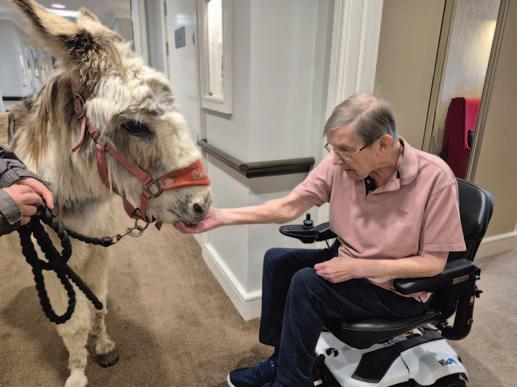
“Although I am not sure how many calls he took!”
Pets As Therapy is a national charity that supports volunteers who visit hospitals, nurseries, hospices, and care homes with their friendly pets.
Lovell Place Wellbeing & Lifestyle Coach Vicky Green said: “A big thank you to everyone who came along on the day and enjoyed petting the animals.
“We had a lot going on, and it was wonderful to welcome our superstar, Charlie.
“Our regular therapy dog Duke brings a lot of joy to residents here, so we know first-hand what a difference animals can make to helping us cope with all kinds of things in our lives.
“Charlie was a wonderful guest, and we were pleased so many people got a chance to meet him.”

We offer high-quality residential, nursing, dementia and respite care in a welcoming and engaging environment. Arrange a visit to discover comfort, companionship, and expert care.
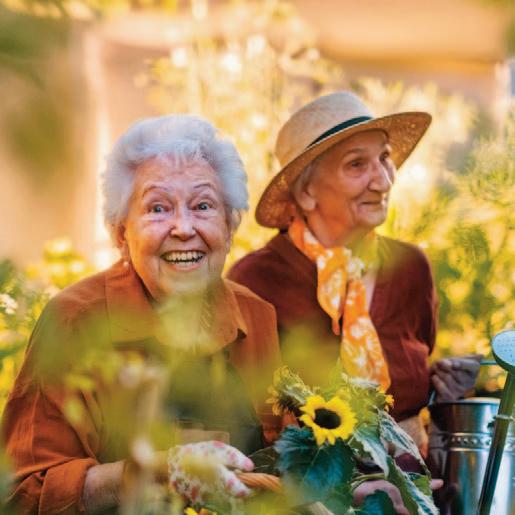
It costs a business an average of more than £30,000 to replace an employee - approximately £25,000 in lost productivity, £3,600 to recruit temporary workers to cover the role before the new hire starts, £750 in managerial time spent interviewing candidates, £450 in recruitment agency fees, £400 in advertising the job role, and £200 in HR time spent on admin tasks related to the hiring process.
With this in mind, the experts at RotaCloud – workforce management software for growing businesses – have shared tips to increase employee retention and reduce staff turnover for 2025.
Firstly, when looking at what impacts employee retention, these can be split into ‘push’ and ‘pull’ factors. Joel Beverley, co-founder at RotaCloud explained: “Many elements contribute to staff retention… for example, ‘push’ factors drive your employees away from your business to look for work elsewhere, whereas ‘pull’ factors are external influences that tempt an employee to apply for work elsewhere.
Examples of ‘push’ factors include:
• Poor management
• Bullying, discrimination or unfair treatment
• Lack of communication
• Small (or non-existent) pay rises
• Excessive workload or lack of work-life balance
• Examples of ‘pull’ factors include:
• An offer with a higher salary or improved benefits
• The opportunity to gain skills or land a dream job
• Family obligations - spouse gets a new job, the need to move house, ageing relatives etc.
• The desire to start a new career
Beverley added: “Despite the challenges, certain ‘push’ factors are

certainly within your control… By holding exit interviews and understanding the push factors contributing to an employee's decision to leave your company, you can quickly understand the source of your turnover problems. You can even implement ‘stay interviews’ for those still in the business for some insight into areas of improvement.
“However, it is also worth noting that, for SMEs, there are other potential barriers to tackling staff turnover to keep in mind, including: the relative importance of a single staff member; lack of promotion opportunities; time and cash flow restraints; limited employee benefits; and financial uncertainty”.
By analysing its first party data* for over 4,000 accounts, RotaCloud can also reveal which demographics were most likely to quit their jobs in the last year. By comparing staffing figures from January 2024 to December 2024, the data highlights both industry-specific and locations-based trends.
2024 staff turnover rates by industry group, ordered from highest to lowest:
• Hospitality / Catering - 38.7%
• Entertainment / Leisure - 29.1%
• Retail - 25.2%
• Professional Service / Public Service - 24%
• Other - 21.3%
• Healthcare / Medical - 20.9%
• Technology / Software - 18.7%
Looking at sub-sectors, the data showed that councils and public authorities (11.3%), optical (12.2%), SaaS (12.3%), GP surgeries and primary care (13.8%), and hospitals and hospital departments (14.6%) were the most successful at keeping their staff turnover low in 2024.
James Lintern, co-founder at RotaCloud commented: “Losing 15% of your employees a year is considered a ‘healthy turnover rate’, and anything below that is a bonus. However, in industries like hospitality and retail, 25% may be a more realistic figure to aim for. Within hospitality, our data shows the highest staff turnover rate in 2024 was for those working in bars and clubs (47%). This drops to 43.2% for quick service restaurants (fast, casual), 39.1% for restaurants and cafes, 34% for catering and events, and 30% for delis and bakeries.
Lintern continued: “Whether it’s recruitment, engagement, pay, personal development or the working environment that's letting you down, making some small changes can quickly improve retention rates".
For more information on improving employee retention, visit https://rotacloud.com/blog/reducing-staff-turnover-the-ultimateemployee-retention-guide-for-smes/
A long-serving healthcare assistant has reflected on her four decades working at a nursing home in Caterham and said “every day is a blessing”.
For 40 years, Rose Arney has been supporting residents at Tupwood Gate Nursing Home, on Tupwood Lane, ensuring quality of life for those in need of support.
As well as holding the hands of those receiving end of life care, she has also supported others to become well enough to return home or enjoy years of living as independently as possible at the home.
For Rose, it was a profession she fell into for “convenience”, and one she initially intended to be short term-only.
“I was working in an office before I had my Daughter, but it wasn’t fulfilling me. I needed something more.
“A position came up as a Healthcare Assistant at Tupwood Gate, then known as Surrey Hills Clinic, for the night shifts and I thought ‘I’ll give it a go’.
“It suited us as a family because my husband could look after our daughter during the night, and I could be the best mum possible during the day and still manage things like the school runs.
“I certainly didn’t envisage I would be doing the job for 40 years or more but I simply fell in love with it.
“I didn’t particularly like nights because you came in, put the residents to bed and that was it. Whereas during the day, you get them up, you spend
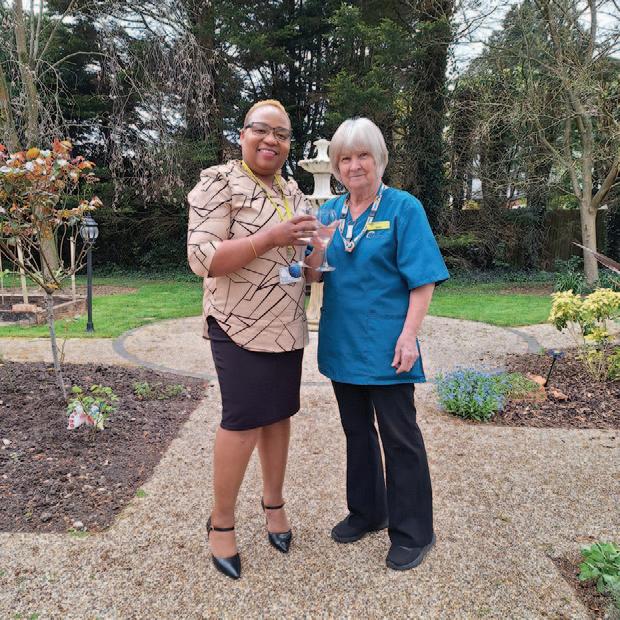
time with them and really get to know them. You’re getting the whole picture. When I started day shifts, it really ignited my passion and love for the job. I’ve never looked back.”
Rose said one of her strongest qualities required for the job is patience, something she prides herself on.
“I’ve got a lot of patience and sometimes, even with our more challenging residents, I can see that they’re not meaning to be. They are just frustrated and you have to coax them round and bring them out of themselves.
“I’m also very caring. When a family member thanks you for being there and supporting their loved one, it makes you feel really good.”
One of the highlights of Rose’s career was in 2011 when Tupwood Gate achieved Gold accreditation with the Gold Standards Framework, followed by platinum accreditation in 2021. The GSF supports and enables front line staff teams to provide a gold standard of care for individuals who are nearing the end-of-life.
“Working in this job, it really makes me appreciate a lot more now. It has made me a better person, I’m definitely more empathetic to the needs of other people.
“I plan to retire in a couple of years but I have a lot more moments to soak in before that happens.” Said Rose.
Celebrations have been in full swing at Elgar Court Care Home, as one of its residents reaches her centenary in style.
Alice Foulkes was joined by family, residents and staff as she received a telegram from the King in recognition of her landmark birthday. Alice wanted a quieter birthday this year, to enjoy a relaxed time with her family and residents and with her favourite tipple, a Baileys and her favourite custard tarts!
Alice said, “I can’t quite believe I am 105 years old today, it’s just another day to me!” Alice started her day with her usual tropical fruit platter along with the Housekeepers, Hannah, Jess and Head Housekeeper, Sarah, singing happy birthday to her. Later that afternoon, staff and residents came along to wish her a very happy birthday too and bring her gifts.

Sarah Cadwallader, General Manager at Elgar Court said, “We’re delighted to be celebrating a truly remarkable lady as she reaches another amazing milestone. Alice is such a popular resident who always has an interesting tale to tell and a dry sense of humour – we look forward to hearing many more as she breaks into her next century.”
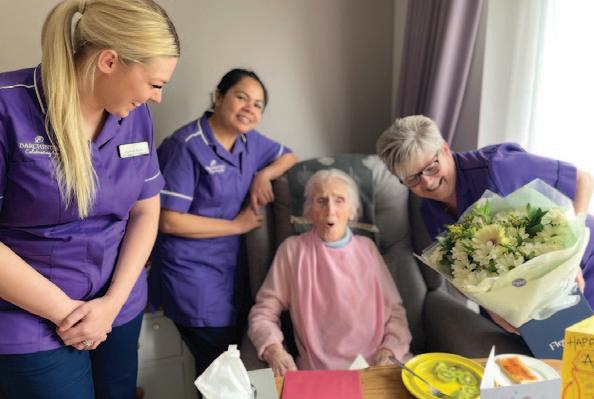
Residents at Linden House care home in Epsom, part of Wren Retirement Living, were recently treated to a truly enchanting afternoon, as the soothing sounds of the flute filled the home.
Talented flautist Oli Cavadino, who has a music degree from New College Oxford and was principal flautist for the Oxford Festival Orchestra, gave a special performance, delivering a selection of classical and popular pieces that delighted everyone in attendance. The serene tones of the flute created a calming atmosphere and brought smiles to many faces.
The event was a reminder of the powerful role music can play in enhancing wellbeing, sparking memories, and creating a shared sense of joy. Whether it’s a familiar melody or a new piece, music has the ability to uplift, soothe and connect people of all ages.
Pip Lewis, activities coordinator at Linden House, said: “Music has such a wonderful effect on our residents. Oli’s performance was absolutely beautiful – it created a truly magical moment that brought everyone together. It’s always lovely to see how music can light up a room and touch hearts in a way that words sometimes can’t.”
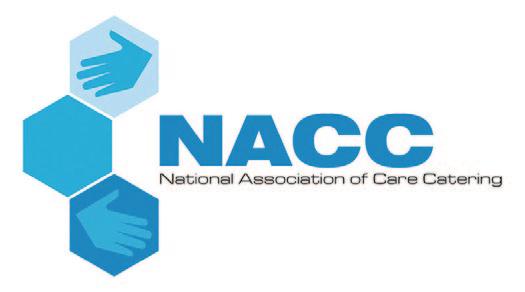
The NACC National Awards 2025 are officially open for entries with a deadline of Monday 30th June 2025. The judges will be looking for examples of innovation, excellence and dedication that create tangible benefits for residents, clients and colleagues in the following categories:
• Care Establishment of the Year Award, sponsored by allmanhall
• Meals on Wheels Award, sponsored by apetito
• Catering Team of the Year Award, sponsored by Rational UK
• Catering Manager of the Year Award, sponsored by Unilever Food Solutions
• Our Care Catering Hero Award, sponsored by Miele
• Region of the Year Award, sponsored by Meiko UK
• The Bev Puxley Award, sponsored by the Worshipful Company of Cooks London
The shortlist will be announced in August, with the winners being honoured later in the year* at a gala awards dinner where the recipients of the Pam Rhodes Outstanding Achievement Award, sponsored by Winterhalter and the National Chair’s Award will also be revealed.
The NACC Awards 2025 nomination brochure with full category details and entry requirements can be

downloaded at https://bit.ly/NACCAwards25
Neel Radia, National Chair of the NACC, comments:
“These awards are always about recognising excellence, innovation and dedication within care catering. Each year they represent a highlight of our year as we gather together to celebrate so many individuals and teams that have gone that extra mile throughout the last twelve months.
“The NACC will continue to shine a light on the social care sector that is often undervalued.
Everyone within our care has a right to receive good care which must include access to good nutrition and hydration as well as a safe environment in which to live. The current pressures on budgets continue to represent significant challenges in social care but our members, continue to rise above these challenges, through perseverance, dedication and with an innovative mindset.
“The Training and Development Forum is the ideal place to showcase excellence, so I very much look forward to coming together with members, colleagues and friends at the NACC TDF and annual Gala Dinner of recognition on the 1st and 2nd October in Nottingham, where we share the exceptional achievements within our sector and the teams and individuals that encapsulate the very best of the best. I would encourage anyone and everyone to enter the NACC Awards 2025 and ensure that the hard work and brilliance of their team members does not go unrecognised.”
Entry to the NACC National Awards is open to all members of the NACC. For more information about how to become a member visit www.thenacc.co.uk
• We specialise in the sale and purchase of quality used wheelchair accessible vehicles and ambulances.
• They can be bought as seen or refurbished and sign-written to your own requirements.
• Fully serviced, new mot & warranty
• Engineers inspection supplied if required.
• Free delivery service available
• All buses comply with new legislation
• Lease hire and purchase available
• Always large stock of accessible vehicles



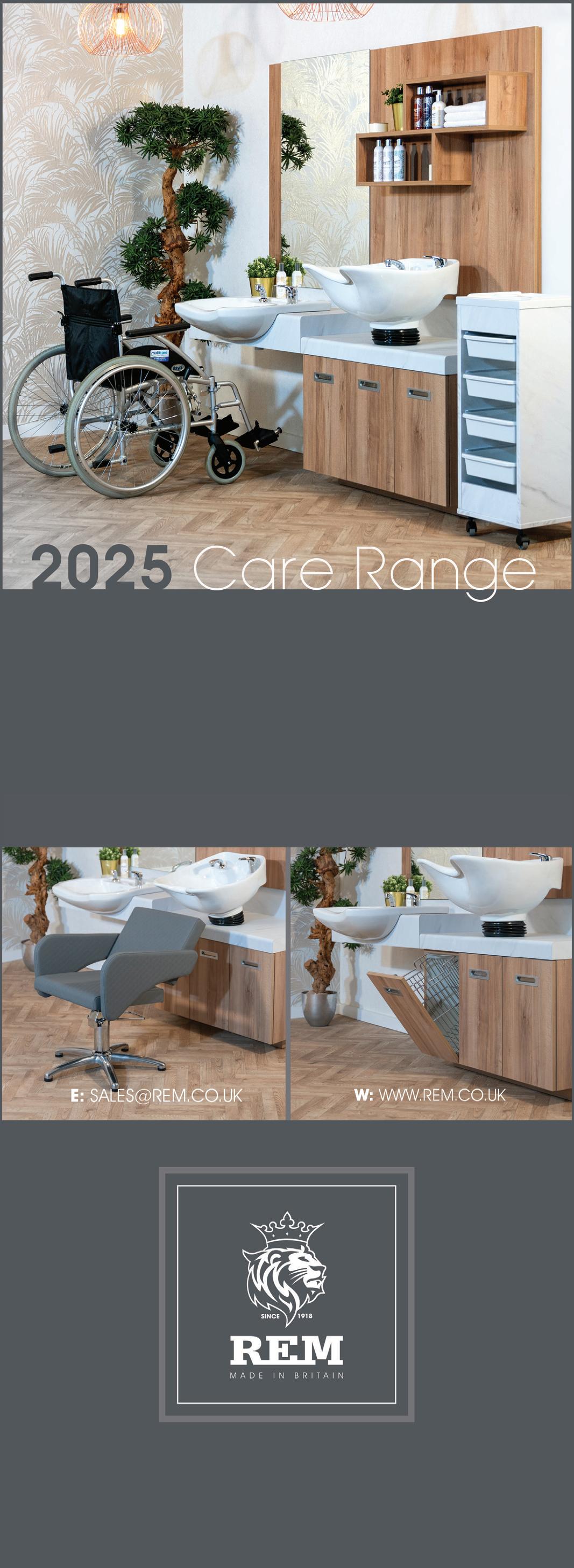
REM have been manufacturing furniture for the Hair & Beauty Sector for over 100 years and are now considered to be one of the largest manufacturers in both the UK & Europe. Understanding the growing requirement for Care & Residential Home Salons, REM’s Design Team have produced the Pendle Care Range for the Small, Compact Care Home Salon.
The outstanding work of a pioneering care organisation that’s celebrating its 40th anniversary is an example to the rest of Wales, says a Welsh Government Minister.
The glowing praise for Pendine Park came from Dawn Bowden MS, the Minister for Children and Social Care during a tour of Pendine Park’s Highfield nursing home in Wrexham during a visit to North Wales.
Owner Mario Kreft MBE showed the Minister around the site where she met staff and residents and enjoyed some of the activities taking place, including a music concert.
The visit comes as Pendine Park celebrates four decades of success, having started in a small way when Mario and his wife Gill opened their first care home in 1985.
Since then, the Pendine Park organisation has grown to have nine care homes in Wrexham and Caernarfon with a total of 440 beds and 860 members of staff.
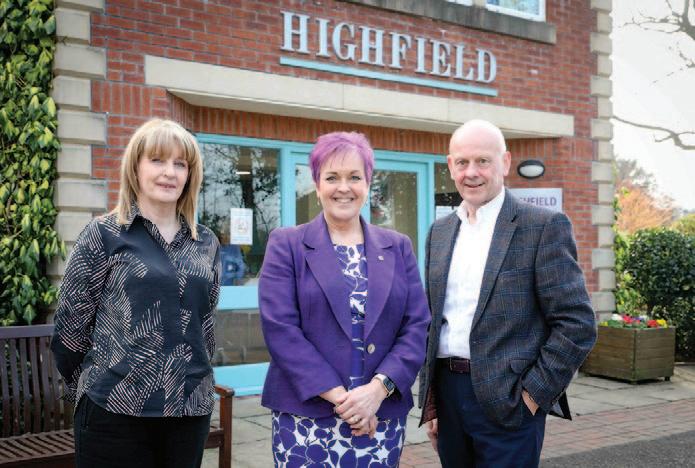
Mario is also a leading advocate for the social care sector, founding both Care Forum Wales, which represents around 500 independent providers, and the Wales Care Awards, to recognise frontline care workers.
Dawn Bowden said she was delighted to have a chance to visit Highfield Nursing Home to see for herself the work staff carry out, and also to have a chance to discuss challenges facing the social care sector with Mario.
She said: “The visit has been great and I have met with Mario a couple of times now.
“His dedication and his enthusiasm to what he is doing is incredible.
“What I was very keen to see was in practice the kind of care homes that Mario has built which really fits the model of what we are trying to achieve in social care.
“I see Mario and Gill’s homes as being held up as an exemplar of what we want to see in social care.
“It has been great to be able to jump in on this 40th anniversary year, and I got treated to some musical entertainment at the same time, which was great.
“It has been interesting to listen to Mario talk about different types of care settings that he has.
“There are various different settings but all with the same ethos, and I think that was the thing that has impressed me more than anything, and it’s all driven wanting to provide the best care for some of the most vulnerable people that we need to look after.”
Ms Bowden took on the social care remit in September last year and praised the workers involved in the sector.
She said: “What has impressed me the most is the absolute dedication of the people who work in the sector.
“Some of these people are the lowest paid in our public services and we are trying very hard to do something about that.
“We introduced the Real Living Wage in Wales for social care workers about three years ago because we recognised the need to be able to recruit and retain the best that we could in the social care sector.
“What I want to see is that we really do get to a parity of esteem with NHS colleagues.
“I don’t think what people do in the social care sector is appreciated enough and that needs to be recognised.”
Highfield’s manager Tracey Smith, who has worked at the site for 25 years, said she was pleased to have the chance to show the Minister around the home.
Tracey said: “It’s always nice to be able to show people what we do here and for them to see the work the staff do.
“The staff want to look after people and they work hard and they care about the residents, they put the residents first.”
Edinburgh Rugby rolled out the red carpet for residents and colleagues from HC-One Scotland’s Murrayfield House Care Home to provide an unforgettable day of connection, excitement, and appreciation for the social care sector.
Edinburgh Rugby’s Engagement Team, dedicated to honouring the tireless efforts of emergency services, NHS staff, and social care workers, invited Murrayfield House residents and colleagues to an exclusive experience at the team’s open training session.
16 Murrayfield House residents soaked up the electric atmosphere as they watched the Edinburgh Rugby team gear up for their clash against the Dragons. This included Marion Milligan, Margaret Robertson, George Paterson, Gertrude (Trudy) McPherson, William Walker, Elaine Hardie, Rev Hamish Walker, William Banyard, Shelagh

Robertson and others.
The residents didn’t just spectate – they mingled with the players, swapped stories, and felt the buzz of anticipation for their next match.
As a grand gesture, Edinburgh Rugby gifted free tickets to the Friday, March 28, allowing nine residents and seven colleagues to cheer from the stands, their voices joining the roar of the crowd.
Fiona Truesdale, HC-One Scotland’s Murrayfield House Care Home Manager, said:
“We are so grateful to the Edinburgh Rugby team for their warmth and generosity. Our residents were thrilled to meet the players, and it was a truly uplifting day for everyone involved. The smiles, stories, and shared moments will be remembered for a long time.”
Residents and staff at a North Wales care home enjoyed nothing but the best when they were served up a tasty tandoori treat.
For the feast of food plated up at Pendine Park’s Bryn Seiont Newydd care home in Caernarfon didn’t just come from any Indian restaurant – it came from the best one in Wales.
The delicious delights were served up hot from the kitchen at the Caernarfon Tandoori Restaurant in the town.
And, as curry fans will know, the Caernarfon Tandoori Restaurant was named the best Indian restaurant in Wales at a glittering ceremony earlier this year.
That triumph is the second year in a row the restaurant has won the award.
With the restaurant’s manager Fahim Bin Ferdous having a second job as a care worker at the care home, dishing up some of the restaurant’s fabulous fare seemed a great way to celebrate its continuing success – and to give residents a unique treat.
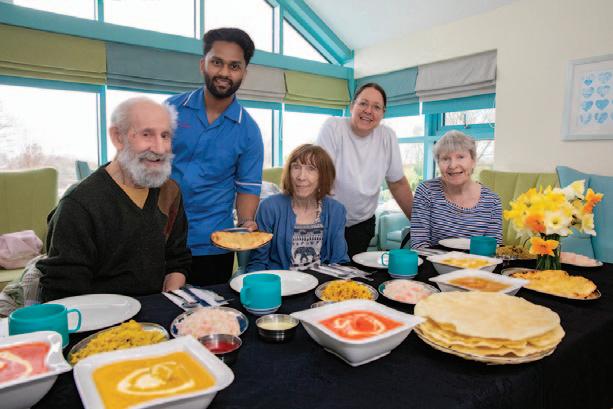
Residents and staff were treated to a variety of delicious Indian food as Fahim arrived with a huge selection of some of the restaurant’s most popular meals.
Among the dishes were chicken tikka masala, butter chicken, vegetarian korma and chicken tikka korma along with a variety of rice dishes.
And to ensure everyone enjoyed the full delights of an Indian meal, Fahim also brought naan breads and
poppadoms and chutneys.
The clearly impressed the residents who gave it a go.
Fahim, 23, said he was delighted to have the chance to impress the residents he cares for with some of the great food from the award-winning restaurant where he works.
And he said he was thrilled the restaurant had retained its best in Wales title.
Fahim said: “We are very proud to have the title of best restaurant, and to have it back to back.
“And I must thank our customers for supporting us.
“We have many regular customers, we are packed on Friday and Saturday nights, and know them by their first names, and they know us by our first names.
“I love being able to bring the restaurant’s food to the care home, it’s a special thing to do and everyone seems to have enjoyed it.”
Home manager Sandra Evans said the staff were always pleased to be able to offer the residents something special.
She said: “We like to spoil our residents and to have food from the best Indian restaurant in Wales here for them to enjoy is wonderful.
“Fahim and all our staff do everything they can to help and support our residents all the time and treat them to special occasions.”
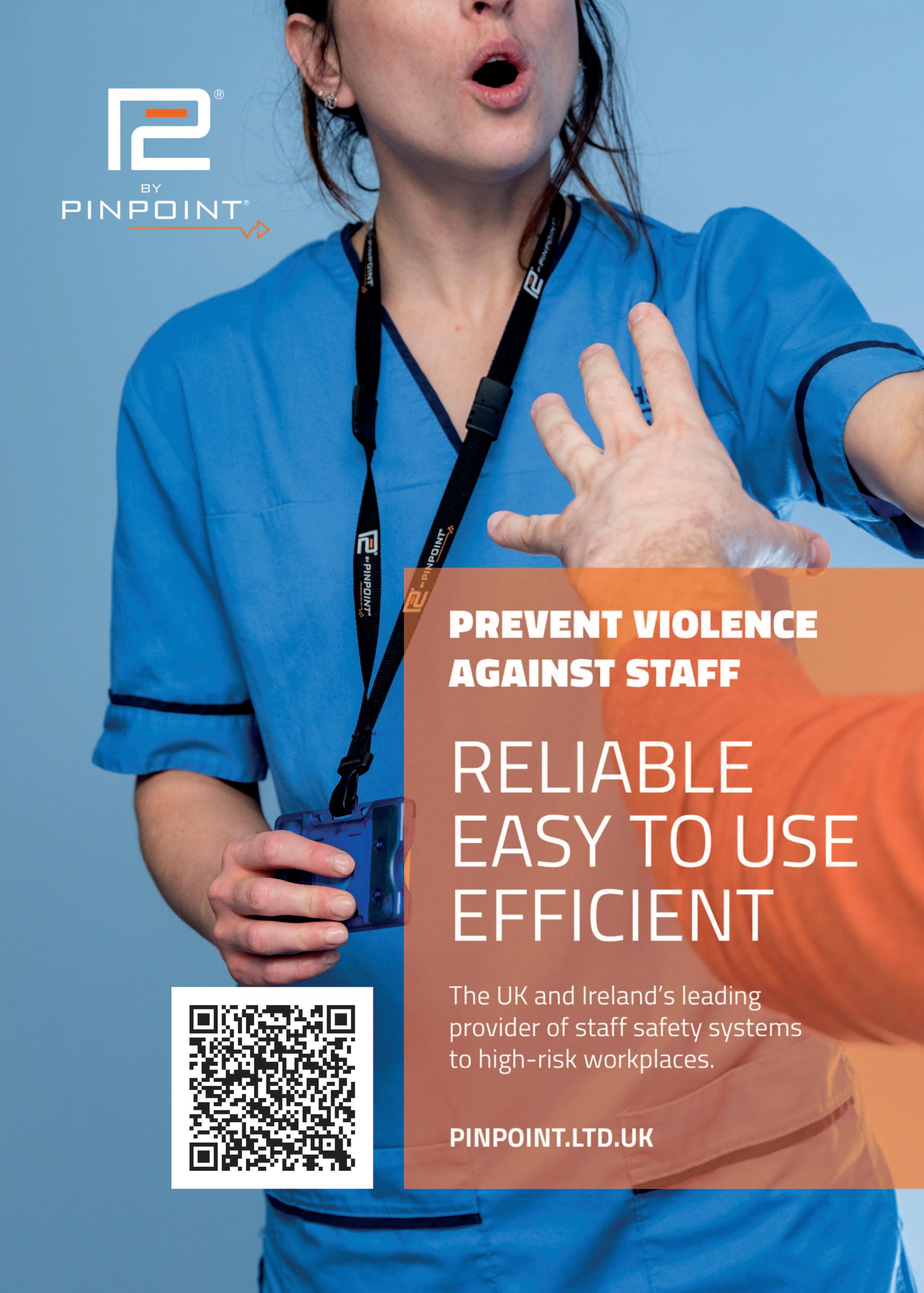
On Friday 11 April, it was announced that the Omaze Million Pound House Draw, Scotland had raised £3.9 million to speed up the search for breakthrough dementia treatments, and ultimately, a cure.
The £3.9 million raised will support Alzheimer’s Research UK’s Drug Discovery team. This team was created to bridge the gap between world-leading researchers and later stage drug discovery, speeding up the search for new treatments for every form of dementia.
Hilary Evans-Newton, Chief Executive at Alzheimer’s Research UK, said:
“We are thrilled that the Omaze Million Pound House draw in Scotland raised an incredible amount of £3.9 million for Alzheimer’s Research UK.
“There are still no treatments available on the NHS that can slow, stop or prevent dementia. But this is a powerful step forward in our efforts to revolutionise the way dementia is treated, diagnosed and prevented.
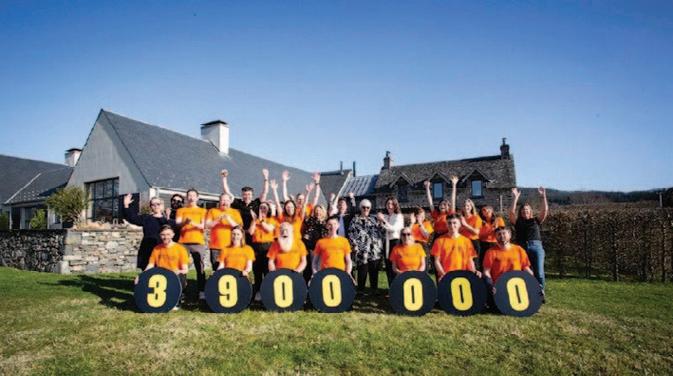
“Thank you to Omaze and their incredible community for standing with us for a cure.”
This is the third time the charity has teamed up with Omaze. The first partnership, in 2022, raised £1 million that helped Alzheimer’s Research UK to protect and continue progress in dementia research during the pandemic. The second partnership raised £3.1 million and supported the charity’s Clinical Accelerator Programme, boosting clinical research for dementia across the UK. This latest donation brings the total raised for the charity by Omaze to £8 million.
Jordan Adams, Alzheimer’s Research UK Ambassador, said:
“It means the world to see so many people come together to support Alzheimer’s Research UK by entering the Omaze draw.
“My family and I know first-hand how devastating dementia can be – it changes everything. But with greater investment, increased awareness, and stronger support, we have a real opportunity to end the
heartbreak of dementia by funding the research that could lead to a cure.
“Thank you to everyone who’s helping make that happen.”
Jordan’s fellow Alzheimer’s Research UK Ambassador, actor Brian Cox, CBE, said the amount raised was “fantastic”.
Both Brian and Jordan supported the charity’s partnership with Omaze and in a candid conversation, shared why dementia is close to their hearts.
“All of this for 25 quid – it’s not bad!”
As well as raising vital funds for Alzheimer’s Research UK, Omaze made one lucky winner a multi-millionaire.
Patricia Moule from Southport (81), won the Omaze Million Pound House Draw, Scotland, and now calls an idyllic four-bedroom house with uninterrupted loch views, her own.
An overjoyed Patricia said:
“It was just another Friday night really, I was just getting ready to settle down with a cup of coffee and watch a bit of tele. Then all of a sudden, I get a call and the Omaze team turns up to tell me I’ve won a £4 million house in the Scottish Highlands, I was absolutely overwhelmed”!
James Oakes, President of Omaze, said:
“Everyone at Omaze is elated that Patricia and her family have won this breathtaking house in Scotland, whilst also contributing to our huge raise for Alzheimer’s Research UK, who we’ve now raised a total of £8 million for over three incredible partnerships.
“Omaze offers people the chance to win amazing houses, whilst also introducing charities to new audiences that they wouldn’t normally reach – it’s a real win-win for entrants and our charity partners. We’re immensely proud that the Omaze Community has now raised over £85 million for good causes across the UK.”
HC-One’s Sedgley Court Care Home in Brick Kiln Way, Dudley, is set to host an information talk and session with a volunteer from the Alzheimer’s Society in attendance to offer support and reassurance to members of their local community.
Sedgley Court, a residential and residential dementia care home, has invited members of the local community to attend their Alzheimer’s Society talk. The session will take place at Sedgley Court Care Home on Thursday, April 24th from 2pm to 3pm.
The home aims to become a dementia friendly home to showcase the support they offer for residential and residential dementia care services Sedgley Court.
The session aims to inform families and the local community, as well as colleagues working at Sedgley Court in the home’s dementia community. The session will help improve attendees’ knowledge, awareness and understanding further to be able to continue to provide the best possible care, support and services to residents living at Sedgley Court as well as enrich the lives of those living with dementia even further.
Everyone who attends the session will receive a Dementia Friends badge and become a part of the Alzheimer’s Society community. The session will be hosted by Justin Spencer, a Dementia Friends Ambassador and volunteer at the Alzheimer’s Society, providing an opportunity for members of the local commu-
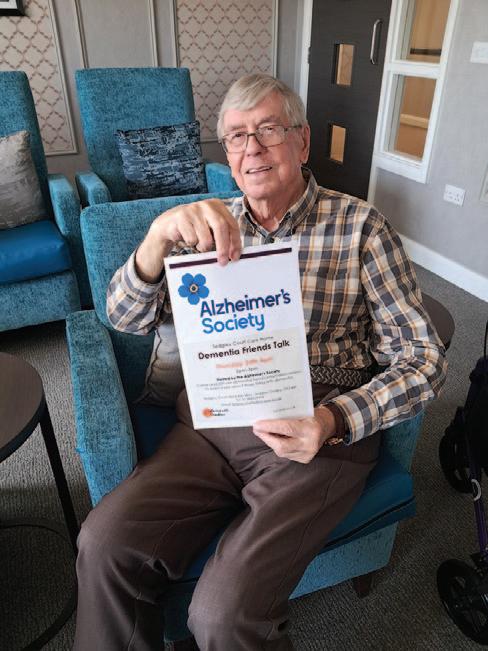
nity to seek information, guidance, and advice within a relaxed calm setting from highly skilled experts in dementia care.
The session will include Justin providing information and insights into what it’s like to live with dementia, discussing the different types of dementia and the science behind how different types of dementia can affect our brain and behaviours. The session will also include activities and case studies.
After the session the team at Sedgley Court can assist individuals with the information they require or help to sign post individuals to other available support services. Whilst listening to an informative talk and having a cup of tea or coffee with someone who understands, members of the local community can feel safe and supported to discuss their own or someone else’s dementia diagnosis and what this means for them and their future.
Attendees can receive answers to questions from health and social care professionals as well as share experiences and learn from other people who are living in similar situations.
Emma Chaffe, Home Manager at HC-One’s Sedgley Court Care Home, said: “I am excited for families and colleagues to be able to broaden their understanding of what it’s like for someone living with dementia.”
“It will be informative for everyone involved and it will really compliment the in house training we are also having for our staff. Our dedicated team are always willing to add a string to their bow.”
The highly anticipated Care Show London 2025 is set to return to Excel London on 30 April – 1 May 2025! This premier event is more than just an exhibition; it’s a vibrant community gathering dedicated to celebrating, inspiring, and advancing the care sector.
Free to attend for those who work for a social care provider (including but not exclusive to care homes, nursing homes and domiciliary care), in addition to healthcare, allied healthcare, NHS, public sector professionals, chefs, catering professionals, architects and interior designers, Care Show London 2025 will bring together over 3,500 care professionals from across the UK. The event promises to be a celebration of shared dedication, filled with opportunities to network, learn, and enjoy the company of like-minded individuals who share your passion for delivering exceptional care.

Over the course of two days, attendees will have the chance to immerse themselves in a CPD-accredited
conference programme, hosted across 6 dedicated theatres. This comprehensive line-up will offer a 360-degree view of today’s social care landscape through a variety of formats. The programme covers key themes including quality, compliance and collaboration, workforce development and wellbeing, funding, business management and sustainability, catering and nutrition, and technology and innovation Explore the expansive show floor, showcasing over 200 key suppliers ranging from leading names to pioneering start-ups making waves in the sector. Attendees will have access to a wide array of innovative products and services, including digital solutions, care equipment, waste management services, recruitment platforms, training programs, financial services, textiles, and more. It’s the perfect opportunity to discover fresh ideas and tools that will enhance your care services and streamline operations.
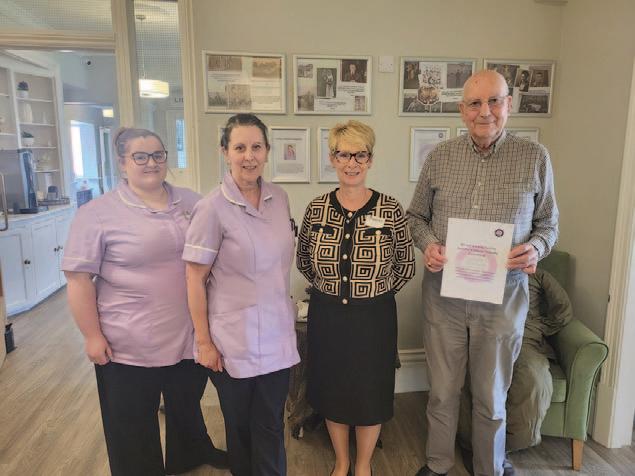
AgeCare Care Homes has announced that its nine care homes are undergoing accreditation by the Veteran Friendly Framework (VFF). It comes as the nation prepares to mark the historic 80th anniversary of VE Day – a tribute to those who served in World War II in Europe and a powerful reminder of the resilience and unity that have defined our country ever since.
The VFF is a free-to-access programme funded by Royal Star & Garter and the Royal British Legion. Very much aware that its residents include people who have served in the Armed Forces, AgeCare, which has homes across London, the South East and East of England, wanted to ensure that their needs were being
fully met. This led to a meeting with the VFF team in February, when AgeCare began its journey towards VFF accreditation.
“We were delighted to receive the resources and guidance provided by the VFF to get us started in attaining accreditation status,” said Sara Gallagher, Head of Nursing & Care at AgeCare Care Homes. “Our homes are eagerly progressing with their accreditation process and we’ve already made some amazing discoveries and connections.”
“The training resources are fabulous. It’s particularly useful to us to gain a deeper understanding of service life and how it might impact on what’s important to our residents,” said Sara.
Kathryn Glass, VFF Project Lead, said:
“Every care home undertakes a journey towards obtaining VFF status with our support. The standards they need to reach have been developed to align with the work already being done in care homes. Once they have achieved VFF status, the homes meet with us every three months to share their progress and are then reviewed one year after their initial achievement.
“We have heard so many lovely stories about the impact it has had on veterans and their families, as well as other care home residents. I also think it’s given homes the confidence to look at other groups of residents and see if there are similar things out there to support them.”
Sara from AgeCare said:
“We’re hoping all our homes will be VFF accredited by the end of July and we’ve got some fabulous VE Day 80 celebrations planned,” said Sara from AgeCare. “Watch this space!”
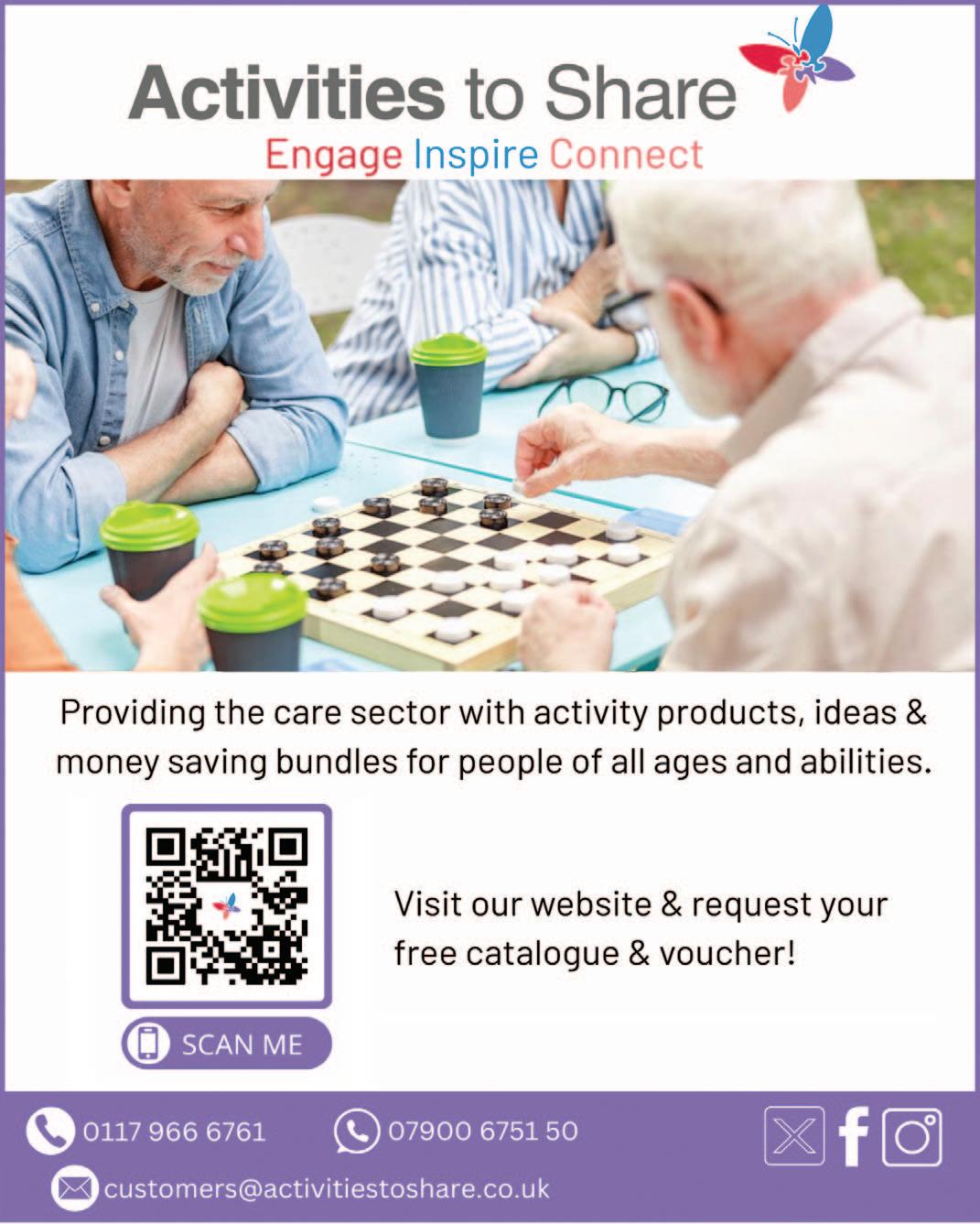




In celebration of World Voice Day, Broadlands Lodge care home in Norwich launched a new British Sign Language (BSL) course for staff and residents, aiming to enhance communication and inclusivity within the home.
World Voice Day, observed annually on April 16th, celebrates the importance of healthy communication and being heard. At Broadlands Lodge, it’s now also a day that marks the beginning of a new journey in communication, empathy, and community spirit.
The initiative was inspired by residents like 73-year-old Judith Rafferty, who moved to Broadlands Lodge after experiencing a stroke. As a result of the stroke, Judith developed Aphasia, a condition that affects her ability to speak. Since then, staff at Broadlands Lodge have learnt to communicate with Judith in other ways that work for her, but they believe offering BSL in the home will make a real difference in supporting Judith and other residents in
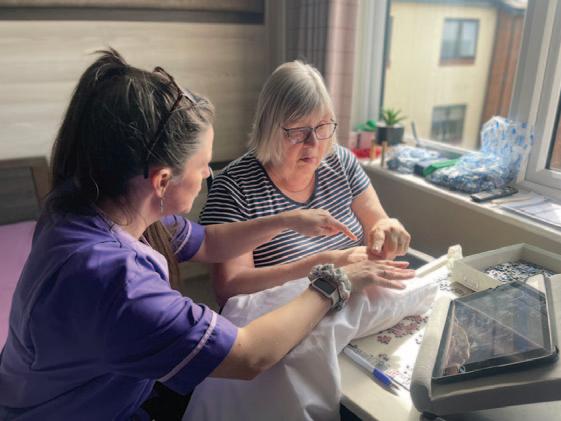
daily interactions.
Judith was delighted to learn about the new initiative and couldn’t wait to start learning, a smile on her face as she explored the new course.
This new programme reflects Broadlands Lodge’s ongoing commitment to person-centred care.
Tamara Crosswell, the Home Manager at Broadlands Lodge, hopes that this initiative will not only empower staff and residents but also foster stronger bonds and understanding throughout the home.
“Judith is a bright, social lady with so much to say, and it’s incredibly frustrating for her when she can’t make herself understood,” said Tamara.
“We wanted to do something meaningful, not just for Judith, but for others in our home too. BSL is a beautiful, expressive language, and learning it together is already bringing us closer.”
HC-One’s Leighton Court Care Home, in Wallasey Merseyside, has been buzzing with excitement after a 14-year-old student has been making weekly visits every Saturday morning to gain his Duke of Edinburgh Award.
Quinn Barnett, a student from Calday Grange Grammar School, has shown infectious energy and genuine care, which has quickly made him a beloved figure at the care home. This spirited volunteer has been lending a helping hand and spreading joy as he works toward earning his Duke of Edinburgh Bronze Award.
From assisting carers with daily tasks to sharing heartfelt conversations with residents, Quinn Barnett has woven himself into the fabric of the Leighton Court community. His vibrant presence has injected new life into special celebrations, and he has eagerly rolled up his sleeves to join the care home’s beloved baking club.
A passionate Everton football supporter, Quinn found a lively connection with residents who love debating the game, especially those with rival loyalties.
Marie Keating, HC-One’s Leighton Court Care Home Manager, stated:
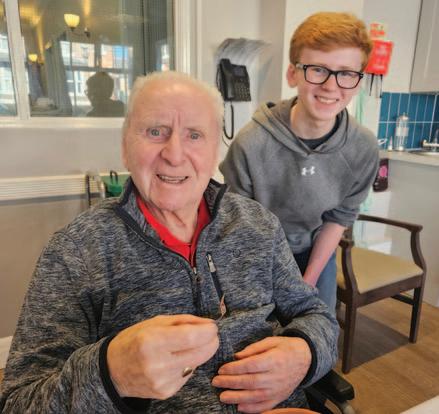
“Quinn has been absolutely brilliant by helping out, learning about our home, and getting to know our residents. The residents all absolutely love him, and their smiles are so big when they see him each week.”
“One of our residents, Kath, always comments on how gorgeous his hair is, and has been practicing on the piano with him. Quinn is a big Everton fan, which is why he gets along with our resident Alex so well.”
“He also has great banter with another resident, Bob, who is a big Liverpool supporter! It really has been wonderful having him visit – he’s a lovely young man.”
Sophie Teasdale, HC-One’s Leighton Court Wellbeing Coordinator, who worked alongside Quinn, stated:
“Our residents can’t get enough of him! It’s so lovely for them to spend some time with the younger generation.”
The Chater Lodge Care Home, in Ketton, Stamford, recently hosted an engaging event featuring local historian Jay Naylor. Jay presented a series of films and spoke about the rich history of Ketton and the surrounding area, incorporating Super 8 video technology to bring the past to life.
Among the historical events Jay discussed was the Queen’s visit in 1967, which was captured on a Super 8 camera by Jay’s great-grandfather and preserved in remarkable quality. Jay also shared his recent campaign to save the local redwood trees and his passionate project to plant a new grove of these iconic trees for future generations.
Jay also spoke about the history of St. Mary’s Church with a new film featur-
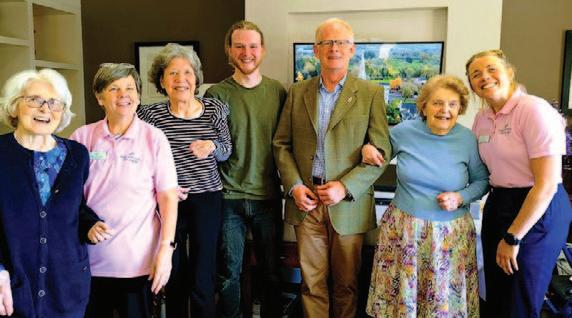
ing stunning use of drone technology.
The home was also honoured to welcome the new High Sheriff of Rutland, Richard Chesterfield as a special guest, who engaged in conversations with Jay, the residents, their relatives, guests and we were also joined by residents from the Tixover House Care Home.
General Manager, Zoe Postgate, of Chater Lodge Care Home, said:
“Today has been all about celebrating our local history and it has been a wonderful experience for everyone. Our staff and residents have thoroughly enjoyed the presentations and the opportunity to learn more about our community’s heritage.”
A care home provider teamed up with the charity Parkinson’s Poole to stage a Parisian café-style community tea dance, raising more than £1,000 to help people with the condition.
Around 150 people enjoyed the Gallic-themed fun at St George’s Church Hall in Poole which was organised and staffed by Colten Care.
The afternoon featured traditional French songs performed live on accordion, guitar and double bass by costumed New Milton group Café Mondial.
Between dances, partygoers sampled cakes and other patisserie delights specially made for the occasion by expert Colten Care chefs.
As well as many guests with personal connections to Parkinson’s Poole, attendees included dozens of residents from seven Colten Care homes.
Lindsey Oliver, whose husband Bob is chair of Poole & District Parkinson’s Group, said she was delighted to find that one of the Colten Care residents, Myrtle Smith, who now lives at Bourne View in Poole, was her old music teacher.
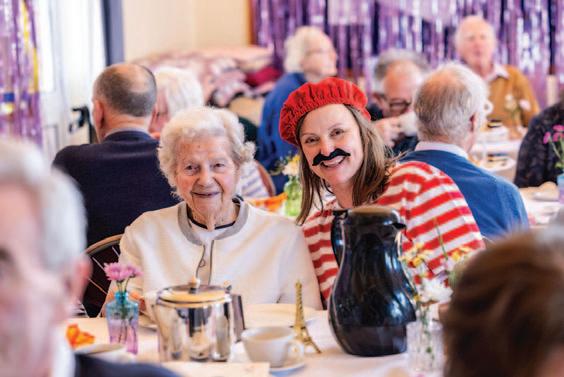
“I can’t have seen her for over 60 years,” said Lindsey, who added: “This was a spectacular event, marvellous. The organisers did a brilliant job.”
It was the second community dance that Colten Care have organised in partnership with Parkinson’s
groups.
Last year, residents and staff from five homes in the New Forest came together in Boldre near Lymington for a similar French-style event that raised more than £700 for the charity’s New Forest branch.
The latest dance was planned through close work over several months between Bob and Martin Corrigan, Home Manager of The Aldbury in Poole.
Martin said: “The New Forest event inspired me to lead the charge to do the same for our Bournemouth and Poole homes. I was delighted to work alongside Bob, who lives with Parkinson’s himself and is a huge inspiration.
Given that 150,000 people in the UK live with Parkinson’s and it is the fastest growing neurological disease, we’re thrilled that the funds we’ve help to raise will make a much-needed difference and be well received.”
Bob said: “Following an invite to talk at one of The Aldbury’s business breakfast clubs, me and Martin worked closely together to bring the idea to fruition. The aim of all of our events is to create an uplifting community for those living with the disease. The money raised at this event will be used to support people with Parkinson’s living locally.
We have a small committee of people who give up their time for nothing. I want to say a huge thank you to Martin and the team at Colten Care for making this event happen.”
Caring for a loved one is a journey of commitment, love and dedication, but it also comes with profound challenge and responsibility.

Whether it’s elderly relatives, individuals with dementia, people with disabilities, or those with complex medical needs, ensuring their safety – especially in emergencies – is a constant concern. Your priority is always their safety and well-being. But what happens when you can’t be there?
If a person with dementia wanders, will responders know who they are and who to contact? If someone with epilepsy, diabetes, or a severe allergy experiences a medical crisis, will 昀rst responders have the right information to act quickly and safely?
MiCode, a British-made, NHS-backed innovation, understands these concerns. It offers a simple yet powerful solution designed to bring peace of mind to carers and protect those they love.
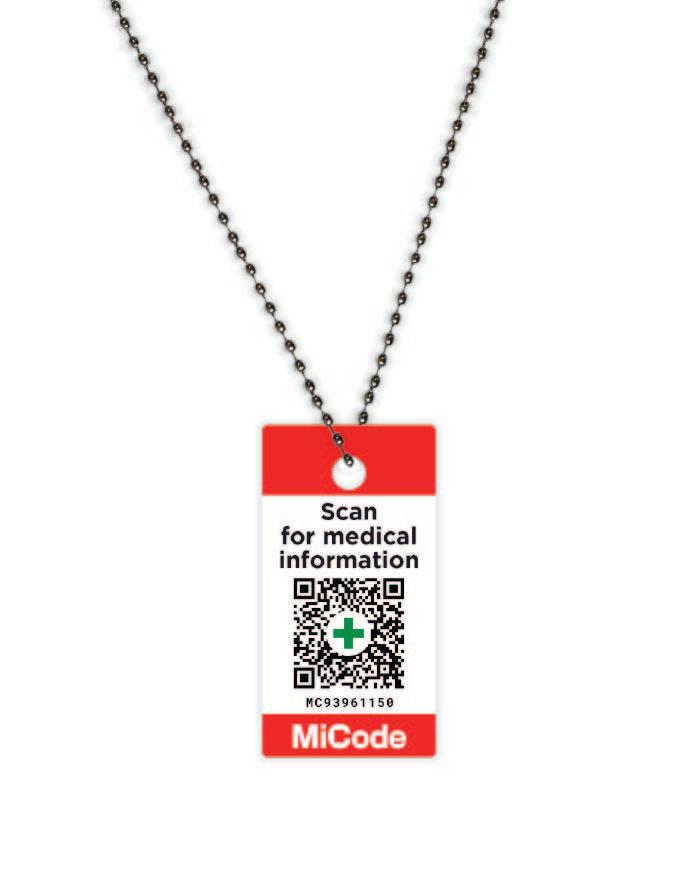
A Carer’s Story at the Heart of MiCode
MiCode wasn’t conceived in a boardroom; it was born from a place of love and necessity. Professor James Ohene-Djan, a leading technologist from Goldsmiths, University of London, and his sister Professor Louise Brown developed MiCode after witnessing the challenges faced by their brother, Anthony, who lived with multiple sclerosis (MS).



As Anthony’s condition progressed, communicating his medical needs became increasingly dif昀cult. James and Louise saw 昀rsthand how a lack of instantly accessible medical details could put vulnerable individuals at risk. They used their expertise to create MiCode – a simple, effective, and affordable way to ensure people always have their vital medical information at hand. It’s a solution built by carers, for carers.
What is MiCode, and How Does it Help?
MiCode is a secure QR code system that provides immediate access to essential medical and emergency contact information. Unlike traditional medical ID bracelets, which can only hold a few words, MiCode acts as a digital lifeline and allows 昀rst responders, paramedics, and you to access a complete, up-to-date medical pro昀le in seconds.
Each MiCode securely stores:
• Emergency contacts: Ensuring the right people are called 昀rst – including you.
• Medical conditions: Allowing paramedics and carers to make informed decisions.
• Allergy and medication details: Preventing potentially dangerous treatment errors.
• Care instructions: Supporting continuity of care across different carers and settings.
• Instant translation: Ensuring accessibility in diverse communities and while traveling abroad.
Designed for Real Life, Backed by the NHS
MiCode is a proudly British company, using cutting-edge British technology to enhance safety and ef昀ciency in healthcare. It has been developed in close collaboration with the NHS, with a particular focus on supporting children, older adults, and individuals with complex care needs.
Unlike many healthcare solutions that require expensive subscriptions or complicated apps, MiCode has been designed to be:
• Affordable: At just £2 per month or £20 annually, MiCode is accessible to individuals, families, and care organisations.
• Easy to use: No apps, logins, or complicated passwords—just a simple scan with any smartphone.
• Practical for real-world emergencies: Whether at home, in a care facility, or traveling, medical and emergency details are always accessible.
MiCode can be seamlessly integrated into daily life, making it a 昀exible and convenient tool for those receiving care, their families, and professional caregivers.
• Wearable options: MiCode can be worn as a bracelet, pendant, or keyring, ensuring it is always available in an emergency.
• Mobile integration: MiCode can be displayed on a mobile phone screen for instant access.
• Cards and stickers: Ideal for placement in wallets, on mobility aids, or in homes, ensuring carers and emergency responders can retrieve information immediately.
• Clothing and pre-printed items: MiCodes can be integrated into uniforms, lanyards, and ID badges, making them particularly bene昀cial for care home residents and individuals prone to wandering or confusion.
Unlike many digital health systems that require Wi-Fi, apps, or login credentials, MiCode is designed to work instantly with any smartphone camera. This makes it particularly useful for those who may not be comfortable with technology or who need a reliable, always-accessible solution.
For family carers, MiCode provides invaluable peace of mind. If something happens and you are not present, you can trust that 昀rst responders will have all the necessary information to provide the best possible care and contact you immediately.
For professional carers and care companies, MiCode ensures:
• Faster emergency response – Information is available instantly, without the need to search through 昀les or records.
• Improved communication between care teams – Every carer and responder has access to the same critical information, ensuring consistency in care.
• Reduced risk of medication errors – MiCode provides real-time medication details, preventing dangerous mistakes.
• Lower operational costs – At just £20 per year per person, MiCode is an affordable alternative to complex digital health record systems.
MiCode is already being adopted by care homes, assisted living providers, and NHS services, contributing to a safer and more ef昀cient care environment.

MiCode Can Save Lives
Emergencies happen when least expected. Being prepared can mean the difference between life and death.
For families, MiCode offers reassurance that their loved ones are protected, even when they are not around.
For carers, it is a simple, affordable, and lifesaving tool that ensures 昀rst responders and healthcare providers have immediate access to accurate medical information.
For care companies, it is a scalale, costeffective solution that enhances patient safety, reduces risk, and improves communication between care teams.
And for those who rely on care, MiCode is a lifeline—ensuring that in any emergency, help arrives quickly, accurately, and ef昀ciently.
MiCode isn’t just technology; it’s a way to empower you, the carer, and protect the ones you love.
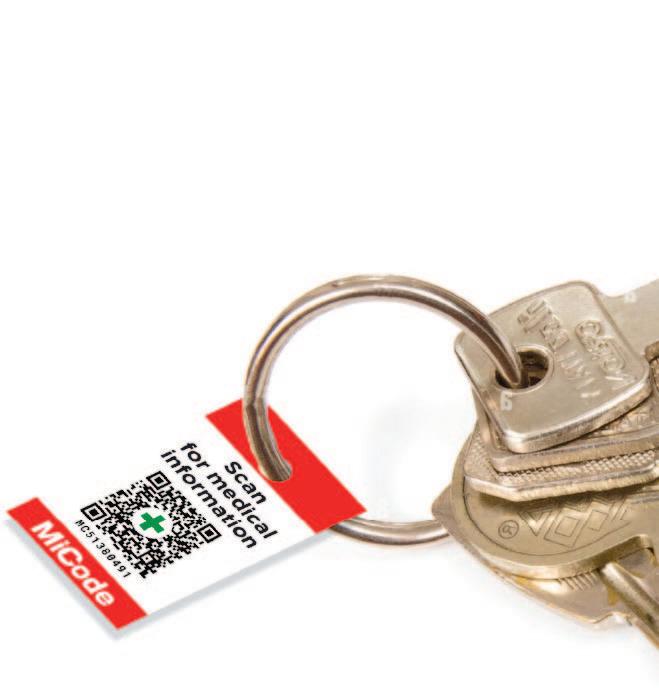
Learn more and 昀nd out how MiCode can bring peace of mind to your caring journey at micode.uk.
View an Explainer video for Carers at https://tinyurl.com/cr6mu8cd
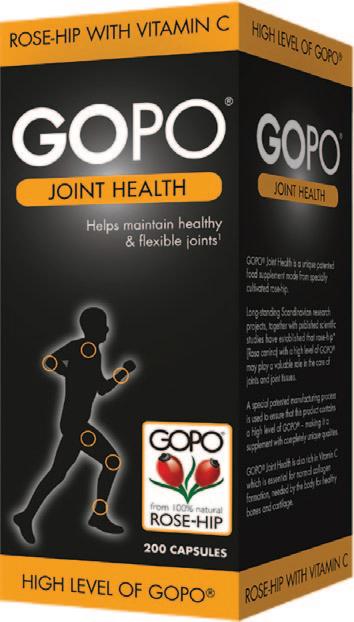
New survey insights reveal the far-reaching impact caregiving can have on physical and mental well-being, with over half (54%) of caregivers reporting weekly back, joint or muscle pain, and 1 in 5 (19%) experiencing daily stress or anxiety.[i] Dr Dawn Harper shares her tips to help cope.
There are approximately 4.7 million unpaid carers in the UK,[ii] defined as those who provide unpaid care for someone who is ill, disabled, older, has mental health issues or struggles with addiction. However, this figure excludes the many who regularly care for children, neighbours or friends and family needing support beyond the traditional definitions. Carers UK estimates that the number of unpaid carers could be as high as 10.6 million, highlighting a significant lack of personal and societal recognition of what it truly means to provide care.[iii]
A new survey, commissioned by GOPO® Joint Health – a leading supplement proven to reduce pain and stiffness and improve mobility – polled 1,001 self-defined caregivers. The findings reveal the true impact of caregiving on mental, emotional and physical health.
Over one-third (37%) have experienced significant strain, discomfort or injury to their joints as a result of assisting or lifting the person they care for, and almost half (47%) frequently endure persistent aches, stiffness or pain that lingers long after caregiving tasks.i As a result, one-third (32%) rely heavily on pain medication, putting their own long-term health at risk.
The mental toll of caregiving is profound, with almost half (46%) of caregivers feeling emotionally drained by the relentless stress it brings. One in seven (13%) rely on support services for their well-being, while nearly half (44%) experience loneliness or isolation at least once a week, often facing the demands of caregiving alone.
Despite these challenges, almost half (49%) of respondents cannot remember the last time they practiced self-care, admitting that their own needs always come last.i While caregivers devote themselves to others, acknowledging the importance of self-care, and setting aside time for their own well-being is vital.
Dr Dawn Harper, formerly a caregiver to her mother, NHS doctor for over 30 years and author of ‘Live Well to 101’, comments: “Caregiving is a labour of love, but the selfless nature of the role puts many caregivers at serious risk of poor health. As a GP I see first-hand the impact that caring can have on both physical and mental ill health. To continue supporting others, it’s vital to care for yourself first. Just like the safety advice on an aeroplane – put on your own oxygen mask before helping others. Prioritising your own wellbeing ensures you have the strength, resilience and capacity to provide the care your loved ones need in the long-term.”
Dr Dawn Harper provides her top tips to support caregivers’ health and well-being: Seek support from peers: “It can be easy to lose your identity when providing care, so it’s important to connect with peers who are in a similar situation. If you are unable to leave the house often, online forums or virtual coffee sessions can provide an outlet to enable you to open up to someone who understands exactly
what you’re going through. Their acceptance and understanding can be a great way to support your emotional health and leave you feeling less alone.”
Schedule self-care: “Caregiving often leaves little time for personal well-being, but self-care isn’t a luxury, it’s a necessity. Schedule self-care just like any essential appointment and if you’re struggling to find the time, start with small manageable breaks of just 5-10 minutes and commit to doing one thing that makes you feel recharged. This could be as simple as having a cup of tea in silence or reading a few chapters of your favourite book.”
Build your mental resilience: “Mental resilience helps caregivers manage stress, maintain emotional balance and continue providing care without burning out. Incorporate techniques such as mindfulness, deep breathing, yoga or meditation, all of which can be practiced in as little as 15 minutes. If you are struggling with your mental health, make sure to reach out to mental health helplines or listening services, or discuss your feelings with your GP or pharmacist.”
Prioritise your physical health: “Caregiving is a physically demanding role, and these survey findings reveal the true toll caregiving can take on your physical health. Protect your joints and posture by using proper lifting techniques when assisting with mobility, and address any aches and pains early to help prevent chronic conditions from appearing later down the line. A joint health supplement such as the galactolipid, GOPO, a compound derived from rose-hip, may be of great benefit, with research indicating that it can effectively relieve joint pain.[iv] The natural anti-inflammatory properties of GOPO make it a viable replacement to pain killers,iv without the risk of harmful side effects, and a sustainable way to manage pain long-term.”
Extensive studies involving over 400 patients with chronic pain conditions, such as osteoarthritis, have shown that GOPO® produces significant and consistent pain relief and improved joint function. In one study, 8 out of 10 patients reported a significant reduction in pain after just 3 weeks of GOPO®.[v]
GOPO® Joint Health is available from Boots, Amazon, and independent chemists and retailers nationwide. Visit www.gopo.co.uk for further information.
[i] GOPO® Joint Health survey on 1,001 caregivers in the UK. January 2025.
[ii] The Kings Fund. 2024. What are unpaid carers, who are they and how often do they provide care? Available at: https://www.kingsfund.org.uk/insight-and-analysis/data-and-charts/unpaid-carersnutshell#:~:text=According%20to%20the%202021%20Census,females%20from%20the%202011%20Census. (Accessed: January 2024).
[iii] Carers UK. 2023. Annual Report 2022-2023. Available at: https://www.carersuk.org/media/ynfpnjwk/carers-uk-annual-report-22_23 (Accessed: January 2025).
[iv] Winther, K et al. “A powder made from seeds and shells of a rose-hip subspecies (Rosa canina) reduces symptoms of knee and hip osteoarthritis: a randomized, double-blind, placebo-controlled clinical trial.” Scandinavian journal of rheumatology vol. 34,4 (2005)
[v] Winther, K et al. “A powder made from seeds and shells of a rose-hip subspecies (Rosa canina) reduces symptoms of knee and hip osteoarthritis: a randomized, double-blind, placebo-controlled clinical trial.” Scandinavian journal of rheumatology vol. 34,4 (2005)
[vi] Rein E, Kharazmi A, Winther K. A herbal remedy, Hyben Vital (stand. Powder of a subspecies of Rosa canina fruits), reduces pain and improves general wellbeing in patients with OA – a double-blind, placebo-controlled, randomised trial. Phytomedicine 2004.
[vii] Christensen R et al. Does the hip powder of Rose canina (rosehip) reduce pain in osteoarthritis patients? – a meta-analysis of randomised controlled trials, Osteoarthritis Cartilage (2008)
[viii] Schwager J, Richard N, Wolfram S. Anti-inflammatory and chondro-protective effects of rosehip powder and its constituent galactolipids GOPO Poster presentation at the World Congress of Osteoarthritis (OARSI) 2008
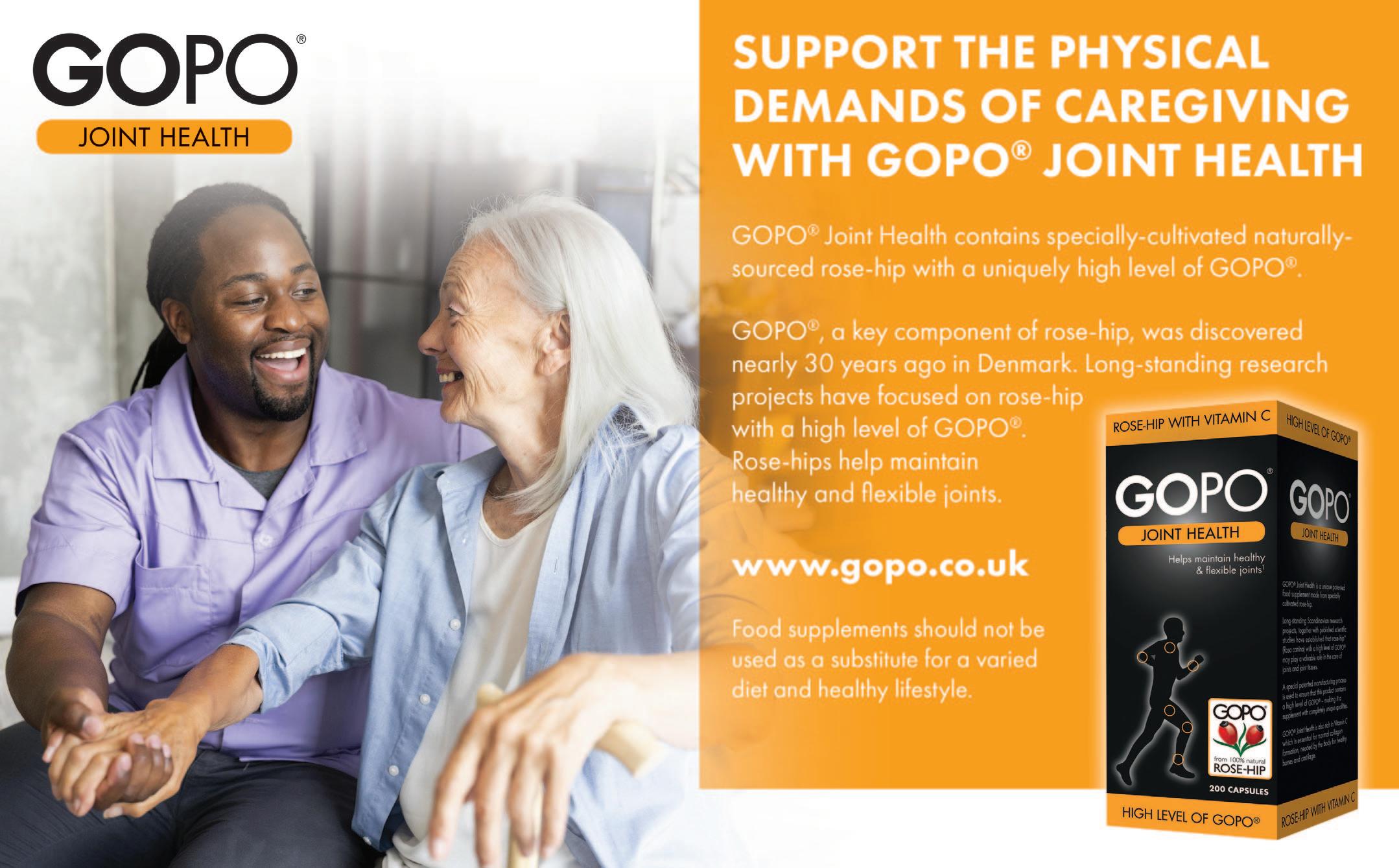
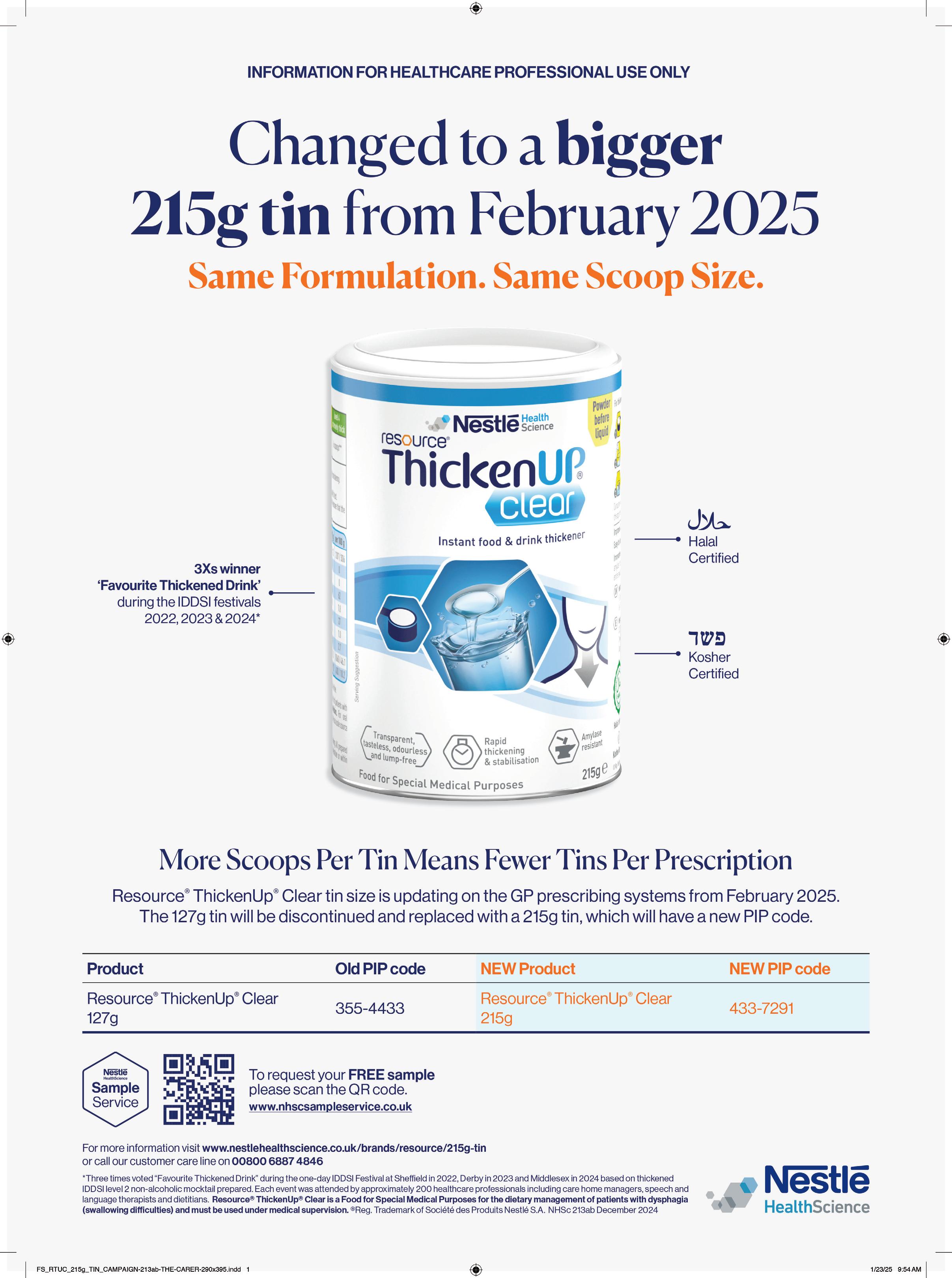

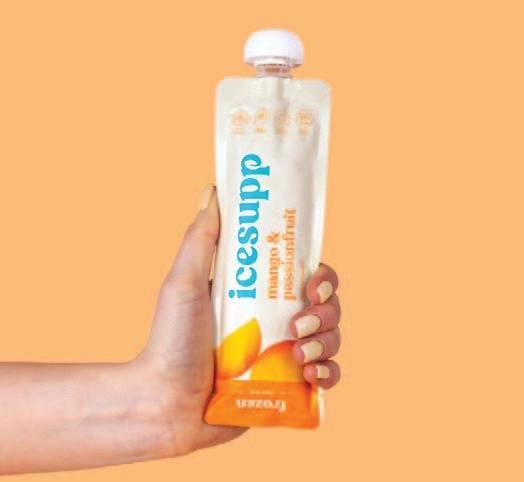
A family business has launched the UK’s first frozen nutritional supplement, ideal for care home residents who may be struggling to eat or drink.
icesupp are 100% plant-based frozen supplements, enriched with key vitamins, minerals, protein and calories, delivered in ice lolly formats to provide an easy-to-consume source of nutrition.

Amy Smith and her partner Robert Upton got the idea when they realised the lack of options for Amy’s father Ray as he struggled to build and maintain his weight during bowel cancer treatment.
Managing a conventional diet was very difficult, and the nutritional supplements available on prescription were unpalatable - too thick and sickly. However, Ray did discover that ice lollies were soothing and easier to consume.
“We were frustrated that the ice lollies Dad was having were just filled with sugar and water, and didn’t provide the nutrition and quality calories that he needed to keep his weight and strength up,” says Amy.
“The idea for icesupp was born – and it became our mission to create something that would combine the nutritional elements of a supplement shake with the more palatable form of a soothing iced refreshment.”
BAPEN’s Malnutrition and Nutritional Care Survey (2023) highlighted that nearly well over half (48%) of adults screened across UK health and care settings were at risk of disease-related malnutrition. This was particularly high amongst individuals with cancer, gastrointestinal conditions respiratory conditions, frailty and neurological diseases – so this is a very real issue for carers and families across the UK.
Following two funding rounds, Amy and Rob worked Reading University’s Food Science Department and a team of specialist advisors including top dietitians, an oncologist and a GP to create their unique, first-tomarket products, which come in two flavours – Mango & Passionfruit and Mixed Berries. 100% plant-based, each 86ml supplement pouch contains 5g of protein, 2.5g of fibre and 150 calories -
helping those who are struggling to eat to build strength and energy. A box of 12 products costs £23.75 from icesupp or Amazon. The products are shipped in ambient liquid form to be conveniently frozen then deliver the soothing sorbet-like iced consistency.
Nick Dutton, of Primrose Bank Care Home, says: "Helping those we care for to maintain and increase their nutritional intake is no easy task, made even more challenging when coupled with other dietary requirements, palliative care needs and the general challenges the care sector faces.
“When we came across icesuspp we were interested straight away. Having seen our own relatives struggling to eat well during palliative care and facing malnutrition and knowing the difficulties faced with different nutritional supplements and changing taste, we knew that a different way to deliver nutrients and flavour was a great idea.
“icesupps taste really good and we have had brilliant feedback from everyone in the home, residents, families and staff alike. We love that they are easy to store and also easy to eat without needing lots of preparation to make them enjoyable like some ONS.
“It’s great to have another tool for our team to use to improve our residents’ lives."
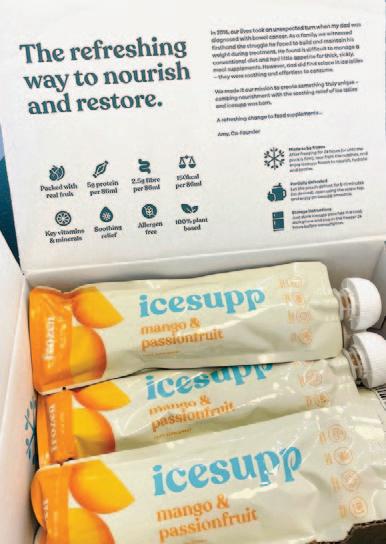

Amy concludes: “We have created an iced supplement that soothes and nourishes, helping to provide a moment of refreshing relief for those in need. Our goal is to help families like ours, who have experienced the devastating effects of dramatic weight loss and malnutrition, which can impact anyone, however those that are particularly at risk include those with an illness like our Dad such as cancer, and those aged over the age of 65, especially if they are in a care home or have been recently admitted to hospital.”
Dietitian Corrine Toyn says: “Malnutrition can be caused by range of factors. In the case of Ray, it was the side effects of the illness and his treatment, which is very common – but we know it is a real issue in care homes, along with dehydration. Oral nutrition supplements have been part of the solution to malnutrition for a while, as long as patients find them palatable and are compliant, but the majority of the ‘ready to drink’ supplements are highly concentrated, with a thick consistency that can be difficult to consume. Improving the flavour, mouth-feel and variety is vital to prevent patients’ taste fatigue, provide choice, and ultimately improve their quality of life. icesupp is such a brilliant idea, created with love and expertise, to respond to a real problem. It’s been incredible to see the reviews from customers, saying that icesupp tastes great and is easy to consume.”
For further information, email info@icesupp.com or visit the website at www.icesupp.com
Heathcare professionals can access the sample service at www.icesupp.com/pages/the-healthcare-professionals-hub
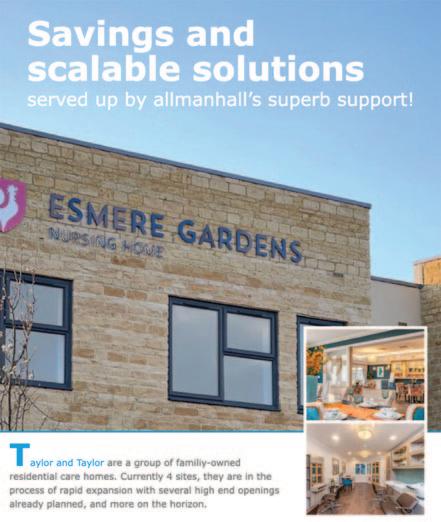
Taylor & Taylor, a group of family-owned residential care homes approached food procurement experts, allmanhall to achieve scalable cost savings and efficiencies to support their growth plans. They needed to ensure no detrimental impact to the excellent quality of their food offering and their residents’ dining pleasure.
Their desire was to achieve a 5% food cost saving and to ensure ongoing effective management of catering budgets and invoicing. Operationally, access to reports and insights were key, as was ease of ordering and management of stock and deliveries.
allmanhall undertook a like-for-like benchmark and identified achievable food cost savings of 11.4% - more than double the initial objective!
allmanhall delivered tech demos of the catering control platform for Taylor and Taylor, ensuring it met their needs and provided training for the team. As well as providing useful operational functionality like stock taking and standing orders, the catering control platform proposed would also give access to management reports and facilitate central billing and conversion of all supplier invoices in to 1 per month. Samples and on-site supplier meetings were also arranged on behalf of the homes, to confirm that the quality was to the required standard.
allmanhall have also supported Taylor and Taylor with the launch of a community engagement event for one of their newest homes.
A few months into the contract, the actual results were found to be an 18% food cost saving! You can watch this short video on You Tube to find out more… www.youtube.com/watch?v=e2QrrmaiG1Y
“From day 1, the care and attention provided by allmanhall has been exceptional. The team truly listen to us, to what our challenges are and are always willing to help in any way they can. Their approach is thorough and responsive, meaning we feel fully supported. Everyone we’ve met from allmanhall has been hands-on, down to earth, genuine and considerate.
We’ve been impressed by the savings we’ve already seen, the flexibility regarding suppliers and by the excellent quality. The consolidation of invoices into 1 per month is a huge win.
We have relationships and contact with people across the allmanhall team – all there to help and to advise or resolve depending on what we need. With challenges around labour shortages and food inflation, this is hugely valued. It frees up the team and gives us peace of mind.
We would wholeheartedly recommend allmanhall’s services to others in the care sector and look forward to continuing to grow our offering and provide outstanding food for our residents, with allmanhall as our trusted partners.”
allmanhall is an owner-managed, award-winning and trusted food procurement partner for care organisations across the UK. We help clients with a range of needs, including cost savings, administrative efficiencies, supplier management, dietetics and nutrition support, and sustainability goals. Get in touch to find out more:
Email: hello@allmanhall.co.uk
Telephone: 01225 745520
Website: allmanhall.co.uk
LinkedIn: @allmanhall
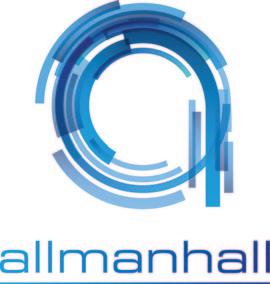
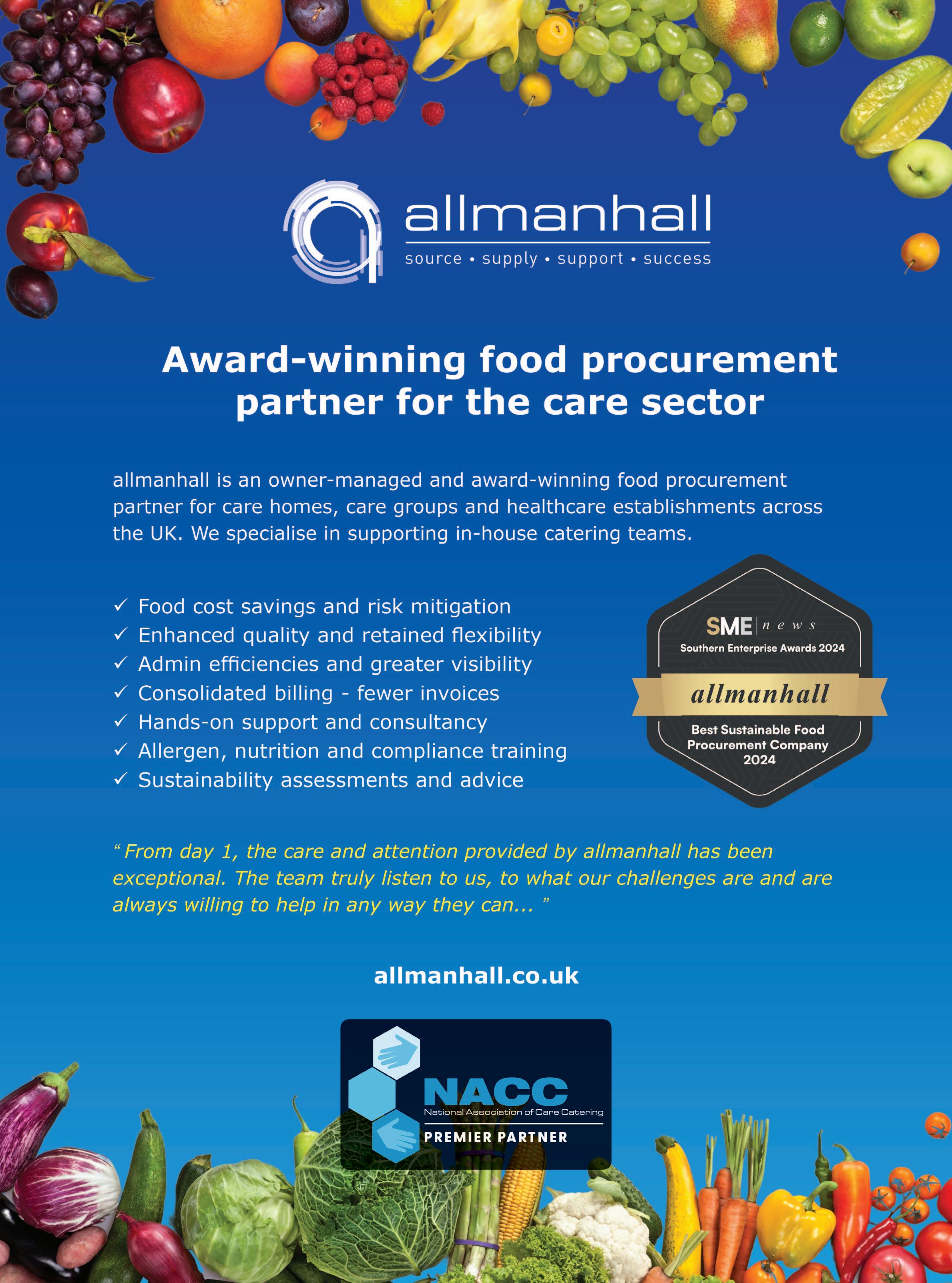
By Derek Aaronson, Founder & CEO of
Hart Home Group (www.harthomegroup.co.uk)

Infection control and prevention are critical components in safeguarding the health and well-being of individuals in medical, commercial, and domestic environments.
For the independent nursing and residential care home sector, maintaining stringent infection control measures is not just a matter of compliance, but a fundamental responsibility to ensure the safety of vulnerable residents. As the world continues to grapple with new and evolving health threats, the importance of infection prevention cannot be overstated.
THE
For nursing and residential care homes, infection control is especially crucial. Residents often have weakened immune systems due to age or pre-existing conditions, making them more susceptible to infections. In such settings, even a minor lapse in hygiene protocols can lead to the rapid spread of pathogens, which can have devastating consequences. Healthcare-associated infections (HAIs) continue to be a significant risk in care homes, leading to longer hospital stays, higher medical costs, and, in severe cases, death.
Therefore, infection control in care homes requires a combination of effective policies, thorough cleaning routines, and specialised equipment. Staff must be well-trained in infection prevention, and robust systems need to be in place to manage outbreaks when they occur. However, achieving a high standard of hygiene in care homes comes with its own set of challenges.
INFECTION CONTROL IN CARE HOMES
THE
Maintaining high levels of hygiene in care homes can be difficult for several reasons. The close proximity of residents, especially in shared rooms, communal spaces, and bathrooms, increases the risk of cross-contamination. Frequent touching of high-contact surfaces such as handrails, doorknobs, and shared equipment can facilitate the spread of germs. In addition, staff turnover and the demanding nature of care work mean that infection control protocols may not always be followed consistently.
The traditional reliance on manual cleaning methods can also be timeconsuming and may not always be effective in eradicating harmful bacteria and viruses. With the rise of antimicrobial-resistant organisms (AROs), which are more difficult to treat, care homes must adopt more advanced solutions to combat the spread of infection.
SOLUTIONS TO ENHANCE INFECTION PREVENTION IN CARE HOMES
The solution to these challenges lies in a combination of better practices, staff training, and, crucially, the use of advanced infection control technologies and equipment. Specialised hospital-grade fixtures, such as antimicrobial door handles, bed rails, and mobility aids, are invaluable in preventing the spread of infection in care homes. These fixtures are designed with non-porous materials that are easy to clean and resistant to microbial growth, ensuring that harmful pathogens have fewer places to thrive.
In addition, the use of touchless technologies is gaining traction in care homes as a way to reduce human contact with frequently touched surfaces. For example, touchless faucets, soap dispensers, and hand sanitisers can significantly minimise the risk of cross-contamination. These innovations not only make it easier to maintain hygiene but also improve the overall user experience for both staff and residents, especially for those with limited mobility.
Innovative cleaning solutions, such as UV-C sterilisation devices, are also helping care homes maintain higher standards of hygiene. UV-C light has been shown to be effective at killing bacteria, viruses, and fungi on surfaces and in the air , providing an added layer of protection that manual cleaning alone cannot guarantee.
The role of design and product innovation in infection control is crucial. Products designed with infection prevention in mind—such as hospitalgrade furniture, non-porous flooring, and antimicrobial textiles—play a crucial role in reducing the potential for cross-contamination in care homes. By choosing products made from materials that are resistant to bacterial growth and easier to sanitise, care homes can significantly reduce the risk of infections spreading.
Mobility aids, including walkers, wheelchairs, and lift chairs, are another area where innovation is making a difference. Many of these products now come with antimicrobial coatings that help reduce the risk of pathogens accumulating on surfaces frequently touched by both residents and staff.
These small changes in the design of everyday equipment can contribute to a cleaner, safer environment for both residents and caregivers. Moreover, the growing use of digital solutions, such as automated temperature monitoring, air quality control systems, and remote monitoring devices, is transforming infection control in care homes. These technologies allow staff to track and manage infection risks more efficiently, making it easier to identify potential outbreaks before they escalate. EMERGING TRENDS: TOUCHLESS TECHNOLOGY AND SUSTAINABLE MATERIALS
As the infection control industry evolves, there are two key trends that are gaining momentum: the integration of touchless technology and the use of sustainable materials. The increasing adoption of touchless systems, such as motion-activated doors and automated sanitation stations, is helping to prevent the transmission of pathogens, especially in hightraffic areas. These technologies not only improve infection control but also enhance the overall user experience by reducing the need for physical interaction, which is particularly beneficial in care settings where residents may have limited mobility or dexterity.
Sustainability is another important consideration in infection prevention. The use of environmentally friendly materials—such as biodegradable cleaning products, sustainable textiles, and recyclable medical supplies— ensures that infection control measures are both effective and responsible. The growing demand for eco-friendly solutions in care homes is part of a larger global movement towards sustainability, where reducing environmental impact goes hand-in-hand with enhancing hygiene standards. Infection control and prevention are vital to ensuring the health and safety of residents in care homes. While the challenges of maintaining hygiene in these environments are significant, the solutions are becoming increasingly effective with advancements in technology and product innovation. From hospital-grade fixtures and antimicrobial mobility aids to touchless technology and sustainable materials, these innovations are helping to reduce cross-contamination and improve overall safety. As the sector continues to evolve, adopting these innovations will be key to enhancing infection prevention protocols and safeguarding the health of vulnerable individuals across nursing and residential care homes. Through a combination of best practices, innovation, and thoughtful design, care homes can create a safer, cleaner, and more resilient environment for residents and staff alike.
How can buyers of cleaning chemicals find sustainable solutions that are also effective and safe to use. The Cleaning & Hygiene Suppliers Association (CHSA) has published a White Paper designed to help: The Evolution and Regulation of Cleaning Chemicals.
Buyers and end users of cleaning chemicals want environmentally sustainable, safe and effective cleaning chemicals. Environmental mes-
sages can be seductive, particularly when coupled with highly competitive prices. In the regulated arena of cleaning chemicals, it is difficult to produce products that are effective, have a minimal impact on the environment and are sustainable. It takes years of investment and testing to get the products right and clear the regulatory hurdles. It’s not surprising, therefore, that some organisations are looking for short cuts.
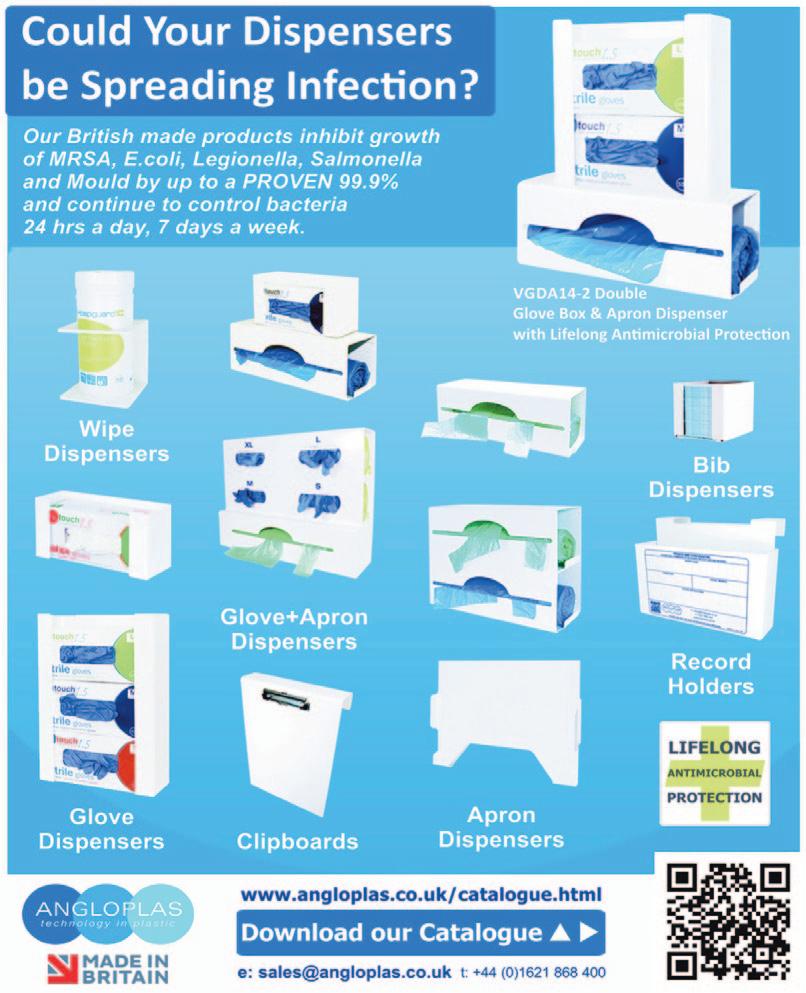
They argue technology is moving so fast there is no time for independent verification or regulation. Essentially, they are suggesting the need for some kind of environmentally sustainable solutions outweighs the need to know if the solution is indeed environmentally sustainable, if it works or how to use it to be certain it is safe.
Regulations, however, matter. They guarantee safety. They underpin transparency and ensure consistency. They provide a framework for comparison, so a buyer really knows if they are getting the product or solution they need. They also provide accountability, giving buyers a route to recourse if needed. In short, they underwrite an ethical approach.
The CHSA’s White Paper was written by Peter Thistlethwaite, Technical Manager – Cosmetics and Biocides at MSL Solution Providers. Peter is a Microbiologist and MSL Solution Providers offers an integrated regulatory and laboratory testing service. Its in-house accredited microbiology and virology laboratories provide a comprehensive range of standard tests, including efficacy testing against bacteria, fungi,
spores, viruses, mycobacteria, legionella, and algae.
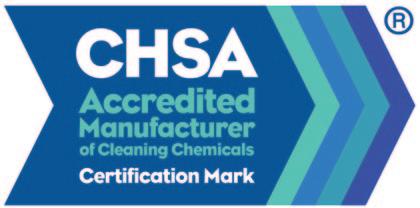
The White Paper explains the evolution of cleaning chemicals. It explains how testing systems with recognised methodologies were introduced to “to prove chemicals were effective but hand-in-hand they gave a way to remove fraudulent products, offering better protections”. Peter explains in the White Paper, “Regulations are intended to ensure a cleaning product is safe for the user and the environment when used correctly. The aim of enforcing regulatory requirements is to ensure products on the market can be trusted and that the companies selling them maintain the highest standards of integrity.”
Peter continues: “Product innovation means testing and regulatory requirements in the biocide market are becoming more complex, and the costs to enter markets are rising. This is expected to lead to a rise in fraudulent products, bypassing or ignoring regulations. Many are making claims about safety and efficacy without the proper technical support from correct testing. They are also using eco-friendly language to appeal to environmentally conscious consumers. Buyers need to beware.” @CHSACleaning www.CHSA.co.uk
Angloplas are a UK manufacturer who specialise in producing dispensers for the health and hygiene industry. Although these are designed to keep the workplace tidy and uncluttered they are, more importantly, built knowing the control of healthcareassociated infections (HCAIs) are a priority for healthcare providers, and who are employing a combination of infection prevention and control strategies, including hand hygiene, cleaning, training and the adoption of new technologies, to tackle the problem.

As a result, a wide range of infection control products and technologies are emerging on the market, including antimicrobial technology. Angloplas’ range of dispensers are produced in the world’s
first proven Antimicrobial PVC with silver ion technology and which is exclusive to Angloplas. This helps reduce the risk of cross infection by stopping the growth of bacteria and mould and works continuously for the lifetime of the product, reducing levels of bacteria such as MRSA, E Coli, Legionella, Salmonella and mould by up to 99.99%. For non-clinical environments Angloplas has recently launched its new Budget Range of products which are made to the same exacting standards as the antimicrobial protected ones but with lower price tags.
You can order Angloplas products directly from its website at www.angloplas.co.uk
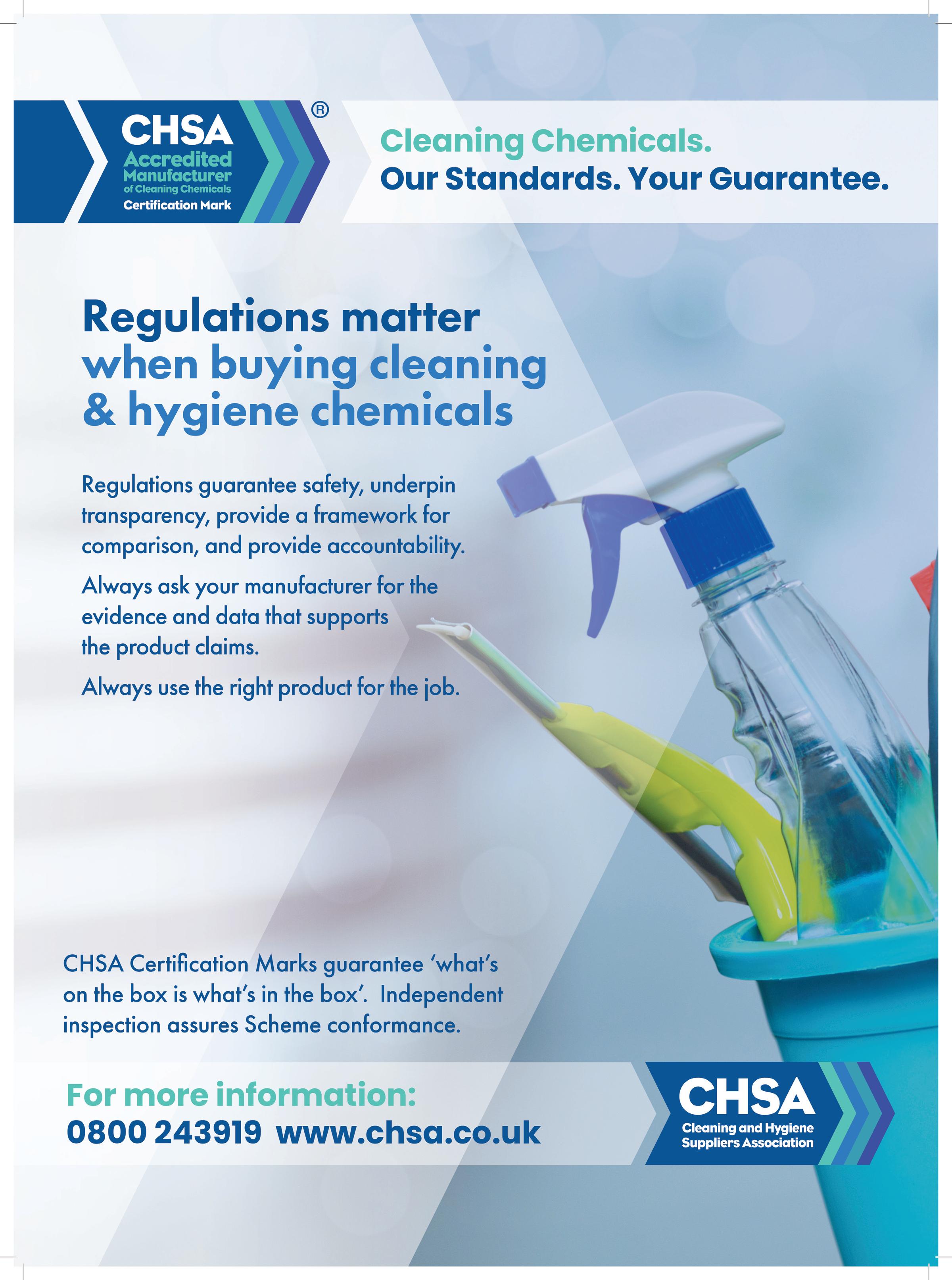
Ensuring strict hygiene standards in care homes is a complex yet essential task, particularly when it comes to laundry processes. With infection control a top priority, operators must comply with stringent regulations, including CQC guidelines and WRAS Category 5 requirements. The latter classifies care environments as high risk due to the potential contamination of water supplies, necessitating specialist equipment and backflow prevention measures to safeguard residents and staff. Failure to meet these standards can not only compromise infection control but also lead to regulatory penalties and reputational damage.
Laundry plays a critical role in infection prevention, yet many care homes still rely on domestic machines that are not fit for purpose. Unlike commercial alternatives, these machines do not achieve the necessary wash temperatures, cycle durations, or thermal disinfection standards required to remove harmful pathogens effectively. This not only increases infection risks but also puts facilities at risk of non-compliance. Furthermore, improper segregation of laundry—such as mixing soiled items with general loads—can accelerate the spread of infections, a concern that has only intensified in recent
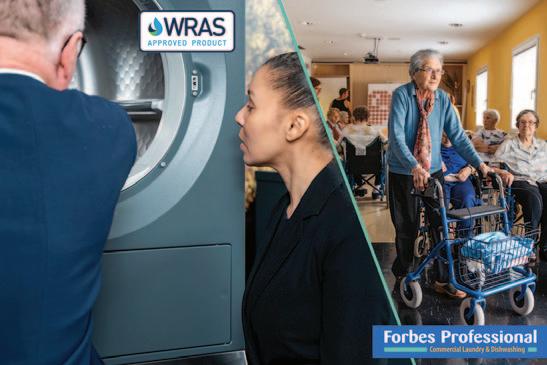
years. Best practice guidance advises that care homes implement a clear separation of clean and contaminated laundry, supported by colour-coded processes to avoid cross-contamination.
Forbes Professional, an expert in commercial laundry solutions, advises care home operators to invest in WRAS-approved, commercial-grade washing machines and sluice systems designed specifically for healthcare environments. Miele’s hygiene-specific functionality, for example, ensures that thermal disinfection is achieved within every cycle, offering protection against bacteria and viruses. Additionally, hot water feeds, appropriate drainage, and compliance with Category 5 backflow prevention are crucial in preventing contamination. With evolving compliance requirements and the ever-present risk of infection outbreaks, care homes need to ensure that their laundry operations are fully up to standard. Forbes provides expert guidance and tailored site surveys to help care operators navigate these challenges, ensuring their facilities remain both compliant and safe for residents and staff alike.
We have recently set up a specialist facility in St. Neots, near Cambridge, in which we are going ahead with this specialist refurbishment programme. This programme involves purchasing existing machines, and replacing the parts on them, so that they are as good as new, whilst retaining the look and feel that existed before, but with a massively increased lifespan, and a warranty on the machines that’s as good as a warranty on a new machine to go with the refurbishment too.
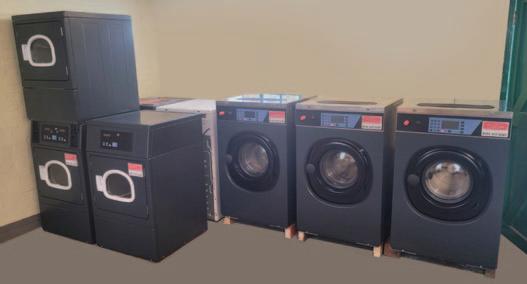
Our refurbishment programme in our specialist facility includes stripping down the machines, and giving them a check-over, to see which parts, if any, can be carried over the refurbishment. Lavamac will only carry over the highest-quality parts from the machine from pre to post
info@laundrytec.com www.lavamac.eu
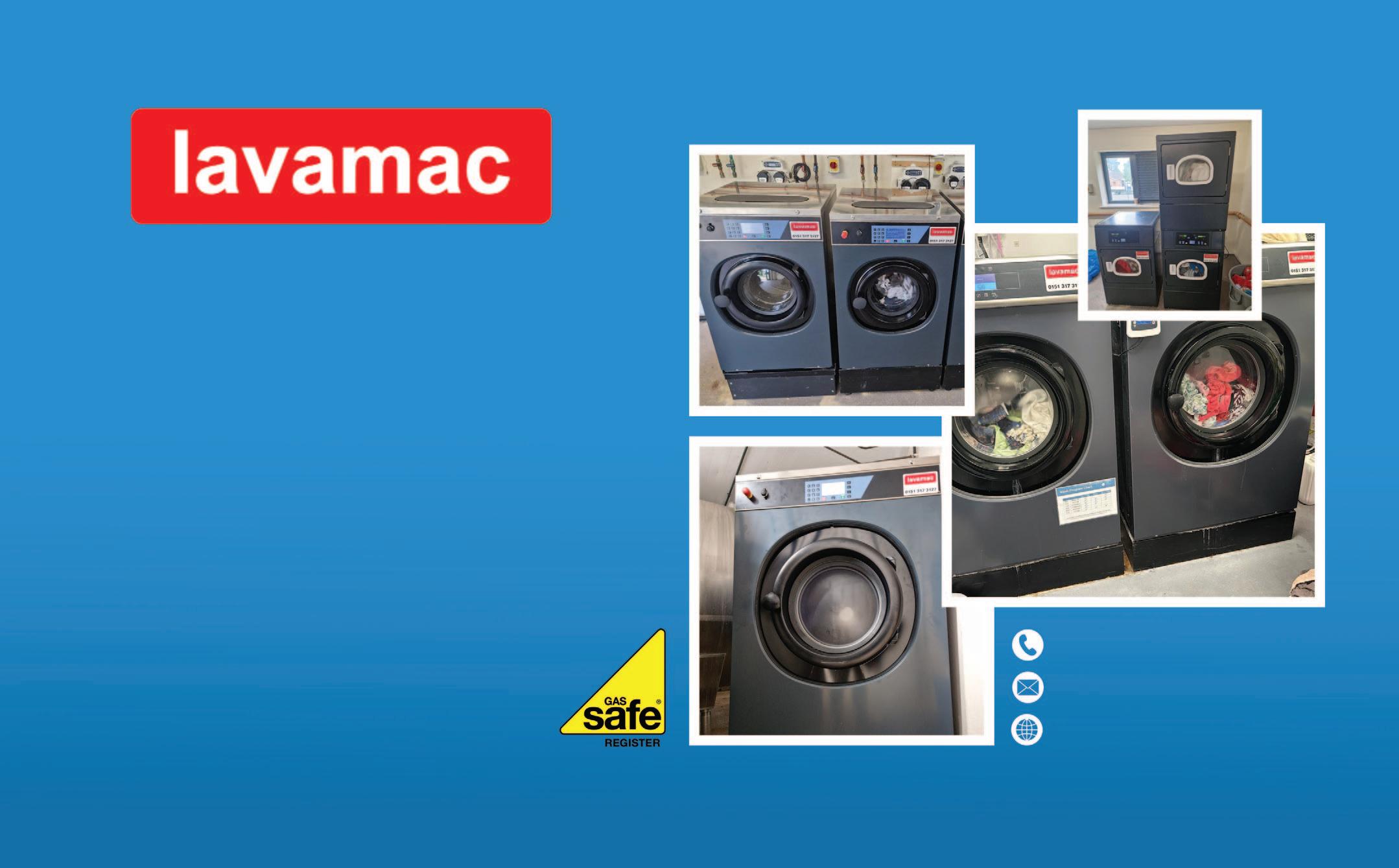
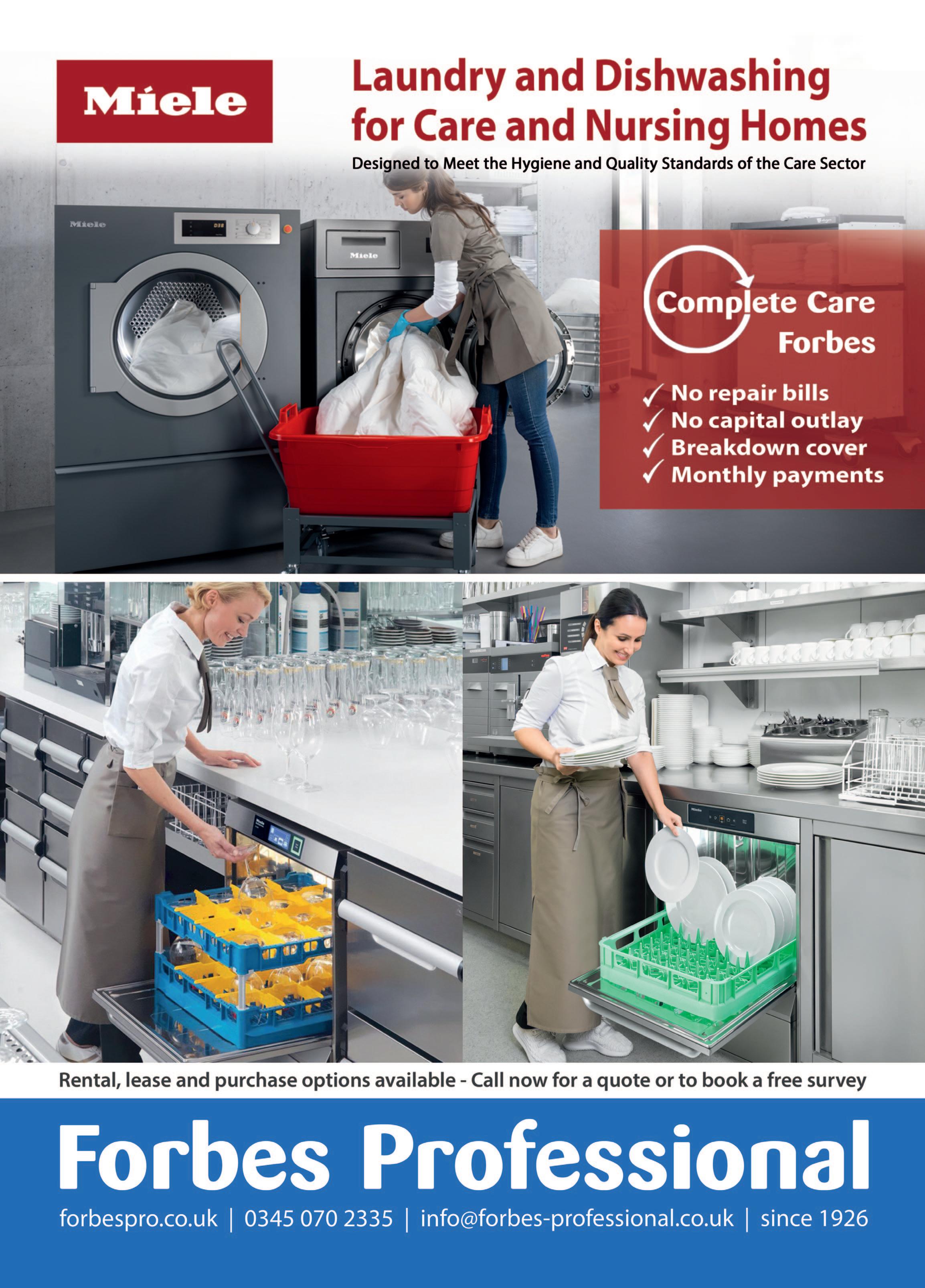
Pinpoint ltd, the UK’s leading provider of staff alarm systems to high-risk workplaces, has seen its P2 System installed in the UK’s first safe drug consumption facility, The Thistle.
The facility opened its doors on 13 January 2025 to provide a clean, safe space for the public to use drugs safely under clinical supervision. It also provides drug users with access to a wide range of treatment and support.
Pinpoint’s P2 Staff Attack System was chosen as the preferred staff safety alarm system to ensure the swift delivery of assistance in high-risk medical situations. Access to the Pinpoint P2 System ensures help can be summoned quickly providing staff with the peace of mind that help is forthcoming when they need it most.
Staff members at the Thistle will be given a personal alarm, or P2 PIT, at the start of each shift which can be activated if required with the simple press of a button.
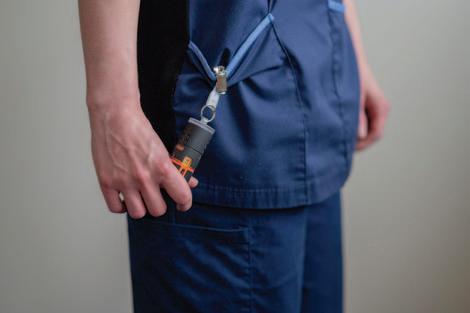
Once activated, the P2 PIT communicates with receivers located throughout the building, which in turn notifies display devices of the exact location and severity of the alarm call. This provides vital information to enable colleagues to respond appropriately.
Daniel Waring, CEO of Pinpoint Limited, said:
“Pinpoint is proud to be part of this UK first Safer Drug Consumption Facility. Having worked with The Hunter Street Health Centre, where The Thistle is based, since 2003, we are well aware of the challenges staff may face in their day-to-day duties.
“The P2 System, chosen for its precision, reliability and durability, will ensure staff can access a response when they need it most, allowing them to carry out their duties without fear and provide the highest quality of care.”
Visit http://pinpoint.ltd.uk for further information or see the advert on page 19.
Skopos Studio is a new design library idea from Skopos, enabling interior designers for Care to pick from a large range of designs to suit their project.
Categorised under different design types, such as ‘Botanical and floral, textures, stripes and checks’ this format provides choice for customers to select their end use and appropriate flame retardant base-cloth, and then select the designs and colourways which can bring their schemes to life.
The Studio collection provides a easy ‘go-to’ option containing design inspiration to create a Caring‘Home from Home’ experience. Skopos have a long history in print, with over 50 years of design experience which shines through in the Studio binder, with samples of all designs available via the

website.
Designs in Skopos Studio have been developed to work hand in hand with our beautiful accent collections and upholstery fabrics for a cross-section of projects. Choose from our fabric-only solution or a full-service option, including measure, product make-up (curtains, cushions, blinds and bed-throws) and installation. If you require something unique, our Bespoke service can offer custom colour options for a minimum meterage.
View the complete collection: www.skoposfabrics.com/studio-prints See the advert on page 4 for more information.
Chiltern Water & Environment was established in 1991 by Robert Hunt after gaining 25 years' experience as an operational and analytical scientist in the water supply industry. The company gained engineering and further management knowledge when David Hunt joined in 2012. Since then, other water industry professionals have added to the breadth of knowledge and experience within the company.
We have always provided high-quality consultancy, testing and remedial services in a professional but personable manner. Our steady growth has reflected our clients' trust in our services. Our current clients include large housing associations, pharmaceutical companies and facilities management companies, as well as individual landlords and small businesses. We ensure all our customers receive the same level of care and attention to detail.


Duty Holders of all commercial and public building premises are legally required to assess the risk from legionella to anyone using the water systems and put in place legionella control measures if required. The HSE has produced ACoP L8 and HSG274 as guidance for Duty Holders obligations.
We have clients throughout the South East, London and the Midlands, and carry out water tests nationally and internationally. We currently provide regular water sampling and testing for over 500 sites.
Tel: 01844 347678
Email: info@chilternwater.co.uk www.chilternwater.co.uk
See the advert on page 21 for more information.
Consort Claudgen’s innovation in the electric heating industry takes another leap forward by introducing Wi-Fi-enabled heaters to their low surface temperature (LST) range. These cutting-edge heaters offer unparalleled convenience and efficiency.
The heaters connect directly to Wi-Fi, enabling users to control heating through the digital control panel on the heater or via the Consort Connect app. With a comprehensive 7-day timer, which allows 24 individual heating periods per day, and features such as a lock function, open window detection, and custom automation, users can tailor their heating needs to their preferences.
Adding to the ease of use, users can view the energy consumption statistics of
all connected heaters, providing insights into usage patterns and potential savings. The LST heaters with Wi-Fi and occupancy sensors have a self-learning control ability. They utilise in-built occupancy sensors to detect and learn a user’s weekly presence in a room, creating an intuitive heating schedule. When the space is unoccupied, the heater conserves energy by switching to a setback temperature or frost protection mode.
BIM (Building Information Modelling) objects for the heaters are available for download from Consort’s website. 01646 692172 | sales@consortepl.com | www.consortepl.com
See the advert on page 5 for more information..
CareZips® Classic are patented, easy dressing unisex adaptive pants designed for older and disabled people suffering with problems associated with continence, mobility, mental function and cognition. Suitable for persons living in care institutions, receiving care at home or living independently at home, CareZips® Classic enable people to dress themselves or with assistance from carers.
CareZips® Classic feature patented 3-zipper system, which opens the front of the pants from the waist to the knees for quicker access during toileting, continence pads changes and personal hygiene. The forward positioning of the two side zippers lessens pressure on sensitive hip areas, helping to eliminate discomfort. The third zipper facilitates simple full frontal opening for faster more dignified diaper changes, catheter adjustments, personal cleansing and hygiene routines.
CareZips® Classic have many benefits for the older and disabled users and their carers:
• People dressing themselves enjoy the practical functionality and versatility of the
CareZips® Classic, all day comfort and easy garment care.
• People dependent on assisted dressing appreciate quick easy dressing process with less stress, embarrassment and greater dignity offered by CareZips® Classic.
• CareZips® Classic offer practical gains to the carers, helping them to provide better care, whilst reducing physical efforts and saving valuable time.
CareZips® Classic are unisex, available in 6 sizes and 3 practical colours (i.e. black, charcoal and navy). Tapered fit at the ankles gives a tidy appearance. Made from breathable moisture-wicking 4-way stretchy crease-free and easy-care durable fabric, CareZips® Classic are comfortable, practical and conveniently functional.
For more information, contact Win Health Medical Ltd - 01835 864866www.win-health.com
See the advert on page 3 for further information on Win Health’s product range.

At Little Islands, we understand the power of nostalgia in bringing comfort and joy to care home residents. Familiar surroundings, evocative sights, and meaningful sensory experiences can unlock treasured memories, sparking conversation and connection. For years, we have been crafting bespoke themed rooms and areas that do exactly that—transporting residents back to fond moments in their lives. However, bespoke designs often come at a premium, making them inaccessible for some care homes.
That’s why we have developed a range of standard themed packages, making it easier than ever for care homes to create high-quality, engaging spaces that foster reminiscence. Many homes have the capability to build themed areas themselves but sourcing appropriate and authentic content can be a challenge. Too often, well-intentioned efforts result in spaces that feel more like children’s play areas rather than immersive environments tailored for adults.

Our themed packages take the guesswork out of the process. Each package includes everything needed to transform a space, allowing your maintenance and care staff to set it up with ease. Most homes already have suitable furniture and decorative items to complement the theme, but we also offer optional extras to enhance and expand each setting as required.
Whether it’s a traditional British high street, a 1950s tearoom, or a classic seaside retreat, Little Islands’ thoughtfully designed themes ensure that your residents can enjoy a truly meaningful and immersive
Since our founding in 2010, Activities to Share has been dedicated to enhancing the lives of those in care by providing thoughtfully designed activity products. Our mission is to support activity coordinators in delivering uplifting, engaging experiences that foster connection, joy, and well-being.
We achieve this by listening closely to your feedback and evolving with your needs. Whether over the phone, via email, WhatsApp, or Live Chat on our website, our team is always ready to offer advice and help you find just the right products to bring your ideas to life.
While we embrace the convenience of technology to expand our resources and share knowledge, we remain firm believers in the irreplaceable power of sensory
experience. By stimulating multiple senses in a focused direction, these environments help trigger happy memories, encourage social interaction, and improve overall well-being.
With our themed packages, creating an engaging reminiscence space has never been easier or more affordable. Let’s bring back those cherished moments—together.
Our S.M.A.R.T. Room packages include:
Unique
• Traditional flame effect stove (For H&S the heat element is
• Double sided railway wall clock
• Themed Railway game and jigsaw puzzle
• Interior design Specification sheet
Contact us today on 01282 869802 or via hello@littleislands.org to discuss how we can help transform your care home.
See the advert on page 5 for more information.


engagement. That’s why we continue to make our Reminiscence Kits and Sensory Bags with real, tactile items that stimulate the senses. Some experiences—like popping bubbles for the splash, breathing in a familiar scent, or piecing together a puzzle with others—simply can’t be replicated on a screen. These sensory moments are invaluable in encouraging storytelling, sparking memories, and fostering conversation.
Our values remain rooted in this commitment to meaningful connection. We’re here to partner with you—the professionals on the front lines of care—to create a sense of structure, well-being, and fun for those who need it most.
Are you longing for your activity diary to be full? Look no further www.activitiestoshare.co.uk are here for you! See the advert on page 21 or: customers@activitiestoshare.co.uk
0117 966 6761 07900 6751 50
MOWOOT II – proven solution to chronic constipation without medication
Developed by a team of doctors and other healthcare professionals, MOWOOT II performs gentle abdominal massage to speed up intestinal passage in people experiencing chronic constipation.
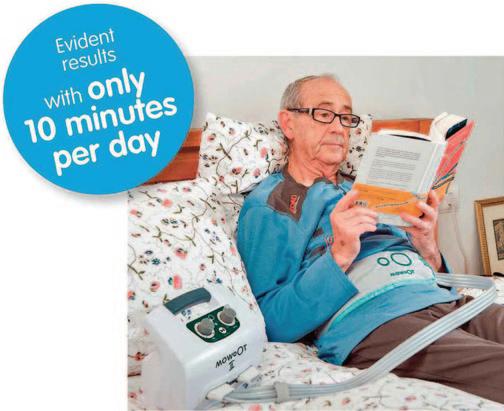
Clinically proven, safe and effective, relaxing and side-effects free, MOWOOT II Abdominal Massage Therapy System combats constipation and provides soothing relief to affected people. Easy to use and comfortable, the MOWOOT II treats and manages constipation in people with spinal cord injuries, multiple sclerosis sufferers, Parkinson’s Disease patients and people with constipation related to prescription medication. MOWOOT II also helps to relieve idiopathic constipation experienced by menopausal and post-
menopausal women and older and elderly people. In clinical studies MOWOOT II increased evacuation frequency, softened stools, improved regularity, reduced gasses, relieved bloating and eased off abdominal discomfort. 10 to 20 minutes daily of relaxing abdominal massage with MOWOOT II rapidly reduces symptoms of constipation.
Evident results are experienced only a few days after the first treatment. Regular abdominal massage with MOOWOOT II ensures lasting health benefits and better quality of life.
MOWOOT II – effective solution to chronic constipation for better quality of life!
Supplied by Win Health Medical Ltd - 01835 864866 - www.win-health.com See page 3 of this issue for other Win Health products. MOWOOT II for Constipation Free Life
REM have been manufacturing furniture for the Hair & Beauty Sector for over 100 years and are now considered to be one of the largest manufacturers in both the UK & Europe. Our exclusive designs and meticulous British workmanship offer customers a wide range of furniture for every conceivable Salon environment. Understanding the growing requirement for Care & Residential Home Salons the REM Design Team have produced the Pendle Care range for the small, compact Care Home Salon. This new range includes ergonomically designed, height adjustable styling chairs and
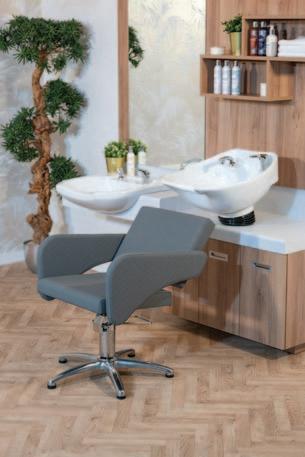
the Pendle Easy Wash Unit with two ceramic basins allowing frontwash with wheelchair access and a tilting backwash basin for the more able clientele. Should the need arise, our experienced Design Team can help you create a stimulating Salon environment for your clients. The REM Salon Interior Design Package which includes 2D and 3D AutoCad plans and visuals can be ordered for only £295 +VAT and is fully refundable on an order placement of £3000 or more. Contact us on 01282 619977 or email sales@rem.co.uk See the advert on page 17 for details.
The Oxford Up is an active manual stand aid, supporting assisted standing, seated transfers, and patient rehabilitation. Suitable for clients who require some assistance when standing but are able to participate and contribute effort to the process, the Up can also be deployed as a useful rehabilitation aid.
With a safe working load rating of 200kg (31st), the Up quickly disassembles into three separate components, significantly easing storage requirements and onward transportation. Reassembly takes a matter of seconds, and its ready for use again.
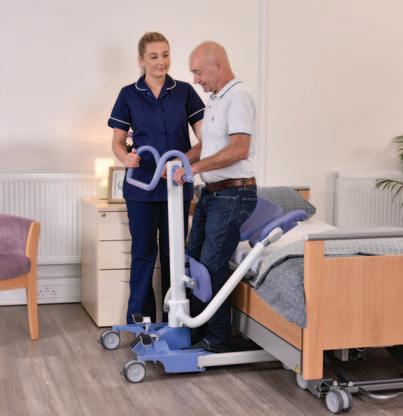
A large multi-point push handle aids manoeuvrability for the caregiver, and the foot push pad pro-
vides a means of generating forward momentum when moving a patient. Optimum positioning of the swing-away seat pads and knee support help ensure comfort for the patient. Adjustable leg opening allows closer access around furniture, promoting improved patient positioning and general ease of use. Additionally, the enclosed footplate ensures no accidental foot or toe entrapment associated with mechanical components.
Where additional seated support is required, the Oxford Deluxe Standing sling (With Clips) is fully compatible with the Up and available in three standard sizes: small, medium, and large. For more information including how and where to purchase, please contact the Oxford customer services team on 0344 811 1158 send an email to info@joerns.co.uk or visit our website at www.joerns.co.uk
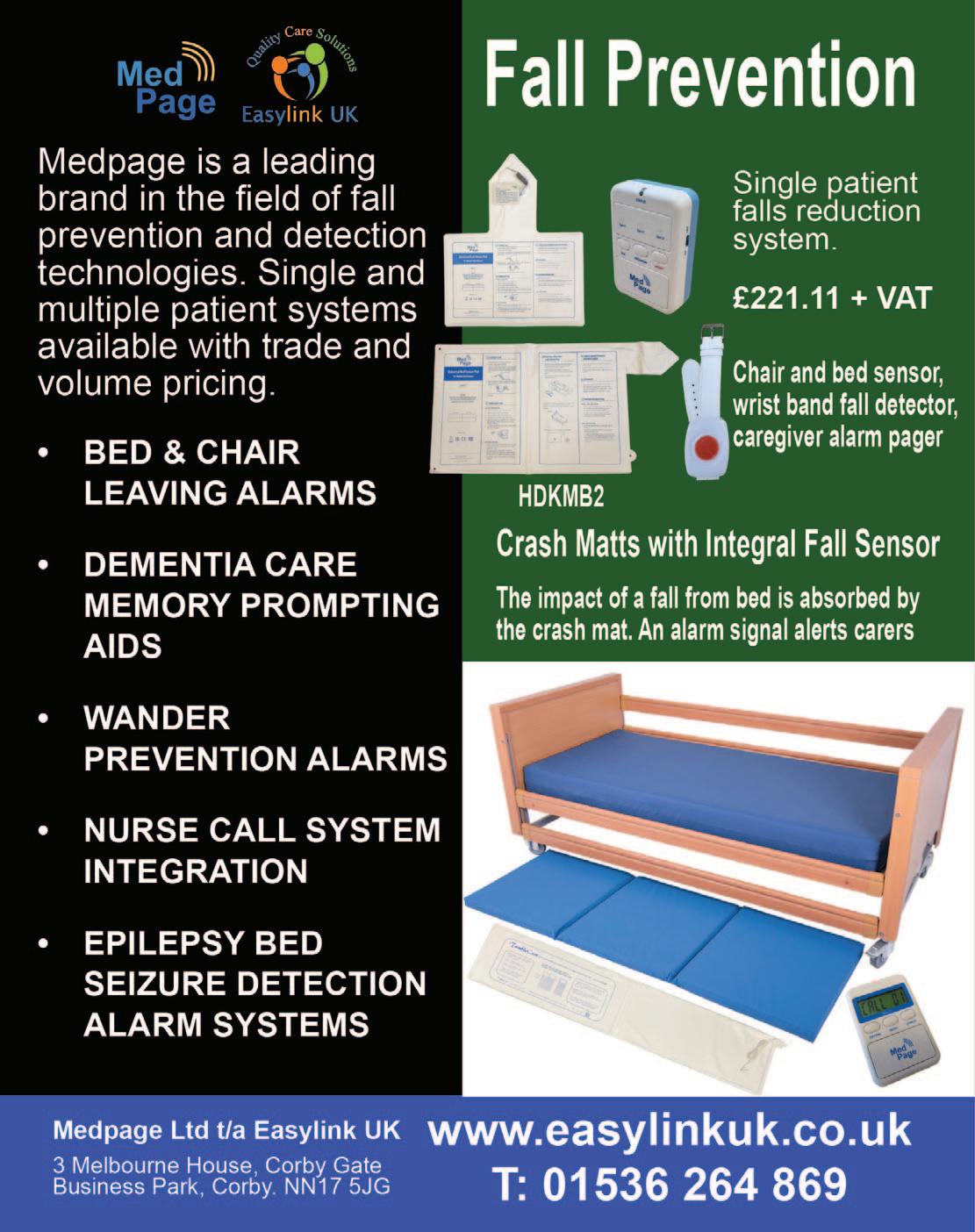
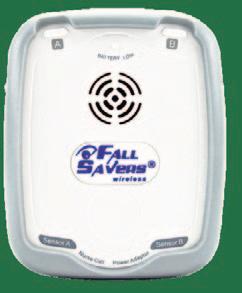

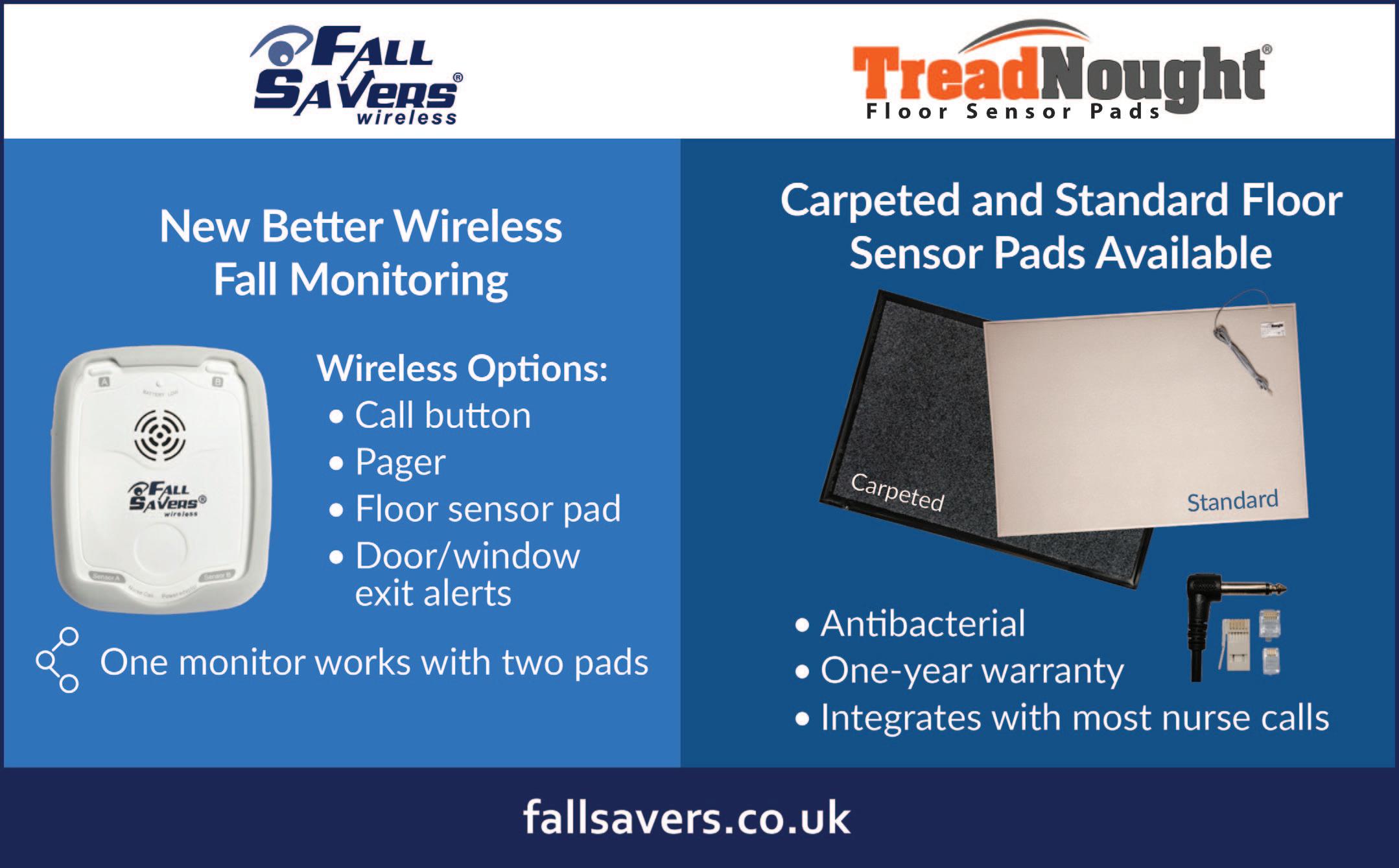
In the post pandemic world, we have all seen the effects of supply chain problems with the invasion of Ukraine and other alarming global factors, ever increasing costs of living and other more local issues which have driven up the rate of inflation over the last few years. The impact of this meant that most manufacturers of electronic products had to increase their prices as costs spiralled. This, of course, has impacted the end user. The most dramatic impact has been on the Care Industry. An industry that has lacked the support it desperately needs in these trying times.
Courtney Thorne, at the same time, took a strategic decision to take a close look at our core products, right down to component level, the objective being to make us less vulnerable to future global supply chain issues, and to reduce the cost of each product with the amin of ensuring that we deliver the same high quality product at a cost protected price. We had to ensure that this would happen without jeopardising the superb lev-
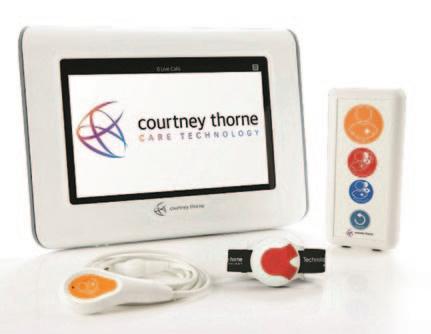
els of support we provide to our valued customer base.
This ground up review involved all departments from Research and Development right through to the Field Service team (and everything in-between). This in-depth collaboration took time as we had to ensure that each and every element was refined, perfected and tested to our (and our customers) rigorous requirements.
Whilst many organisations have limited-time or end of product line offers, we are very pleased to announce a price reduction on our core Connect and Connect Health Nurse Call system ranges. With flexible terms, full integration with Care Apps, celebrated service delivery and the most reliable and robust solution now at a new lower price, there has never been a better time to talk to us about a new nurse call system.
For more information email us at: info@c-t.co.uk or see the advert on this page.
Blaucomm’s Nurse Call Messaging Service (NMS) is the market leading solution to remove the dependency on noisy nurse call panels and pagers, through its intelligent software, which delivers the alerts straight to the care staff who need them.
Care homes are rapidly introducing smartphones for digital care planning and eMarnow, the same devices can be used to receive the nurse call alerts they need for the residents under their care.
Furthermore, Blaucomm NMS is deeply linked into Person Centred Software MCM, so call bell data is linked straight to care plans. This unlocks a huge benefit to care homes to enhance the staff performance with how they accept and respond to residents, which ultimately promotes better response times and visibility for management to audit their performance.

The best part is that Blaucomm NMS links into your existing nurse call system - we work with all major
brands such as Aidcall, ARM, Courtney Thorne, C-TEC, ENS, Intercall, Medicare, SAS and TeleAlarm.
Care operators are constantly recognising Blaucomm NMS for its reliability and dependability to their care operations, which is why we’ve been chosen time and time again over other solutions.
Head of IT Trudi Harrow at WCS Care had this to say about Blaucomm NMS:
“We find Blaucomm is a genuinely fantastic company with a reliable product. "We would highly recommend this to anybody who wants to replace expensive pagers and silence those annoyingly loud nurse call screens!”
To find out more about Blaucomm NMS, visit
www.blaucomm.co.uk/healthcare
See the advert page 5 for more details.
Medpage Limited has collaborated with a leading UK manufacturer of crash mats to deliver a cost-effective tool for falls management strategies. The inclusion of the new TumbleCare full-length pressure mat sensor ensures that should a patient tumble out of bed, an alarm signal is generated to alert care staff to the incident, resulting in a recordable improvement to patient safety and service.
Crash mats act as a protective barrier, absorbing the impact of a fall and reducing the risk of serious injuries when a person tumbles out of bed. Beneficial for individuals who are at high risk of falling, such as older adults, patients recovering from surgery, or those with neurological conditions such as epilepsy.
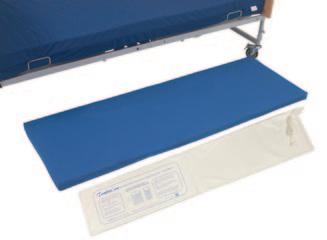
Falls can pose significant risks, especially in healthcare settings and senior care facilities. Every year, thousands of people suffer injuries due to falls from beds and other furniture. To prevent these accidents and ensure the safety of patients and residents, it is essential to implement effective falls and safety management strategies.
Further details can be obtained by telephoning 01536 264 869 or emailing sales@easylinkuk.co.uk
See the advert on page 2 for details.
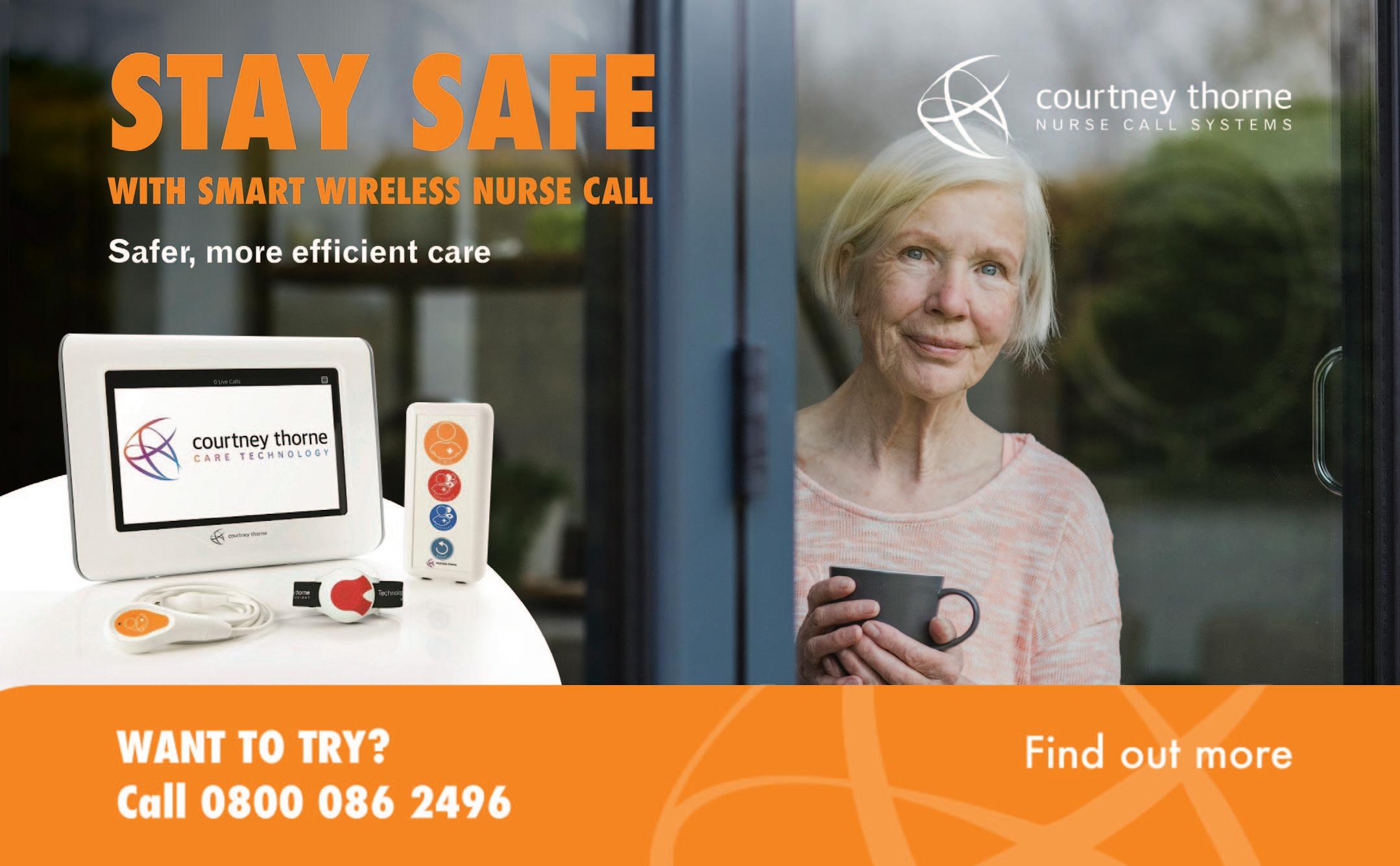
Cyber security is an increasing concern in social care, with data breaches, phishing scams, and cyber attacks putting sensitive information and essential services at risk. However, learning about cyber security can often feel overwhelming, full of jargon, and difficult to apply to everyday situations. That’s where the Digital Care Hub’s new Cyber Game comes in—an engaging, interactive way for adult social care providers to learn vital cyber security skills.
Learning doesn’t have to be dull. In social care, where training is essential but time is scarce, gamification—using game-like elements such as quizzes, rewards, and interactive challenges—makes learning more engaging and memorable. It provides a safe space to learn and make mistakes, increasing engagement, motivation, and knowledge retention. Gamification also allows for instant feedback and supports long-term behaviour change, making it an effective tool for cyber security training.
THE FIRST-EVER CYBER GAME FOR SOCIAL CARE
The Digital Care Hub has launched the first-ever Cyber Game designed specifically for adult social care providers. It offers a fun and practical way to learn about cyber security and data protection, helping care managers, care workers, and other staff members develop the skills they need to keep their organisation safe.
The Cyber Game takes players through real-world scenarios relevant
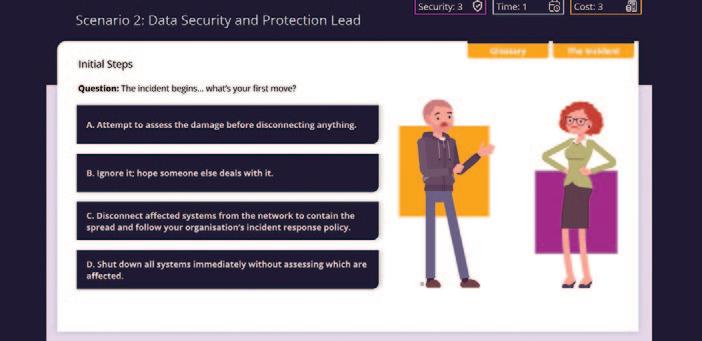
to social care settings, making it easier to recognise and respond to cyber risks in a safe environment. Whether it’s identifying a phishing email, ensuring secure data sharing, or responding to a cyber incident, players gain hands-on experience that translates directly to their work environment.
One of the biggest challenges in cyber security training is making it relatable. The Cyber Game brings cyber risks to life through realistic characters and workplace situations. Players can take on the role of a registered manager, a data protection lead, or a care worker, each facing different cyber threats.
Each scenario is based on real cyber incidents that have affected
social care providers. The goal is to manage the crisis effectively—containing the damage, notifying the right people, and implementing steps to prevent future incidents. Decisions impact security, time, and cost, requiring players to balance risk and consequences.
WHY GAMIFY CYBER SECURITY TRAINING?
Daniel O’Shaughnessy, from the Digital Care Hub, explains:
“We created the Cyber Game to make cyber security training more accessible and engaging. Gamification encourages active participation and helps staff retain information better, making learning feel rewarding and practical.”
WHAT CARE STAFF SAY
Care staff who tested the game found the scenarios helpful and realistic:
“These are good scenarios – typical and indicative of what may occur and give people an idea of what they need to be thinking about.”
Through interactive decision-making, players experience the consequences of their choices, reinforcing key lessons in a way that traditional training cannot.
TRY THE CYBER GAME TODAY!
The Cyber Game is available online, completely free to play. It’s a great way for care providers to improve their cyber security awareness in an engaging and practical way.
Play the game online at: www.digitalcarehub.co.uk/cyber-game
The delivery of safe care is the paramount responsibility of social care providers. Central to achieving this is the governance framework adopted by service providers. And at the core of this framework are policies and procedures. These enable the provider to comply – and evidence compliance –with relevant legislation and regulations, as well as facilitating best practices, supporting business needs, and assisting in recognising and managing risks.
Providers have a legal duty of care to the people they employ. Policies and procedures should provide clear guidelines to staff on how the organisation operates, as well as informing them of best practices and processes to be followed.

Policies should be reviewed annually as a minimum to ensure they are still fit for purpose and align with legal and regulatory requirements. They should be reviewed not only by
employees of the business, but also by experts in various subject matters (e.g., infection control or medicines management).
For many small- to medium-sized providers, there may not be the in-house skills, knowledge, and experience to complete such a robust annual review. Many choose instead to purchase their policies and procedures from a reputable provider like W&P Compliance & Training, who will also complete reviews and ensure their policies and procedures remain up to date. This way a provider not only ensures they remain compliant; they also benefit from best practice policies and procedures that provide a solid foundation for safe working practices and – ultimately – protect and support service users and staff. Ben Erskine – Director at W&P Compliance & Training www.wandptraining.co.uk | Tel: 01305 767104 See the advert on page 2 for further information.

Training care home staff is vital for delivering high-quality care, especially when managing complex resident needs such as dementia, frailty, and mental health challenges. However, traditional methods often fall short in engaging staff, leaving critical gaps in understanding and preparedness. Innovative approaches, such as game-based learning and peer-to-peer collaboration, are revolutionising training, particularly in addressing the ethical and legal challenges of restrictive practices.
Restrictive practices—measures that limit an individual’s freedom—are sometimes necessary to ensure safety. However, they must be applied with great care, adhering to legal frameworks and ethical guidelines to protect residents’ dignity. A groundbreaking digital training resource, co-designed by Queen’s University Belfast and Focus Games, exemplifies this innovation. The resource uses interactive, expert-driven content to help staff navigate restrictive practices responsibly and effectively.
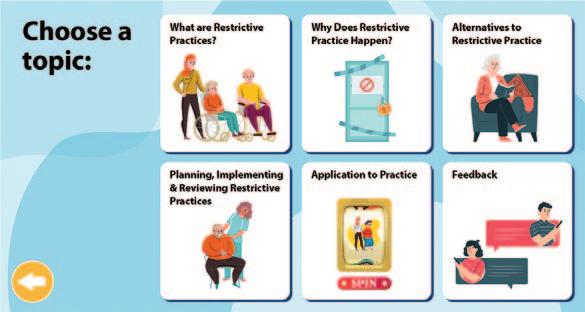
Game-based learning plays a central role, transforming topics like restrictive practices into engaging,
real-world scenarios. Simulations allow staff to explore ethical dilemmas, practice decision-making, and test alternative solutions in a safe, low-pressure environment. This approach enhances critical thinking, teamwork, and retention of essential knowledge.
Peer-to-peer learning further strengthens the training by encouraging staff to share experiences and insights, fostering collaboration and practical problem-solving. This creates a dynamic learning environment where staff feel supported and empowered to deliver compassionate care.
By integrating these modern approaches, care homes can elevate training into a meaningful experience, equipping staff to balance safety with residents’ autonomy and dignity. At Focus Games, we are proud to offer tools designed to empower care home teams through innovative training. Visit www.FocusGames.com or email info@focusgames.com to learn more about our Restrictive Practice resource and how it can enhance care home outcomes for residents and staff alike. For further information see the advert on the front of this issue
By Chris Sparling, Senior Director,

In the care industry, reputation is everything. Choosing a care facility or in-home provider is a deeply personal decision based on location, budget and individual needs. It’s also based on trust. Families rely on providers to deliver quality care, so a strong reputation is essential. In the UK, adult care homes are rated by official bodies like the Care Quality Commission (CQC) and by residents and their families. However, as the CQC undergoes reform, personal feedback and reviews have become critical in offering an unfiltered view of the resident experience.
Selecting a care facility or in-home provider is a deeply personal decision based on trust, location, budget, and individual needs. Families rely on providers to deliver quality care, so a strong reputation is essential.
EMERGING TRENDS IN THE CARE INDUSTRY
The growing reliance on authentic reviews offers facilities an opportunity to set themselves apart and offer the insights prospective patients seek. Yet, a recent research report reveals that in-home care providers average just nine reviews annually, with the top 20% receiving fourteen reviews. This indicates a gap in review engagement that providers can turn into an opportunity.
The difference between a trusted care facility and a questionable
one often comes down to how effectively a provider manages its reputation. Managing various listings and online reviews can weigh heavy on a facility with stretched resources.
ENCOURAGING AUTHENTIC REVIEWS
The true measure of reputation comes from the experiences shared by current and former residents and their families. Proactively soliciting feedback is powerful - 22% of the public report they leave reviews when asked. A steady flow of fresh feedback prevents outdated sentiment from impacting perception. In a market with such high demand for care home places, this could have serious consequences.
Reviews need to be managed and cultivated as part of continuous improvement within customer service, as they’re one of the primary indicators of quality.
BUILDING TRUST WITHIN THE COMMUNITY
It is important that reviews are managed transparently, so providers can build trust with their current and future patients. The same report found that top-performing care providers respond to over 80% of reviews, while the industry average lags at 68%. However, these numbers drop significantly for negative reviews, which is a missed opportunity.
Acknowledging both positive and negative feedback is crucial for building credibility. Doing this will reassure prospects that a facility is open to listening and proactively addressing concerns. Filtering reviews to exclude the negative ones presents an unrealistic image and will deter prospects evaluating whether a facility is the right one for them.
PROMOTING RESIDENT AND FAMILY SATISFACTION
Responding to online feedback is an extension of customer service quality, and many prospective patients seek this level of engagement. By providing thoughtful and timely responses, care providers can
at
increase customer satisfaction and strengthen their overall reputation.
Facilities that listen to residents and their families, and take proactive steps see improved satisfaction and stronger relationships with those they serve. Addressing negative reviews can even turn challenges into positive outcomes.
Industry leading providers are already leveraging technology to maximise the impact of online reviews. Many automate review responses, ensuring that every reviewer feels respected and appreciated. This approach also eases the pressure on internal resources by streamlining the feedback response process.
Moreover, facilities can use data from reviews to identify strengths and weaknesses, addressing areas of concern proactively. For those with smaller budgets, data-backed insights help allocate funds effectively, so that the focus remains on what matters most to residents and families. Whether that’s staff excellence or a provider’s welcoming environment, marketers should highlight these strengths in their promotional materials, and use customer feedback as a way to validate them.
Care providers should embody their commitment to people-centred service in their online interactions, regardless of whether feedback is positive or negative. Reputation management is a crucial part of this commitment, as it ensures that patients feel valued and heard, while offering sought-after insights to those trying to make big decisions.
With the right tools and strategies in place, care providers can harness the power of online reviews to build trust, improve satisfaction, and build a lasting reputation that resonates with both current and future residents.

In an age where data breaches and cyberattacks are increasingly common, cybersecurity is a critical priority for all organisations, including nonprofits and charities. Protecting sensitive data—such as donor records and beneficiary details—is a round-the-clock responsibility that demands both organisation and vigilance. This is where Security Operations Centre (SOC) systems come into play, offering a powerful way to strengthen your defences, even on a tight budget. WHAT IS A SOC SYSTEM?
A Security Operations Centre (SOC) is a centralised framework—often a combination of software, tools, and processes—designed to monitor, protect, and manage an organisation’s information systems and networks against cyber threats. Whether through in-house teams or external ser-
vices, a SOC uses advanced technologies to detect, analyse, respond to, and prevent cybersecurity incidents in real-time. Why Are SOC Systems Important?
The consequences of a successful cyberattack can be catastrophic, from financial losses to reputational damage, and the risks are growing each year. Cybersecurity is no longer a one-off task but a complex, ongoing effort requiring expertise, proactive monitoring, and rapid response capabilities. For nonprofits and charities, where budgets are often stretched thin, a SOC system offers an efficient solution. It provides 24/7 network monitoring, identifies vulnerabilities before they’re exploited, and helps mitigate threats swiftly, reducing the likelihood of a breach.
BENEFITS OF SOC SYSTEMS FOR NONPROFITS AND CHARITIES
1. Proactive Threat Detection and Response: Equipped with sophisticated tools, SOCs can spot potential risks early and respond immediately, minimising damage.
2. Compliance Support: By monitoring data protection practices, SOC systems help charities meet standards like GDPR or CQC requirements, avoiding costly penalties.
3. Unified Security Management: Many SOC solutions integrate with popular antivirus and network security tools, letting you oversee everything from a single platform.
4. Scalable for All Sizes: Whether your organisation is large or small, SOC systems can adapt to your needs.
SES SOC FREE SYSTEM OFFER
SES Computers, with over 20 years of success in the healthcare sector, believes it’s time to give back. We’re excited to announce a unique opportunity for UK charities and nonprofits: free access to our Security Operations Centre (SOC) services.
No
By Philip Douglas, founder and CEO of Compleat Software

As the CEO of Compleat Software, I have worked closely with care providers and understand the challenges they face, as well as the growing demand for AIdriven solutions reshaping the sector. With rising costs, workforce shortages, and increasing demand for quality care, AI has moved beyond being a trend; it is now essential for sustainability and efficiency.
Recognising this urgency, the UK government has launched initiatives to accelerate AI adoption in healthcare and care homes. The recently announced AI Opportunities Action Plan aims to integrate AI across public services, including the NHS, modernising patient care and streamlining operations. Investments in AI-driven diagnostics, workforce planning, and predictive analytics are already helping to improve health outcomes while reducing pressure on frontline staff.
However, care providers also face financial pressures due to policy changes, such as the National Insurance rise, which significantly impacts workforce costs and operational budgets. The increased employer contributions make it more expensive to recruit and retain staff, worsening an already strained sector. While AI can help mitigate some of these cost pressures through automation and efficiency gains, the sector needs more strategic financial support from the government to ensure AI adoption remains viable.
The recent National Insurance rise has placed additional financial strain on the care sector, which is already grappling with underfunding and workforce shortages. Care providers must now contribute more to employer National Insurance payments, increasing staffing costs at a time when recruitment and retention are critical challenges. This policy change directly affects operational budgets, forcing care homes and domiciliary care services to reallocate resources from patient care to cover additional tax burdens.
AI-driven automation offers a potential solution by reducing administrative workloads and optimising workforce planning. AI-powered HR management tools can help forecast staffing needs and prevent over-reliance on expensive agency workers. Similarly, AI-driven procurement and financial management systems can identify cost-saving opportunities, making it easier for care providers to navigate these financial pressures while maintaining service quality.
Care organisations have long struggled with manual processes that consume valuable time and resources. Whether managing procurement, staffing, or patient care, outdated systems often lead to inefficiencies and high costs. AI is now enabling care professionals to focus on what matters
most, delivering high-quality care. By automating routine tasks, AI improves efficiency, allowing staff to dedicate more time to patient wellbeing rather than administrative burdens.
NHS England Abolition – What This Means for Healthcare Procurement
Keir Starmer’s proposed abolition of NHS England signals a major shift in the structure of healthcare delivery and procurement. While details remain under discussion, the potential restructuring could have significant implications for how care providers source medical supplies, manage contracts, and integrate AI-driven solutions into their operations. A decentralised approach to procurement could offer more flexibility but may also lead to inconsistencies in funding and support for AI adoption across different regions.
For care providers, this change underscores the importance of AI-driven procurement systems that can quickly adapt to evolving regulations and supply chain challenges. AI-powered platforms can streamline vendor management, track spending trends, and ensure compliance with new procurement policies, helping care organisations navigate this transition more effectively.
AI FOR WORKFORCE PLANNING AND HR MANAGEMENT
Staff shortages and high turnover rates have long been challenges in healthcare. AI-powered predictive analytics are now assisting HR teams in anticipating workforce needs, reducing staff turnover, and improving job satisfaction. AI-driven tools also streamline shift planning, ensuring optimal staffing levels and reducing the strain on care professionals. Virtual assistants are further relieving administrative burdens by handling routine HR inquiries, allowing staff to focus on more meaningful work.
ENHANCING PATIENT CARE THROUGH AI
Beyond finance, AI is transforming patient care. Electronic health records (EHRs) powered by AI can detect health risks early and recommend proactive interventions. By analysing patient data in real time, healthcare professionals can make faster, more informed decisions, reducing hospital readmissions and improving patient outcomes. AI-driven care management tools allow care facilities to maintain high service levels while optimising costs.
AI-POWERED VIRTUAL ASSISTANTS AND PATIENT ENGAGEMENT
AI-powered virtual assistants are also improving patient engagement. These tools help with medication reminders, appointment scheduling, and answering health-related queries, providing round-the-clock support. By handling these routine interactions, AI reduces the strain on caregivers, enabling them to focus on more complex patient needs. The result is a
more efficient system where patients receive timely assistance while care professionals are freed from repetitive administrative tasks.
PREDICTIVE ANALYTICS IN PREVENTATIVE CARE
One of the most exciting AI applications in healthcare is predictive analytics for preventative care. AI can analyse vast amounts of patient data to identify individuals at risk of developing serious health conditions. Early intervention helps reduce hospitalisation rates and improves long-term health outcomes. Some care facilities have already prevented emergency hospital visits by detecting subtle behavioural changes that might otherwise go unnoticed. This proactive approach not only saves lives but also alleviates financial pressure on healthcare providers.
AI FOR INDEPENDENT LIVING AND REMOTE MONITORING
The UK government is also investing in AI-driven technology to support independent living. AI-powered sensors can monitor daily activities in care homes, identifying unusual patterns and alerting caregivers when needed. This technology helps vulnerable individuals live independently for longer while reducing the burden on residential care services.
AI has also revolutionised remote monitoring and telemedicine. Wearable health devices now use AI to track patient vitals in real time, allowing healthcare professionals to identify potential health concerns before they escalate. This proactive approach is particularly valuable for elderly patients and those with chronic conditions, reducing hospital visits and improving overall patient wellbeing.
The future of AI in healthcare is vast, with continuous advancements reshaping the sector. From robotic caregivers assisting with daily tasks to AI-driven mental health support systems, innovation is driving a smarter, more efficient, and compassionate care model. Organisations that embrace AI today will be at the forefront of this transformation, positioning themselves as leaders in the evolving care landscape.
For care providers considering AI adoption, now is the time to act. AI’s ability to optimise processes and elevate care quality is already evident, and as technology advances, it will become an integral part of delivering high-quality care in an increasingly demanding world.
By leveraging AI, we are not just reducing costs; we are enabling a future where care professionals can focus on what truly matters: improving the lives of those they serve. The care sector is evolving rapidly, and AI is at the heart of this transformation. Those who embrace it now will shape the future of healthcare for generations to come.


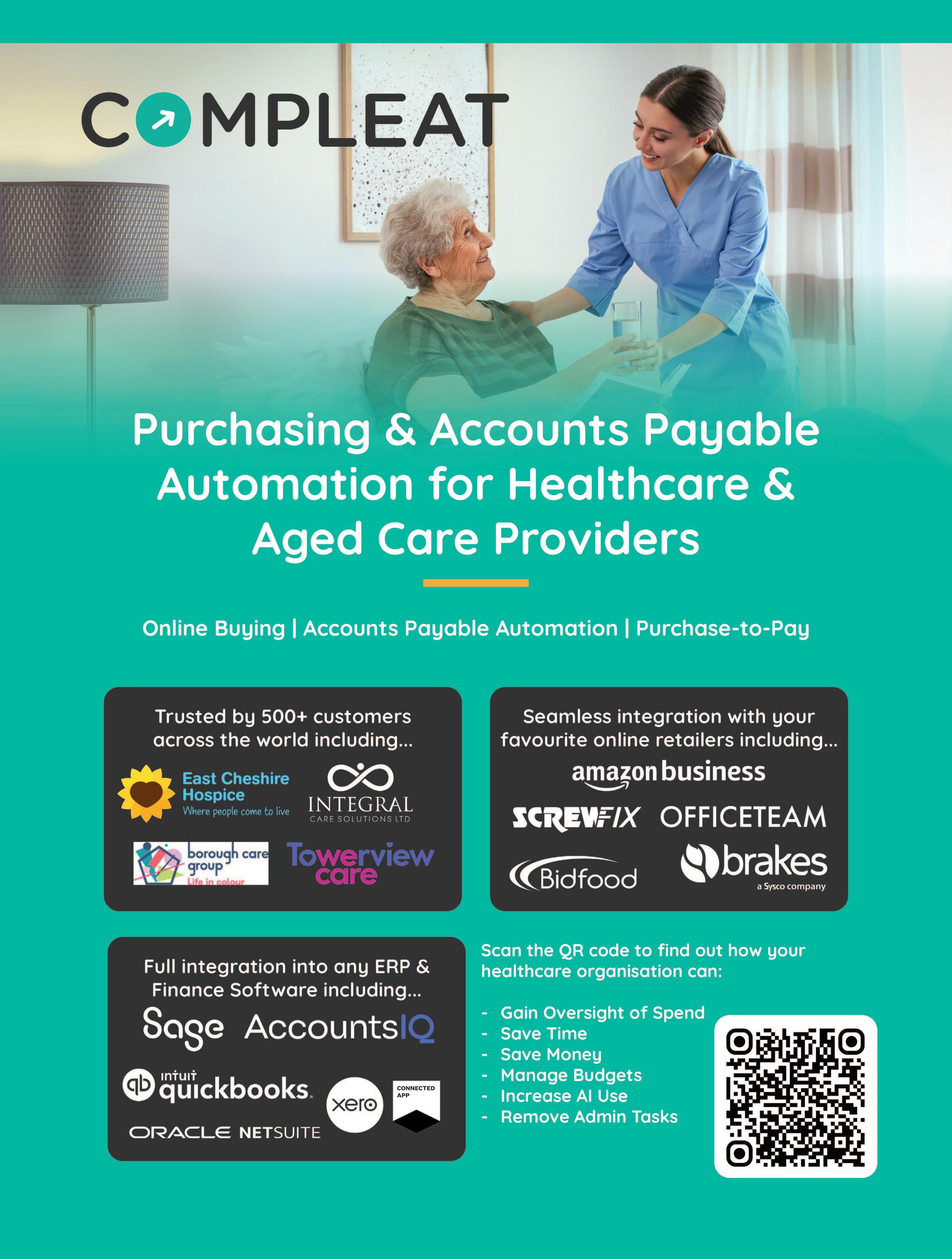
The social care sector has come a long way when it comes to digital transformation, and artificial intelligence (AI) is a big part of its future. While AI is still finding its place in many care settings, the impact it can have is huge.
Here’s a closer look at why AI is set to make waves in social care:
1. BOOSTING EFFICIENCY
AI can help handle those resource-draining tasks in seconds. Whether it’s crunching a mountain of data, summarising care notes, or suggesting next steps, it frees up your team to do what they do best.
It can also improve communication, such as helping new team members quickly access policies or answer routine questions without waiting for assistance. By handling these background tasks, AI allows organisations to redirect resources to other core priorities.
2. ENSURING PERSON-CENTRED CARE
AI can support your teams when providing persona-centred care by analysing data over time, so they can build tailored plans that align with each individual’s goals, preferences, and abilities. It can even predict future needs, flagging issues before they arise so your team can act proactively.
3. ENHANCED MONITORING
Care organisations often operate round-the-clock, and AI can offer
Pass by everyLIFE
PASS supports over 1,000 care providers every day, giving them access to market leading care management tools hand in hand with unlimited 24/7/365 support from our dedicated and friendly PASS team.

Assured by NHS Transformation Directorate, PASS provides a secure platform that allows you to plan, record and evidence the care you deliver. The only assured solution built specifically for the home care sector, it provides comprehensive real-time functionality and allows you to share progress against outcomes with customisable, exportable reports.
CARE PLANNING AND ROSTERING FROM A SINGLE PLATFORM
real-time monitoring to support this. For example, AI can highlight subtle behavioural changes, like someone sleeping poorly or becoming more withdrawn. These insights can alert your teams to potential concerns early, which means better, faster decisions can be made to support your clients.
For organisations, this level of tracking ensures care quality stays high, without adding to the workload. It’s like having an extra layer of support that’s always on duty.
4. EMPOWERING TEAMS
AI is here to help empower your care teams, not replace them. AI tools can provide instant recommendations or resources, which could help your newer employees confidently manage unexpected situations. Similarly, AI can assist with summarising care notes or giving quick access to up-to-date best practices, helping your teams provide the high-quality care they work so hard to deliver.
5. OPTIMISING COSTS
One of the big wins of AI is its ability to do more with less. By automating tasks and making resource allocation more efficient, it can help organisations manage tight budgets without compromising on care.
AI can even help reduce staff turnover by easing workload pres-
To meet the wider needs of the PASS community All-in-one PASS has recently been launched , bringing advanced rostering functionality to our established digital care planning platform. As a result advanced staff scheduling, payroll and invoicing functionality is now seamlessly linked with care planning and reporting, reducing the technical complexity, risk and overhead associated with integrating two separate systems.
As a result, PASS now provides an all-in-one suite of digital care management tools, available from a single platform, designed to:
Save you time
Increase the efficiency of your teams
Improve the quality of care
Deliver better outcomes

Our commitment to the continual evolution of PASS is further illustrated by the addition of GP Connect. The first product of its type to offer this feature, PASS is still one of only a handful of digital care
sures, which means savings on recruitment and training costs too. Plus, because AI solutions are scalable, it can adapt to your organisation's needs.
THE FUTURE OF AI IN CARE
AI in social care isn’t about replacing people with tech. It’s about giving your teams the time, insights, and tools they need to focus on the people they care for. That’s why OneAdvanced AI, the first UK hosted fully secure, private AI tool for businesses, was created. OneAdvanced AI can help care providers improve efficiency, deliver person-centred care, and empower teams, all while safeguarding your data. This marks a significant step towards a more innovative and sustainable future in social care.

Find out more at: www.oneadvanced.com/ai
management solutions to have completed this NHS Digital integration, and is the only one offering it to the home care market. PASS GP Connect provides authorised social care staff with realtime access to their client’s GP records. It makes medical information available when and where it is needed, leading to improvements in both care safety and outcomes:
Visibility of allergies, vaccinations and medications, especially useful for clients unable to reliably share their personal information Using medical information to inform care planning
Ensuring that the right medication is delivered to the right person in the timeliest manner. In one case, this allowed the administration of antibiotics on a Friday evening, aiding the service user’s swift recovery from infection
Available to all PASS users at no additional cost, PASS GP Connect is significantly more efficient than waiting for a GP response. It’s also a positive step forward on the path to the DHSC’s goal for widespread digitally enabled care and is in full alignment with their ambition for joined up care for everyone.
Get in touch: www.everylifetechnologies.com hello@everylifetechnologies.com





By Fozia Iqbal, Senior Business Immigration Solicitor at

Reports of exploitation, including unfair wages and poor working conditions, have drawn increased government attention to the treatment of overseas workers in the care sector. With a critical staff shortage, many businesses depend on international recruitment to fill vacancies, adding to concerns about worker welfare.
The Home Office has intensified its crackdown on non-compliant employers, with severe consequences for those who fail to meet legal and ethical obligations. Compliance with immigration and employment laws is no longer just an administrative requirement but an essential strategy for protecting business operations, reputations, and, most importantly, the wellbeing of workers.
To hire overseas care workers legally, care business owners must navigate a complex regulatory framework. They must obtain a sponsor licence issued by the Home Office, through which they can sponsor overseas health and care workers for a Skilled Worker visa, which is the primary route for recruitment, but this visa comes with strict sponsorship obligations. Employers must make sure that all hired workers have valid visas and are working in compliance with their visa restrictions and their sponsorship. Employers would need to implement correct right to work check policies and ensure they are meeting minimum salary requirements, can provide work that meets the contractual hours of work offered, and the employees are undertaking duties which fall strictly within the role for which they have been sponsored.
Additionally, all employers must ensure that their employees’ employment conditions align with legal requirements, for instance, providing safe working environments, adequate training, and following proper recruitment procedures. Fundamentally, overseas workers must receive their full rights and entitlements such as fair pay, breaks and leave, with no discrimination. Any deviation from these standards can place a business at significant risk.
THE GOVERNMENT’S CRACKDOWN ON NON-COMPLIANCE
The UK government is taking decisive action against care providers who fail to protect overseas staff. Increased inspections and audits are being carried out, with penalties ranging from significant fines to licence revocations and outright business closures. Employers found guilty of exploitation or modern slavery
offences face criminal prosecution, and businesses that lose their sponsor licences will lose their sponsored workers and be unable to hire overseas staff in the future.
In addition to heightened inspections, the Home Office is working closely with other regulatory bodies to share intelligence and data on non-compliant practices. This collaboration enhances the government’s ability to detect irregularities and enforce penalties swiftly, ensuring that any rogue employer faces immediate consequences. Such coordinated efforts not only deter potential offenders but also reassure compliant businesses that the sector is being rigorously monitored.
This increased enforcement underscores the necessity for care home owners to maintain high standards of employment practice. Failing to comply with legal obligations does not only jeopardise individual businesses but also tarnishes the reputation of the sector as a whole.
ETHICAL EMPLOYMENT:
Beyond legal obligations, treating overseas workers ethically is a crucial element of running a successful business. Providing fair pay, ensuring reasonable working hours, and fostering a safe and supportive environment contribute to higher job satisfaction and better staff retention. In an industry where continuity of care is essential, a stable and motivated workforce is invaluable.
Ethical employment also enhances a business’s reputation. Care businesses known for fair treatment of staff find it easier to attract both workers and clients. By proactively adopting fair employment practices, organisations safeguard their operations from legal risks and cultivate a more committed and engaged workforce.
To protect your business and your staff, you should regularly review your employment practices. By conducting internal audits, training staff on compliance obligations, and seeking professional legal guidance, you can help ensure ongoing adherence to the law. Being proactive in compliance not only mitigates legal and financial risks but also encourages a positive workplace culture.
Looking to the future, it is vital for care providers to establish a culture of continuous improvement in compliance. Regular training sessions, clear communication of legal updates, and robust internal controls can help your business stay ahead of regulatory changes. Embracing technology to monitor recruitment and employment processes further supports transparency and accountability, ultimately benefiting both your staff and the reputation of your business.
As the government continues its strict stance on non-compliance, you should take immediate action to ensure your recruitment and employment processes align with legal and ethical standards. Now is the time to assess your business’s current practices, implement necessary improvements, and secure the future of your business by treating overseas workers with the fairness and dignity they deserve.
By Katarina Morgan, Associate Solicitor
at Taylor Walton Solicitors (www.taylorwalton.co.uk)

An issue which frequently arises for care home operators is when they need to make a financial claim against the estate of a deceased resident for unpaid or outstanding fees. This can be complicated if the former resident was married but most of their assets are tied up in the marital home which their spouse still lives in. Another common situation is where there are insufficient funds left in the estate and the former resident would have qualified for Local Authority funding had they survived.
To manage these situations effectively, it is best practice to maintain good records of the contractual terms agreed, of fees due and invoices raised and what is outstanding. This helps prevent parties disputing the quantity of the bills, or where executors were unaware of what had been agreed.
It is hoped the care home operator has a good rapport with the deceased’s family so they can sensitively approach them with the outstanding invoices and ask them to be included as debts of the Estate. This helps probate practitioners and will assist with debt recovery when the Grant of probate has been obtained. Thankfully in recent months it is now a faster process following the delays which built up following the Covid pandemic. If the deceased owned a property (either under marriage or not), then there may be a right to pursue the debt against their asset. It would need to be considered if they died with a Will, whether a life interest trust was created under that Will (i.e. if people are still living in the house), and how the property was
owned and how much of it was owned by the deceased, whether there is any outstanding mortgage or equity release scheme in place. It is for this reason why good contractual terms need to be set out clearly and what happens in these circumstances.
If there are insufficient funds in the Estate, then the Estate will be insolvent. This means that the debts will be paid in a certain order:
o Secured creditors: mortgages or secured loans
o Funeral expenses: reasonable and proportionate to the size of the Estate
o Testamentary expenses: administrative costs
o Preferred and preferential debts: employee wages for example (not likely to apply)
o Unsecured creditors: care home fees, bank loans, other debts
o Interest on unsecured loans
o Deferred debts: informal loans between family members
If Local Authority funding may have been available, then the administrator of the deceased’s Estate (executor or administrator) may be able to make a retrospective claim. They will have to apply to the Integrated Care Board (ICB) which is the NHS body that assesses eligibility for NHS Continuing Healthcare funding where there is a need. That person will need to contact the ICB for guidance on how to deal with previously unassessed periods of care. It is likely that this may take a number of weeks if not months to be resolved and it would likely to be challenged given the universal squeeze on public budgets. Prevention of debts building up is always the best option, but it is not always avoidable. Ultimately having good, clear contractual terms which explain what has been agreed in terms of fees and when they can expect to be recovered and how is essential for every care home operator. Each case will of course depend on its
On-Demand Pay is now offered by almost a third of care providers in the UK. But why?
For many employees, payday isn’t just about receiving their earnings –it’s about catching up. Covering overdue bills, managing unexpected expenses, and paying off debts such as credit cards. With nearly 1 in 4 workers unable to pay an unexpected bill of just £100, financial stress is a growing challenge directly impacting businesses and their employees alike.
On-Demand Pay, also known as Earned Wage Access, allows staff to access some of their earned wages before payday. All without impacting their employer’s cashflow or payroll processes.

In addition to supporting staff, there are many tangible business benefits for care providers who opt to introduce this fast-growing employee benefit. Notably, by rewarding overtime more quickly you incentivise uptake; significantly lowering agency spending as in-house staff are motivated to cover more of the shift rota themselves.
HELPING EMPLOYERS HELP THEIR EMPLOYEES
Level are On-Demand Pay specialists for the care sector, working with the likes of Agincare, Home
Instead, Bluebird, Hollybank Trust and Bracebridge Care Group, to name a few. We understand the unique
challenges of the sector – from managing high staff turnover, to the nuances of franchising and dealing with agencies.
“We are really loving Level so far and our staff have nothing but praise for it. It’s also helping to cover our rotas as staff now have instant access to any overtime they may do rather than having to wait” – Bluebird Care. On-Demand Pay helps employees manage their finances without resorting to costly overdrafts, credit cards, or payday loans. For example, one of Agincare’s carers said that:
“Things have been a struggle as I'm a single parent. When I had a car issue it became very useful to be able to access my pay early.” SEAMLESS INTEGRATION WITH PAYROLL & WORKFORCE
Level’s On-Demand Pay is a market-leading solution. With existing integrations with many of the UK’s leading HR, rota and payroll systems, Level can offer a fully automated solution. Integrations with software like Sona, IRIS, Birdie, SAP, Humanforce and Planday make the setup and go-live process quick, simple and easy. This means you can offer staff flexibility without adding an extra administrative burden on your payroll team. For further information, visit www.levelft.com
"23 years, operating 4 Devon Nursing homes, has been pretty tough, as anyone in social care, knows, only too well. And if it was hard already, after 2024 budget, it's just got harder.

Anyway, at heart, I am just customer of Eden Alternative, and it was a stroke of luck to come across this whilst on holiday in New Zealand in 2009. It started in USA in 1994 and now runs in 22 countries.
The fact that I am now involved with this not-for-profit organisation (in the UK area) came about when one of the 2 main UK directors died suddenly just before Covid. But it's something I have run with for 11 years to help make 'vision' a reality, not a struggle. So, being both a customer and helping the admin seems quite natural.
It is a modern philosophy of care, but moreover, it's a pro-
gramme that is straight forward, tried and tested for 30 years and really works.
Its member care organisations generally become trainers for their own teams, and run it themselves. The programme is run in person over 2-3 days or online 1 hr a wk for 7 weeks. You choose. It addresses loneliness, helplessness and boredom and operates through 10 principles to underpin 7 critical domains of wellbeing.
Moreover, it's effective, transformational and really works. As residents, and team members wellbeing, matter so much , it's a must, in my opinion.
Geoffrey Cox Southernhealthcare.co.uk eden-alternative.co.uk"

Global assists clients throughout the U.K. who specialise in the healthcare sector to achieve their objectives of purchase, development and refinance.

We have organised over £1.8bn for clients in the past 30 years, providing clients with competitively priced funding to refinance existing debt, ease cashflow and develop businesses further.
From helping clients make their first purchase through to allowing groups to grow significantly in size we assist at every stage of your business expansion. Every proposal is individual and deserves to be treated that way, so we hope you will allow us to be of assistance to you and call us to chat through your plans and requirements, I am sure we will be able to tailor a facility to your requirements.
Call us on 01242 227172 or e-mail us at enquiries@globalbusinessfinance.net
